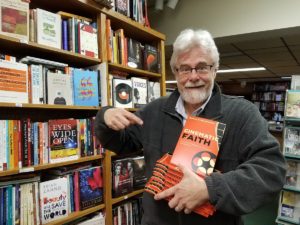 In this week’s BookNotes I will review a new book that we think is very good, a lot of fun, and even, I would say, important. It’s important for ordinary folks as well as for those who study this particular field professionally. Its retro cover matches the topic: Cinematic Faith: A Christian Perspective on Movies and Meaning by Calvin College film studies professor (and excitable film buff) William D. Romanowski (Baker Academic) $22.99. Our 20% OFF ON SALE discount makes it just $18.39.
In this week’s BookNotes I will review a new book that we think is very good, a lot of fun, and even, I would say, important. It’s important for ordinary folks as well as for those who study this particular field professionally. Its retro cover matches the topic: Cinematic Faith: A Christian Perspective on Movies and Meaning by Calvin College film studies professor (and excitable film buff) William D. Romanowski (Baker Academic) $22.99. Our 20% OFF ON SALE discount makes it just $18.39.
There are a plenty of things I want to tell you about this interesting new book but I’d like you to indulge me a bit with a bunch of other comments first.
You can just jump right to it by scrolling down to the review itself if you’d rather. You can even just skip to the bottom and easily click on the “order here” tab at end of this column to be taken to our secure order form page if you just want to order it now. We’re ready to send ‘em out.
But first, this.
WE’VE BEEN ON THE ROAD AT SEVERAL CHURCH-RELATED EVENTS
We’ve been on the road a lot this season and we want to thank those who hosted us at big gigs across the mid-Atlantic. Our on-line/mail order business friends say they enjoy hearing about our escapades here and there, so I want to ruminate just a bit on selling books at church events.
I have a particular observation that might sting just a little, but I’m surely not intending to diss our good friends in Lutheran, UCC, Episcopal and Presbyterian (USA) circles; we love doing this off site gigs. My observation will be a segue to telling you more about Dr. Romanowski’s great new book about the movies.
We are tired but yet exhilarated by our work at this recent string of clergy and church events. We loudly thank all those who helped us lug and unload or lug and reload our vans in recent weeks. We couldn’t do this work without the help of friends with strong backs. Thanks to friends old and new.
Over just the last few weeks we’ve gotten to set up big book displays for several great church events. We’ve put miles on the vans and lugged boards and shelves and supplies and boxes and boxes (and more boxes) of books to an Episcopalian retreat with The Rev. Fleming Rutledge (a hero of ours – you should read her many books! Her most significant work is The Crucifixion: Understanding the Death of Jesus Christ although, The Battle for Middle Earth, her 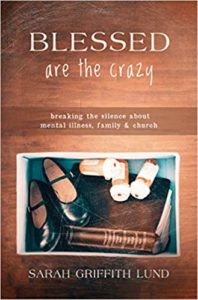
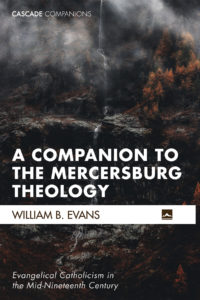 major work on Tolkien’s “divine design” is majestic) to a church education conference with PC(USA) Presbyterian congregational educators, to a UCC clergy convocation (with Sarah Griffith Lund leading as a vibrant speaker whose book Blessed Are the Crazy: Breaking the Silence about Mental Illness, Family and Church explores hard mental health issues in typical churches), to a small academic theology conference about Mercersburg Theology (where we launched a brand new and quite lovely introduction to that 19th century movement by Erskine professor William Evans called A Companion to the Mercersburg Theology in the “Cascade Companions series) to a large central Pennsylvania ELCA Synod Gathering where they re-
major work on Tolkien’s “divine design” is majestic) to a church education conference with PC(USA) Presbyterian congregational educators, to a UCC clergy convocation (with Sarah Griffith Lund leading as a vibrant speaker whose book Blessed Are the Crazy: Breaking the Silence about Mental Illness, Family and Church explores hard mental health issues in typical churches), to a small academic theology conference about Mercersburg Theology (where we launched a brand new and quite lovely introduction to that 19th century movement by Erskine professor William Evans called A Companion to the Mercersburg Theology in the “Cascade Companions series) to a large central Pennsylvania ELCA Synod Gathering where they re-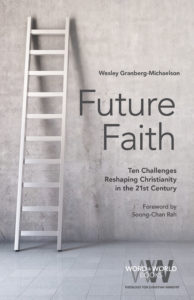 elected their current very good Bishop.
elected their current very good Bishop.
We are glad to report that our biggest seller at that big gig was the most recent book by our friend Wes Granberg-Michaelson called Future Faith: Ten Challenges Reshaping Christianity in the 21st Cenutury (Fortress; $18.99.) Thanks to Bishop James Dunlap from teaching from it.
We often smile about and enjoy the theological diversity in these groups; around the spacious book displays we discuss the theological wisdom of popular authors like Richard Rohr or Diana Butler Bass or Tom Wright or Barbara Brown Taylor and debate the usefulness of words like evangelical or progressive, liturgical or Reformed. I often (unsuccessfully, I might add) try to sell them books like Evangelical, Sacramental, Pentecostal: Why the Church Should Be All Three by Gordon Smith (IVP; $18.00) or Rich Mouw’s wonderful Restless Faith: Holding Evangelical Beliefs in a World of Contested Labels (Brazos Press; $19.99.) I always takes books about ecumenicity and Christian unity such as Costly Love: The Way to True Unity for All the Followers of Jesus by John Armstrong (New City Press; $15.95.)
With these folks we celebrate their vibrant churches and share the anxiety about the numerical and financial decline of mainline congregations. We delight in the vision and energy of young, creative (and often quite theologically aware) clergy and mourn the loss of aging pastors that we’ve known for years who are no longer in ministry. We are glad when we hear about how the gospel is being proclaimed and people being served in and through congregations large and small, in cities and towns and rural areas. What a privilege!
 We are told over and over that our books make a difference, that our presence matters at these denominational events. Historically, mom and pop Christian bookstores have been part often simplistic pietistic and fundamentalist traditions and have sometimes not been very serious-minded about theology; they have often eschewed working with mainline congregations. When large evangelical chains won’t even carry certain Bible translations or the work of certain publishers, there is good reason for animosity towards Christian booksellers among mainline Protestants and Roman Catholics. We have been graced by those in mainline circles who have welcomed us, knowing that we are a mom and pop, small town, Christian bookstore whose most core convictions remain orthodox. And we are grateful for
We are told over and over that our books make a difference, that our presence matters at these denominational events. Historically, mom and pop Christian bookstores have been part often simplistic pietistic and fundamentalist traditions and have sometimes not been very serious-minded about theology; they have often eschewed working with mainline congregations. When large evangelical chains won’t even carry certain Bible translations or the work of certain publishers, there is good reason for animosity towards Christian booksellers among mainline Protestants and Roman Catholics. We have been graced by those in mainline circles who have welcomed us, knowing that we are a mom and pop, small town, Christian bookstore whose most core convictions remain orthodox. And we are grateful for  those who have trusted us.
those who have trusted us.
We do have good resources for local congregations seeking congregational revitalization, for those doing strategic planning, missional discernment, for those starting spiritual formation groups, revisiting mission statements, searching for a pastor and the like. Whether you want to explore more creative worship planning or are doing appreciative inquiry, or are hoping to move your congregation towards social justice advocacy, we have books to suggest. We have oodles of books on congregational stewardship, on church conflict, on pastoral integrity, 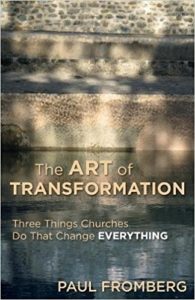
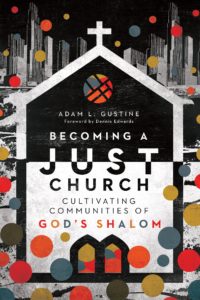
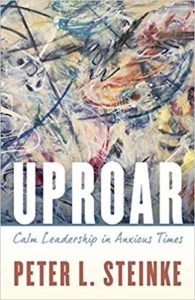 on leadership development, youth ministry, and Christian education. Some rather evangelical books can be wisely used by mainline folks and we have tons of books from more liturgical, mainline traditions. We take books like The Art of Transformation: Three Things Churches Do That Change Everything by Paul Fromberg, one of the priests at St. Gregory of Nyssa (Church Publishing; $18.95) or Becoming a Just Church: Cultivating Communities of God’s Shalom by Adam Gustine (IVP; $17.00.) or the new one by the remarkable Peter Steinke, Uproar:Calm Leadership in Anxious Times (Rowman & Littlefield; $19.95) and dozens and dozens more.
on leadership development, youth ministry, and Christian education. Some rather evangelical books can be wisely used by mainline folks and we have tons of books from more liturgical, mainline traditions. We take books like The Art of Transformation: Three Things Churches Do That Change Everything by Paul Fromberg, one of the priests at St. Gregory of Nyssa (Church Publishing; $18.95) or Becoming a Just Church: Cultivating Communities of God’s Shalom by Adam Gustine (IVP; $17.00.) or the new one by the remarkable Peter Steinke, Uproar:Calm Leadership in Anxious Times (Rowman & Littlefield; $19.95) and dozens and dozens more.
Many folks at these mainline denominational events, clergy and congregants alike, it seems are not very aware of the often very thoughtful resources that are out there. From Eerdmans to IVP, from the defunct Alban Institute (whose books are still available!) to broad-minded evangelical presses like Zondervan and Baker, there are tons of resources for congregational health. I wish more church leaders – elders, vestry members, council members, deacons, vicars, and the like – reached out to us and sought out resources to help them with their vows of service to the local church. There’s literally something for everyone. We can help.
A CURIOUS THING WE OFTEN HEAR FROM FOLKS AT THESE EVENTS
But here is what we often notice – and this is the long-in-coming segue to my book review this week: people especially love the books that we bring that are a bit surprising, books that are not about the church, but about the arts or science, creation-care or nurturing a sense of vocation that allows people to serve God in the work-world. One doesn’t need to read 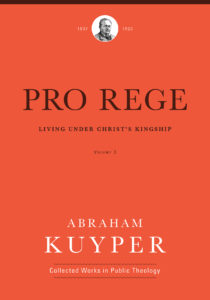 Abraham Kuyper who used that great phrase about Christ being Lord of “every square inch” of His creation to understand that God cares about more than our churches. (Although it wouldn’t hurt to get it from the proverbial horses mouth – the third Pro Rege: Living Under Christ’s Kingship volume in the massive Kuyper translation project was just released (Lexham Press; $49.99) offering remarkable insight about cultural engagement from the early 20th century Dutch theologian and statesman.)
Abraham Kuyper who used that great phrase about Christ being Lord of “every square inch” of His creation to understand that God cares about more than our churches. (Although it wouldn’t hurt to get it from the proverbial horses mouth – the third Pro Rege: Living Under Christ’s Kingship volume in the massive Kuyper translation project was just released (Lexham Press; $49.99) offering remarkable insight about cultural engagement from the early 20th century Dutch theologian and statesman.)
People seemed surprised so see that we feature books that remind us that God cares about Monday as much as Sunday. That all of us who follow Jesus are called to obey God by helping serve the common good. That this somehow means being in but not of the world, in civil society, the arts, education, recreation, politics, and more.
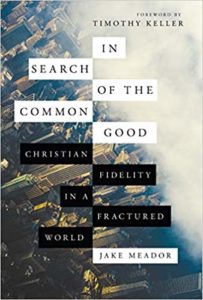 (Do please read last week’s BookNotes review of Jake Meador’s new book In Search of the Common Good: Christian Fidelity in a Fractured World and note the great chapters about how simple practices of going to church can help equip us to become better civic-minded public servants and good neighbors. As I explained, his study of culture is astute and his call to be active in the local church is so helpful, even though it’s a book about repairing society, healing the world, and seeking the common good.)
(Do please read last week’s BookNotes review of Jake Meador’s new book In Search of the Common Good: Christian Fidelity in a Fractured World and note the great chapters about how simple practices of going to church can help equip us to become better civic-minded public servants and good neighbors. As I explained, his study of culture is astute and his call to be active in the local church is so helpful, even though it’s a book about repairing society, healing the world, and seeking the common good.)
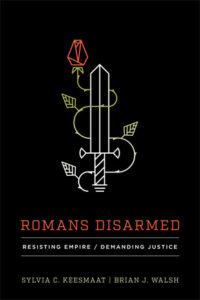 (And then back up and read my big review Romans Disarmed and Walsh & Keesmaat’s radical call to be a subversive community that stands with the hurting, even in an age of imperial injustice. There’s so much to be found in their amazing book Romans Disarmed: Resisting Empire/Demanding Justice and even my wordy review doesn’t tell it all. Both books show that a Biblically-grounded sort of socially engaged gospel depends upon a quality of congregational life that nurtures a lifestyle of stewardship, compassion, and activism.)
(And then back up and read my big review Romans Disarmed and Walsh & Keesmaat’s radical call to be a subversive community that stands with the hurting, even in an age of imperial injustice. There’s so much to be found in their amazing book Romans Disarmed: Resisting Empire/Demanding Justice and even my wordy review doesn’t tell it all. Both books show that a Biblically-grounded sort of socially engaged gospel depends upon a quality of congregational life that nurtures a lifestyle of stewardship, compassion, and activism.)
As much as mainline church seminary profs like to dabble in edgy and often eccentric theologies that are supposed to be empowering and relevant, most mainline churches are way behind the best evangelicals in fostering conversations around the intersection of faith and science, art, business, work, even racial reconciliation. Few mainline churches (judging from what we hear at these events, at least) are doing much in their churches about relating faith to stuff other than churchy or missionary things. When at mainline denominational events for church folk we display books about art or culture or work or science, there is almost always a bit of surprise. Folks are overjoyed to see Madeline L’Engle’s Walking on Water: Reflections on Faith and Art or The Language of God and Science by pioneering researcher of the human genome, Francis Collins or Josh Larsen’s excellent Movies Are Prayers: How Films Voice our Deepest Longings but you can tell that many have never seen books like that before. People do a double take when they see books about the doctrine of vocation, or books like Os Guinness’s The Call next to books about work and the marketplace. They seem to think that sensing God’s call only means being called to church life or religious things.(Curiously, in many more traditionally evangelical events, it is almost expected that we’ll have books on work and race and art and technology and civic life.) In our recent string of events everybody was delighted when they saw that we had, say, Wendell Berry’s agrarian books or David Brooks’ social criticism or Makoto Fujimura’s artful study of Endo’s novel Silence (in Mako’s wonderful Silence and Beauty: Hidden Faith Born of Suffering) or Sherry Turkle’s critique of digital culture or Andy Crouch’s wonderful Tech-Wise Family or Robert Capon’s “culinary reflection” Supper of the Lamb or books about sports and recreation. But mainline denominational folks tend not to buy them. They notice — books about faith and food, faith and popular music, books about hiking? But it seems surprising to them. And the pastors, usually, skip right over those things as if faithful reflection about real life doesn’t interest them much.
I don’t know if the surprise is that evangelical booksellers like us are savvy about life in the real world (do they think I’m a little hobbit sitting in a cave reading theology all day?) or that there even is such a thing as a Christian perspective on seemingly secular things like advertising or sports or neuroscience or work or film. This observation vexes me a bit.
BEING ECUMENICAL, YES
Almost everywhere we go we like to display books that honor our deep commitment to ecumenicity. As a matter of principle we like to offer both evangelical and progressive stuff; we always have Roman Catholic authors mixed in with Protestant books. We carry Chesterton and Nouwen and Alexander Schmemmann; Joan Chittister, John Stott and Walter Brueggemann; we feature Bible books by the late Rachel Held Evans and conservatively Reformed Bible teacher Nancy Guthrie. We have books on sexuality by Wes Hill and Matthew Vine and Austen Hartke side by side. Mainline folks rarely buy C.S. Lewis, but we take his stuff and put him near Rowan Williams and Marcus Borg. Maybe it was only to amuse myself, but in a recent display I put John Piper’s little Why I Love the Apostle Paul: 30 Reasons next to our stack of Romans Disarmed: Resisting Empire/Demanding Justice.
But being ecumenical is only one of our passions.
A BROAD VISION OF THE WIDE SCOPE OF REDEMPTION
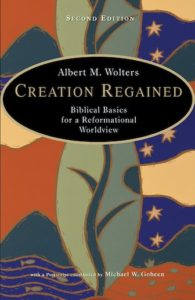
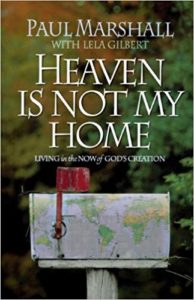 As you can guess, we are passionate about this wholistic vision – learned mostly from the likes of Francis Schaeffer and Abraham Kuyper and in books like Creation Regained: Biblical Basis for a Reformational Worldview by Al Wolters and Heaven Is Not My Home: Living in the Now of God’s Creation by Paul Marshall and Engaging God’s World: A Christian Vision of Faith, Learning, and Living by Cornelius Plantinga – about how we can find God in the ordinary stuff of life and how we are called by God to be faithfully attentive about how to think and live in all spheres of life; no arena of culture or aspect of society or corner of your life is off limits to the saving power of Christ and the renewing power of the Spirit. It hardly needs saying – but yet, in religious circles, it does – life in God’s creation is multi-dimensional. We think and feel, work and play, vote and shop. Theorists of all sorts get at this when they talk about two hemispheres of the brain or when educators talk about multiple intelligences or even when we hear about personality types (like with the recent interest in the Enneagram. As multi-faceted people made in God’s image, we are more than bodies and souls. Which is why the church must proclaim a big gospel of all sides of life and why faith-based booksellers must carry resources for living in every sector of life and culture.
As you can guess, we are passionate about this wholistic vision – learned mostly from the likes of Francis Schaeffer and Abraham Kuyper and in books like Creation Regained: Biblical Basis for a Reformational Worldview by Al Wolters and Heaven Is Not My Home: Living in the Now of God’s Creation by Paul Marshall and Engaging God’s World: A Christian Vision of Faith, Learning, and Living by Cornelius Plantinga – about how we can find God in the ordinary stuff of life and how we are called by God to be faithfully attentive about how to think and live in all spheres of life; no arena of culture or aspect of society or corner of your life is off limits to the saving power of Christ and the renewing power of the Spirit. It hardly needs saying – but yet, in religious circles, it does – life in God’s creation is multi-dimensional. We think and feel, work and play, vote and shop. Theorists of all sorts get at this when they talk about two hemispheres of the brain or when educators talk about multiple intelligences or even when we hear about personality types (like with the recent interest in the Enneagram. As multi-faceted people made in God’s image, we are more than bodies and souls. Which is why the church must proclaim a big gospel of all sides of life and why faith-based booksellers must carry resources for living in every sector of life and culture.
We are not just “brains on a stick” to use Jamie Smith’s colorful phrase or disembodied souls, like some mystics imply. From sex to science, from law to leisure, God’s creation is the “theatre of God” (to quote John Calvin) so all human endeavor is irreducibly religious. That is, all of life is lived – like it or not – corem deo; before God. We are in God’s world, living before the gracious Holy One, 24/7. As one recent book title by an Anglican leader, Win Mott, puts it, The Earth Is the Lords: There Is No Secular. We may live in a cultural era which is called “the secular age” but that is about the ethos of our time. We can live as if there is no God and our our cultural landscape can be arranged without reference to Christ’s reign, but we our hearts are still committed to some story, something religion-like. What we really trust can be misguided and our religion can be an idolatrous one, making an idol of our sense of self or some other ideology, but worship we do.
From a Christian perspective, all of life is at once good and bad; blessed, cursed, damaged, and being redeemed and healed by the resurrection power of the Ascended King. We can serve that God of the Bible with all we’ve got or we can allow our hearts desires to move us in another direction with all we’ve got. It’s really pretty simple: as that old hymn puts it, “This Is Our Father’s World” and (as Richard Mouw unpacks in a book title taken from that same hymn) “He shines in all that’s fair.” God is pleased when we do what the Apostle says in 1 Corinthians 10:31: “Whether you eat or drink, do all to the glory of God.”
So folks walk into the book room at a conference or, more so, into our Dallastown bricks and mortar store, and see books on Van Gogh and cooking and nursing and engineering – books written often by wise authors calling for reform in the profession or industry — and if they look carefully they will realize that the authors may be people of deep Biblical faith, writing some of these books, integrating, if you will, their Sunday beliefs and their Monday world. From school  teaching to lawyering, from math to aesthetics, from farming to journalism, there are Christian authors offering up their workspaces as holy ground, as mission fields. There are people that get what my friend John Van Sloten says in his clever book title (and very excellent book) Every Job a Parable: What Walmart Greet, Nurses and Astronauts Tell us About God. Such folks may not be church leaders but they are trying to be salt and light, leaven in the loaf, blooming right where they are planted in the factory floor or work cubicle or sculpting studio or kindergarten classroom.
teaching to lawyering, from math to aesthetics, from farming to journalism, there are Christian authors offering up their workspaces as holy ground, as mission fields. There are people that get what my friend John Van Sloten says in his clever book title (and very excellent book) Every Job a Parable: What Walmart Greet, Nurses and Astronauts Tell us About God. Such folks may not be church leaders but they are trying to be salt and light, leaven in the loaf, blooming right where they are planted in the factory floor or work cubicle or sculpting studio or kindergarten classroom.
It is why we often recommend the great collection of Christian graduation speeches about taking up our 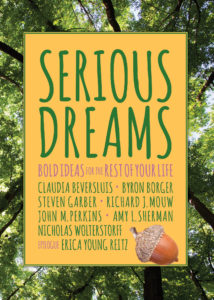 callings to serve God in professions and careers that I compiled, Serious Dreams: Bold Ideas for the Rest of Your Life (Square Halo Books; $13.99) and why I’m sad when people think that even young adults wouldn’t be interesting in such a thing. It is unfortunate, I think, of how few churches honor their college grads. Maybe if we all read Serious Dreams it might help.
callings to serve God in professions and careers that I compiled, Serious Dreams: Bold Ideas for the Rest of Your Life (Square Halo Books; $13.99) and why I’m sad when people think that even young adults wouldn’t be interesting in such a thing. It is unfortunate, I think, of how few churches honor their college grads. Maybe if we all read Serious Dreams it might help.
One would think one would be delighted to see books about real life in the real world that might make you say, and mean it, “Thank God It’s Monday!” But, as I say, people smile and seem surprised, and maybe a tad confused.
I GIVE THIS SPIEL BECAUSE OFTEN PEOPLE ARE SURPRISED
I give this little spiel often at our book display at conferences. It seems that I have to explain these kinds of books to most church folks at a church conference when they see – often with delight – that we’ve got books like Watching TV Religiously or Game Day for the Glory of God: A Guide for Athletes, Fans, & Wannabes or Craig Detweiler’s iGods: How Technology Shapes our Spiritual or Social Lives or Robert Benson’s spiritual meditation on his backyard called Digging In or that great Square Halo Book release edited by Gregory Thornbury on Doctor Who, Bigger on the Inside: Christianity and Doctor Who. If they look at the table of contents, we are sure to have a little conversation about something in Steve Turner’s book Popcultured: Thinking Christianly About Style, Media and Entertainment. Who knew there were Christian insights about fashion and video games and comedy?
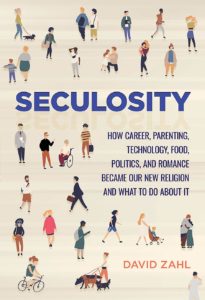 I was dismayed that a book that is getting rave reviews in places like Christianity Today called Seculosity: How Career, Parenting, Technology, Food, Politics, and Romance Became Our New Religion and What to Do about It by Dave Zahl didn’t sell at our recent mainline gigs, even though Fleming Rutledge (an Episcopalian) had a great blurb on the back, and it is published by the ELCA-related Fortress Press. It is an interesting, playful, grace-filled, feisty study of our culture – the sort of things he does at his exceptional website and podcast Mockingbird.
I was dismayed that a book that is getting rave reviews in places like Christianity Today called Seculosity: How Career, Parenting, Technology, Food, Politics, and Romance Became Our New Religion and What to Do about It by Dave Zahl didn’t sell at our recent mainline gigs, even though Fleming Rutledge (an Episcopalian) had a great blurb on the back, and it is published by the ELCA-related Fortress Press. It is an interesting, playful, grace-filled, feisty study of our culture – the sort of things he does at his exceptional website and podcast Mockingbird.
Maybe people are surprised to see these kinds of books because their pastors don’t talk about all this; their adult ed forums during the education hour at church don’t tackle these sorts of things in principled ways. Or maybe it is because (at least the last time I formally investigated this, admittedly years ago) there simply weren’t many Christian bookstores that stocked faith-based books about helping us be whole-life disciples across the whole of life and culture. For a few years I’d call the new winner of the “Best Christian Bookstore” award and ask if they had books on, say, art, or if they had a political science department, or any books about urban planning. Or even books about racial reconciliation. Often the clerk was baffled. We’re a Christian bookstore one dear frontline staffer replied, as if that settled things. Of course God Almighty doesn’t care about art or science or public policy. And these are the best CBA stores!
EYES WIDE OPEN
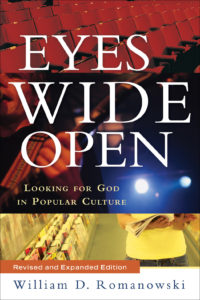 One book we always take out with us to events is Eyes Wide Open: Looking for God in Popular Culture (Brazos Press; $24.00.) It is a personal favorite written by an old college pal, author of the brand new Cinematic Faith, William D. Romanowski. Decades ago in those critical years, under the influence of older mentors in the CCO, we talked about this “all of life redeemed” vision, learned the deeper meaning of worldviews and social imaginaries as we read Dutch philosophers and colorful Christian thinkers like Bible scholar, art historian, and aesthetician, Calvin Seerveld. Bill nearly memorized most of Cal’s seminal Rainbows for the Fallen World (Toronto Tuppence Press; $35.00) and to this day laughs about helping scholarly, artful Cal learn a bit about popular entertainments. Soon, Bill felt the call to do PhD work in the study of popular culture; these were the days when MTV was a new thing, when film was starting to use rock music in soundtracks (the topic, in fact, of his first co-authored book.) He prepared to make a contribution to the burgeoning field of pop culture studies by getting his PhD at Bowling Green (then the epicenter of much of this academic study, using a bit of critical theory and other new ways to discern what is really going on in popular entertainment and cultural proclivities and social practices. His Pop
One book we always take out with us to events is Eyes Wide Open: Looking for God in Popular Culture (Brazos Press; $24.00.) It is a personal favorite written by an old college pal, author of the brand new Cinematic Faith, William D. Romanowski. Decades ago in those critical years, under the influence of older mentors in the CCO, we talked about this “all of life redeemed” vision, learned the deeper meaning of worldviews and social imaginaries as we read Dutch philosophers and colorful Christian thinkers like Bible scholar, art historian, and aesthetician, Calvin Seerveld. Bill nearly memorized most of Cal’s seminal Rainbows for the Fallen World (Toronto Tuppence Press; $35.00) and to this day laughs about helping scholarly, artful Cal learn a bit about popular entertainments. Soon, Bill felt the call to do PhD work in the study of popular culture; these were the days when MTV was a new thing, when film was starting to use rock music in soundtracks (the topic, in fact, of his first co-authored book.) He prepared to make a contribution to the burgeoning field of pop culture studies by getting his PhD at Bowling Green (then the epicenter of much of this academic study, using a bit of critical theory and other new ways to discern what is really going on in popular entertainment and cultural proclivities and social practices. His Pop 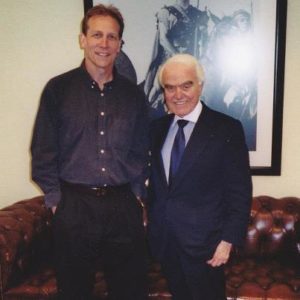 Culture Wars: Religion & the Role of Entertainment in American Life (Wipf & Stock; $45.00) remains a major work – critiquing, by the way, the very way we assume that there is a difference between high art (that we should study and learn from) and low art, or pop culture (which, well, is just amusement, after all, or so many assume.) That the original cover had a picture of Rocky Balboa and William Shakespeare and Bruce Cockburn made a nice point. Bill was a lit major in college, was a performing artist himself, had worked in campus ministry with emerging adults (through the CCO) and soon became perhaps the leading voice in the early 1990s discussions about evangelical faith and popular culture. He was speaking widely and doing research and meeting important voices in the entertainment industry. (The picture above, by the way, is with the legendary Jack Valenti, the late President of the Motion Picture Association — you know, the institution that runs the Academy Awards and gives out the Oscars.
Culture Wars: Religion & the Role of Entertainment in American Life (Wipf & Stock; $45.00) remains a major work – critiquing, by the way, the very way we assume that there is a difference between high art (that we should study and learn from) and low art, or pop culture (which, well, is just amusement, after all, or so many assume.) That the original cover had a picture of Rocky Balboa and William Shakespeare and Bruce Cockburn made a nice point. Bill was a lit major in college, was a performing artist himself, had worked in campus ministry with emerging adults (through the CCO) and soon became perhaps the leading voice in the early 1990s discussions about evangelical faith and popular culture. He was speaking widely and doing research and meeting important voices in the entertainment industry. (The picture above, by the way, is with the legendary Jack Valenti, the late President of the Motion Picture Association — you know, the institution that runs the Academy Awards and gives out the Oscars.
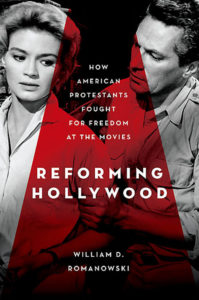 As you may recall from our BookNotes review, in 2012 he released a major scholarly work, published by Oxford University Press entitled Reforming Hollywood: How American Protestants Fought for Freedom at the Movies. It remains a standard study in the history of film, and especially Protestant engagement, about which little has been written. Romanowski had remarkable access to important archives and did interview with older Hollywood producers, including some ground breaking research into the role religion or didn’t play in the formation of the now famous MPAA rating system.
As you may recall from our BookNotes review, in 2012 he released a major scholarly work, published by Oxford University Press entitled Reforming Hollywood: How American Protestants Fought for Freedom at the Movies. It remains a standard study in the history of film, and especially Protestant engagement, about which little has been written. Romanowski had remarkable access to important archives and did interview with older Hollywood producers, including some ground breaking research into the role religion or didn’t play in the formation of the now famous MPAA rating system.
LOOKING FOR GOD IN POPULAR CULTURE
Eyes Wide Open: Looking for God in Popular Culture (in an expanded second edition) was his first popular level book and it became a perennial best seller. It is still one of the very best books to offer a broad and thoughtful Christian worldview as a lens to help us be faithful and discerning in engaging modern entertainment. From video games to televised sports, from advertising to rock shows, Eyes Wide Open helps us understand how pop culture works, how it both reflects the dominant culture’s values and shapes them. And how it can – from varying viewpoints and perspectives – help us criticize and even be motivated to reform society. (Erin Brockovich, anyone? The Big Short? Dallas Buyers Club? Selma?)
Anyway, Eyes Wide Open is a fine and thoughtful book, only a bit dated, now, and still my favorite resource for thinking in foundational ways about the joys and challenges of watching movies and listening to music and such. If you don’t have it, you should. If you were with us at any of the aforementioned church conferences you probably saw it. Maybe you were intrigued. I know we didn’t sell any.
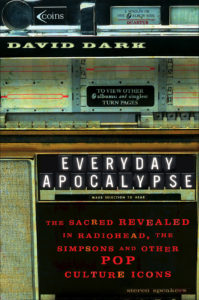 (By the way, another vital favorite, which we also take everywhere we go – with a more allusive writing style, and a bit more punchy evaluation of important popular culture works – is David Dark’s amazing Everyday Apocalypse: The Sacred Revealed in Radiohead, The Simpsons, and Other Pop Culture Icons (Brazos Press; $20.00.) Don’t you love the cool, old-school juke box on the cover design?
(By the way, another vital favorite, which we also take everywhere we go – with a more allusive writing style, and a bit more punchy evaluation of important popular culture works – is David Dark’s amazing Everyday Apocalypse: The Sacred Revealed in Radiohead, The Simpsons, and Other Pop Culture Icons (Brazos Press; $20.00.) Don’t you love the cool, old-school juke box on the cover design?
David is the one who wrote The Possibility of America: How the Gospel Can Mend our God-Blessed, God-Forsaken Land that I reviewed at length at BookNotes a month or so ago. Why are some folks surprised that a Christian bookstore stocks and promotes these kinds of books?
And can you help us fix this problem by promoting in your circles books about culture, the arts, society, science, work, citizenship, play, education, health care technology, food, farming and more?
Maybe, at least, you could invite them to subscribe to our free BookNotes so they learn about these kinds of books… we’d appreciate it and it would serve to advance the cause of thoughtful Christian literature.
ANNOUNCING: CINEMATIC FAITH A CHRISTIAN PERSPECTIVE ON MOVIES AND MEANING
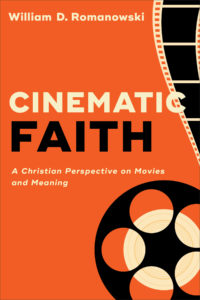 Years in the making, we are very, very glad to get to announce a brand new book by professor Romanowski. As we’ve said, it’s called Cinematic Faith: A Christian Perspective on Movies and Meaning (Baker Academic; $22.99 – OUR SALE PRICE = $18.39) and I’m reading through it happily for the second time. For anyone who likes going to the movies or can’t wait for the next NetFlex DVD to show up (please don’t tell me you watch films on your little phone!) this big book will be an education and a joy. It isn’t preachy and it isn’t simplistic but it isn’t overly academic. If you love movies, you need this book.
Years in the making, we are very, very glad to get to announce a brand new book by professor Romanowski. As we’ve said, it’s called Cinematic Faith: A Christian Perspective on Movies and Meaning (Baker Academic; $22.99 – OUR SALE PRICE = $18.39) and I’m reading through it happily for the second time. For anyone who likes going to the movies or can’t wait for the next NetFlex DVD to show up (please don’t tell me you watch films on your little phone!) this big book will be an education and a joy. It isn’t preachy and it isn’t simplistic but it isn’t overly academic. If you love movies, you need this book.
READING DOESN’T HINDER OUR PLEASURE
Let me get this off my chest right away: reading books about various aspects of our Christian discipleship — work, play, voting, shopping, being a parent, being a choir member, considering schooling or health care or gardening, or vacationing, watching movies, whatever – isn’t going to dull our enjoyment of these good spaces where we live out our lives.
No! Unlike the beloved but confused chorus that says when we turn our eyes to Jesus “the things of earth will grow strangely dim,” the Bible says the opposite: Jesus is the Light of the world. In Him we are given light to see (the Bible is, after all, a light before our path!) So knowing God more deeply and deepening our faith and catching a vision of how it connects to various spheres of society and sides of life allows Christ to shine in all of life – we don’t want our marriages or work or our voting or our church life or our entertainment life to grow dim. We are to let our light shine! John 10:10 promises an abundant life, not a dim life.
READING ENHANCES OUR FAITHFUL ENJOYMENT
However, to really shine, to see God’s common grace in ordinary things, knowing something about those ordinary things is essential. Our enjoyment of making and eating good food is enhanced when we read a thoughtful cookbook! Our enjoyment of sports is better when we know some of the nuances of the game. We can even enjoy politics (Lord help us) when we know something about what we’re voting on and why we get passionate about it. Dare I say that some of us might enjoy sex a bit more if we read a book or two about Godly married life. Reading rock criticism or film studies or a book about the nature of digital culture and the like allows us do what the Bible says: attend to and listen to God’s will revealed in reality. (Psalm 19 says the heavens speak to us; Job says to “listen to the fish” and Isaiah 28 compliments a farmer for learning the science of soil and seed. This is basic to life: wisdom and joy come from knowing where we are and learning something about what we’re doing — whatever it may be. Systematic theology and inner spiritual formation and hearty worship cannot replace the need to pay attention to what Matthew Crawford calls “the world outside your head.” Biblical wisdom always is down-to-Earth, often quite literally. Reading and study is necessary and it can truly help us life in fidelity to God’s good ways. It’s as simple as that.
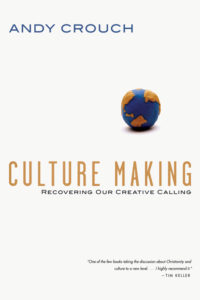 Books help us see and appreciate and develop the creation God has given us. To use the language of Andy Crouch’s essential text, we become Culture Makers who “recovery our creative calling” and can then, as Romanowski puts it, “find God in popular culture.” (By the way, we take Crouch’s Culture Making everywhere we go, too – it’s such a very, very helpful book to help us find meaning and purpose in our day to day lives.)
Books help us see and appreciate and develop the creation God has given us. To use the language of Andy Crouch’s essential text, we become Culture Makers who “recovery our creative calling” and can then, as Romanowski puts it, “find God in popular culture.” (By the way, we take Crouch’s Culture Making everywhere we go, too – it’s such a very, very helpful book to help us find meaning and purpose in our day to day lives.)
Who doesn’t want to understand what it means that we are made in God’s image and therefore called to be creative, involved in culture? Who doesn’t long for more God sightings in daily life? Who doesn’t want all of life to be worship – including, in this case, taking in goofball comedies, romance flicks, or action adventure films? Books like this will help you have more fun at the movies. And, trust me on this: Bill has very eclectic tastes and has a lot of fun at the movies.
(A fun little fact: Bill was led to Christian faith and discipled mostly by a guy who became not only a mentor but one of his life-long best friends. This guy, Dr. Terry Thomas of Geneva College, was himself raised working in a Pittsburgh-area movie theatre that his father managed. Nobody has more fun at the movies than Terry, who Bill mentions in his book. Terry’s love of film, including comedy, is infectious, and Bill learned well.)
MOVIE MUSINGS
One of the great delights of Cinematic Faith are a handful of (sometimes lengthy) “Movie Musing” sidebars where to illustrate his point in a given chapter, Romanowski explores some detail or theme in popular films.
From the “married life” sequence in Up to looking at “Dramatizing Drone Warfare in Eye in the Sky” to a brilliant analysis of history in the movie Lincoln to a fun interpretation of “time loop fiction” by way of a study of (what else?) Groundhog Day to one called “Boy Meets Girl in La La Land” these are all fascinating (even if you haven’t seen the film under consideration.)
Bill has spent considerable scholarly energy studying melodrama (and, for example, Titanic) and he loves Rocky (which, in a “Movie Musing” he calls “A Classical Hollywood Film.”) He offers musings on Blade Runner and The Imitation Game as metaphors, “art and ethics” in  Rear Window, and a great piece called “Narrative, Character and Perspective in The Blind Side” – you’ve got to read that if you enjoyed this movie as much as we have. Through all of these excursions, you can tell that his tastes are not overly high-brow. (Remember his central thesis of Pop Culture Wars that all film and pop artifacts are religiously/philosophically laden and artfully serious, and his central thesis of Eyes Wide Open
Rear Window, and a great piece called “Narrative, Character and Perspective in The Blind Side” – you’ve got to read that if you enjoyed this movie as much as we have. Through all of these excursions, you can tell that his tastes are not overly high-brow. (Remember his central thesis of Pop Culture Wars that all film and pop artifacts are religiously/philosophically laden and artfully serious, and his central thesis of Eyes Wide Open  that we can find signs of life and Godly insight from even pagan popular culture.) Cinematic Faith is hoping to enhance your viewing experiences and help you get more out of your entertainment dollar, not bore you with academic discourse or shame you for enjoying the movies you enjoy. Please know, this isn’t highbrow scholarly theory for snooty cineastes but a thoughtful tool for all of us, whether you like The Kings Speech or the X-Men series or Marvel’s Captain America: Civil War.
that we can find signs of life and Godly insight from even pagan popular culture.) Cinematic Faith is hoping to enhance your viewing experiences and help you get more out of your entertainment dollar, not bore you with academic discourse or shame you for enjoying the movies you enjoy. Please know, this isn’t highbrow scholarly theory for snooty cineastes but a thoughtful tool for all of us, whether you like The Kings Speech or the X-Men series or Marvel’s Captain America: Civil War.
READING WIDELY, VIEWING WIDELY
We loved, by the way, having literary scholar and teacher Karen Swallow Prior in our store last fall helping launch her marvelous book about virtue and literature On Reading Well: Finding the Good Life Through Great Books. She started her talk, as she does in the book, with the advice of old John Milton, who advised that we “read promiscuously.” The word didn’t have quite the immoral overtones in his 1600s that it does nowadays, but even then, the advice struck some as dangerous. Like Prior and her love of a wide range of reading, Romanowski is convinced that watching a lot of movies of different sorts is a good thing. Unlike literature, where reading widely is mostly admired, though, we tend to dismiss a thoughtful, spiritually aware engagement with our popular amusements.
Some think we shouldn’t watch many movies at all and others think it’s all fine, but don’t want to think about it much — who wants to think much, after all, let alone about God’s Kingdom or our moral formation, when we’re vegging out? Anyway, what’s the point of entertainment, after all?
TO ENTERTAIN OR ENLIGHTEN?
Romanowski addresses this a bit in a section called “To Entertain or Enlighten: That Is the Question.” You’ll have to read his answer, but, again: nothing is secular, so we are always being formed, one way or the other, and all moments in life can be avenues for construing meaning and growing as a person made in God’s likeness. Of course, we don’t have to have a steady diet of Schindler’s List and socially conscious documentaries. Remember, the first “Movie Musing” in this book is on Groundhog Day. And did I mention he likes Rocky?
So. What makes Cinematic Faith an important book, besides being a bit of a sequel to the important and popular Eyes Wide Open? We have literally a dozen recent books on faith and film that have come out in recent years. A genre that was once rather provocative and cutting edge has, it seems to me, become almost commonplace. And we don’t sell them as much as we used to.
Movies and digital entertainment (here in a new golden age of TV) are more popular than ever, taking up more of our time than ever before. (Indeed, we just got a new book by Dan Strange called Plugged In: Connecting Your Faith with Everything You Watch, Read, and Play that carries rave reviews by the likes of Bill Edgar and Tim Keller.)
Still, most Christian people, I’d guess, have never read anything about the relationship of faith and entertainment, have never studied any of the many books we stock on this. We really should, you know; like work or relationships or eating or voting, God wants us to take pleasure in this part of our discipleship, but in a fallen world, things can be distorted and depressing. We have to study up, learn more, deeper our curiosity so we can grow in to maturity in these aspects of life.
But what makes this book on film that urgent? Besides my personal loyalty to my old friend and the reputation of his well-respected work at Calvin College, why Cinematic Faith?
SEVERAL GOOD THINGS
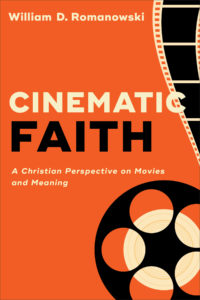 I will name several good things that make this a very important contribution, not only for anyone serious about developing a uniquely and inherently Christian way of approaching film, but for ordinary folks who enjoy a good movie night from time to time.
I will name several good things that make this a very important contribution, not only for anyone serious about developing a uniquely and inherently Christian way of approaching film, but for ordinary folks who enjoy a good movie night from time to time.
First, as I’ve already suggested, the good professor is, in fact, a good professor. He is clear and teacherly about critical approaches — theories or ways of thinking about film. He explains how different schools of thought about film can enhance our own viewing. However, again, this isn’t abstract scholarship for insiders; he specifically says that a good approach should be practical and can “provide reliable insights, and sharpen our judgments.”
He is clear and informative and this will be helpful for you. As he puts it, “appreciating what makes movies artistically interesting and effective can make us better viewers and more creative storytellers.”
So: it is practical and helpful. Who couldn’t use a bit of help in knowing better what makes a film good? With this small investment of twenty bucks and time – okay, a bit longer than it takes to watch a movie – you’ll benefit by enjoying movies more. You can even eat popcorn as you turn the pages and nobody will shush your crunching.
Secondly, Cinematic Faith: A Christian Perspective on Movies and Meaning is valuable because of the author’s main assumptions; that are potent and wise. Again, the primary framework for Romanowski’s work, as we’ve noted, is that there is an insightful, Biblically-informed way to think about film as a cultural artifact, as art. I mentioned (significantly) that he 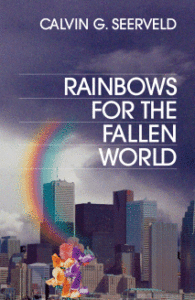 has been informed by the aesthetic theories of Calvin Seerveld (Rainbows for a Fallen World, Bearing Fresh Olive Leaves, Normative Aesthetics, Redemptive Art in Society) and more, including study and conversations with other philosophers of the arts such as philosophers such as Nicholas Wolterstorff and Lambert Zuidervaart as well as pop journalists like the great Steve Turner whose Imagine: A Vision for Christians in the Arts is a great book for anyone wanting to dip into an integrated Christian perspective on art and culture and whose Popcultured I already mentioned.) This means that Bill has worked very hard at a deep level to wonder what it means to take up theories and mindsets that inform dispositions and practices that are not only coherent and consistent from a Christian perspective but that are deeply integral. In this, he doesn’t get all preachy nor does he particularly wear his faith on his sleeve, but he is a reliable, faithful guide. Faith, in his scholarship, is not an afterthought nor is his sense of quality and value in a film based on cheap inspiration. I suppose we don’t have to say it here, but a novel or movie can tell a profoundly immoral story and be brilliantly made and wise; similarly an overtly Christian movie may have a lively religious message but be poorly made. Such films and books can even be dishonest about the way faith works in real life. Some of the most theologically sane movies have be made by deeply troubled filmmakers and some of our worst films are made by otherwise Godly people trying to use the art form for evangelistic purposes.
has been informed by the aesthetic theories of Calvin Seerveld (Rainbows for a Fallen World, Bearing Fresh Olive Leaves, Normative Aesthetics, Redemptive Art in Society) and more, including study and conversations with other philosophers of the arts such as philosophers such as Nicholas Wolterstorff and Lambert Zuidervaart as well as pop journalists like the great Steve Turner whose Imagine: A Vision for Christians in the Arts is a great book for anyone wanting to dip into an integrated Christian perspective on art and culture and whose Popcultured I already mentioned.) This means that Bill has worked very hard at a deep level to wonder what it means to take up theories and mindsets that inform dispositions and practices that are not only coherent and consistent from a Christian perspective but that are deeply integral. In this, he doesn’t get all preachy nor does he particularly wear his faith on his sleeve, but he is a reliable, faithful guide. Faith, in his scholarship, is not an afterthought nor is his sense of quality and value in a film based on cheap inspiration. I suppose we don’t have to say it here, but a novel or movie can tell a profoundly immoral story and be brilliantly made and wise; similarly an overtly Christian movie may have a lively religious message but be poorly made. Such films and books can even be dishonest about the way faith works in real life. Some of the most theologically sane movies have be made by deeply troubled filmmakers and some of our worst films are made by otherwise Godly people trying to use the art form for evangelistic purposes.
Art – visual art, multi-media art, literature or pop music – must not be propaganda. In fact, if a piece traffics in cheap clichés and/or pushy messages, it most likely isn’t very good art, which, by definition, must be allusive and imaginative. I’ve already counseled young Christian rock musicians to lay down their guitars and find a pulpit since they seem to think their calling is not to be an artist but to be a preacher. Preaching is a noble (and, at its best, also an artful) calling. But art – and in this case, movies – aren’t mere vehicles of didactic content. Art must, to cite Emily Dickinson, “tell it slant.” For a film, to work well, it must firstly be a good film; that is, good art, imaginatively telling a story.
We all know when a movie or TV show has been ham-fisted, and we feel like we’ve been manipulated or pummeled with a message. Marxists and progressives tend to do this a lot; evangelical Christians too often, too. Even if we tend to agree with the message, it hasn’t been a particularly edifying few hours of entertainment, has it? A good message is usually diluted by bad form or a propagandistic ethos. Conversely, an artistically nuanced and allusively subtle vision can be quietly powerful.
This insight – which is pretty basic, I suppose – has formed in Bill a professional passion (and, after watching a zillion films over a lifetime, a finely tuned craft) for understanding film not merely in its content, but it its style. And this is what makes Cinematic Faith a major contribution to and somewhat unique within contemporary Christian film studies.
It seems to me that most of our best Christian thinkers in film studies (many published by the same good publishing house as Cinematic Faith who over the last 15 years or so have served up a bounty of faith-based scholarship about culture and review of modern movies) have fallen somewhat for this inadequate perspective of how to evaluate film. That is, they spend a whole lot of time and effort to discern the worldviews of the filmmakers, or doing narrative criticism, exploring the story and the content and the message as if every movie has a moral. As Bill himself notes, this is natural—when telling a friend about a movie you’ve enjoyed or when considering with a date what film to see, we ask, “What’s it about?” Nobody first asks what stylistic vision the cinematographer has and to what effect their film-editor worked, as she spliced scenes with the soundtrack? But you know what? Maybe we should ask that sort of question about form and function, about aesthetics and craft. Because, after all, for a film to work it not only needs a good story but that story is told by artists with a point of view that is embodied in their craft, their form, their filmic skills.
“The critical approach presented in this book,” Romanowski writes, “is anchored in the film itself and its unique capabilities as an audiovisual medium.”
He continues:
Even professional film reviewers tend to rely on, “a heavy dose of plot synopsis,” New York Times critic Manohla Dargis concedes. They pay very little if any attention to the specifics of the medium, to how film makes meaning with images – with framing, editing, mise en scene, with the way an actor moves his body in front of the camera.”
He sets up our expectations for the book reminding us that:
This book does not propose to replace an emphasis on content with an emphasis on form but rather to treat film as both an aesthetic object and an experience – one that can be exciting, pleasurable, boring, disagreeable, or mind blowing.
This is really important stuff that I don’t see enough about in other such books.
ANOTHER GOOD THING: UNDERSTANDING INTERPRETATION
Further, Romanowski also writes about the interplay of production and reception; that is, our response to a movie is a dance with the filmmakers and her skills and perspective. Our “interpretive stance” comes into interaction with the worldviewish perspective of the filmmaker and the way in which they tell their story, which, I’d suppose, is itself embedded with all kinds of cultural baggage; the same story can be told from a variety of viewpoints from varying ideologies and perspectives, and different viewers will find meaning in different ways in this whole arty mess. No wonder the evaluations at Rotten Tomatoes sometimes vary so very vividly that conversations about favorite (or hated) films can be explosive.
Again, in Romanowski’s clear-headed prose, he reviews a major point:
The main concern is with the essential relationship between form (the patterns and techniques used to tell stories), content (the film’s subject), style (the filmmakers distinctive use of patterns and techniques), and perspective (the film or filmmaker’s point of view.)
And, oh my, how he later peels layer after layer of different sorts of interpretation – the surface meaning, and the directors deeper meaning and our own interpretive meanings. In this modern entertainment that blends art and outlook, through film-making style and vision, we somehow come out either enlightened in ways that are consistent with God’s Kingdom or we are recruited to other stories, conscripted (to use James K.A. Smith’s word) into false ways of being in the world. That Bill cites his colleague Jamie will be a touchstone to many who have read Smith’s extraordinary three volume cultural liturgies project (or the one-volume summary version, You Are What You Love.) Interpretation matters as we thereby can be more intentional about what movies shape us and in what way.
FOUR BIBLICAL PRINCIPLES
In the second chapter Romanowski offers in a no-nonsense manner four basic Biblical principles to serve as a guide for a productive engagement with cinema. In a few pages he packs extraordinary insight; for some, they might be new insight, or intuitions articulated in sensible ways.
The first of these ruminations is on the role of the arts (which “enriches by subtle disclosure rather than instant clarity.”) These few paragraphs are not to be missed.
Secondly, he offers a rare insight about the sense of the divine that Christian Scripture tells us everyone has, making, therefore, everyone somehow religious, and every film some sort of tribute to the filmmakers or directors “ultimate concerns.” No one is neutral or somehow not making meaning or framing life by some lights; all movies have this avoidable religious/ideological commitment to something.
Thirdly, Romo writes about how faith encompasses all of life and therefore “we should expect movies to deal with our full humanity.” Faith, in this approach, is the context for thinking about all films, not a topic that is only treated in some “religious” films. Our Christian convictions are like a lens through which we see all of life and can help us evaluate all films – that is, we aren’t just interested in overtly religious messages.
Lastly in this short section he explains what the Reformed tradition, at least, calls “common grace” – which carries the reminder that even if we always have a critical, aware, posture, we must never “lose sight of the fact that all people have the capacity for creativity and truthfulness.” Oh was a generous and important insight, especially in these days of deep polarization.
THE GOLDEN RULE FOR FILM CRITICISM
And then, Mr. Romanowski gives us The Golden Rule for Film Critique:
Together these four principles lay the groundwork for a two pronged approach that is both discerning and exploratory, characterized by encounter and dialogue. With this approach comes a certain attitude. This way of doing film analysis recognizes and values diverse perspectives, while also maintaining the importance of one’s own perspective in thinking critically about cinema.
The next few pages are, again, worth the price of the book, reminding us of the ups and downs of this process and posture. We must understand the value system of the film. Yet, we must be open to how other people (made in God’s image) experience and interpret life. Movies change us, and this isn’t altogether a bad thing.
Read this great little excerpt:
How can we critically engage film in imaginative ways that are mindful of and consistent with a faith perspective while also respecting the filmmakers vision and artistic expression? Or, to give it a slightly different twist, how are we to engage movies that are artistically praiseworthy and culturally significant but contain ideals and assumptions that might run against the grain of our own? Becoming impartial critics — fair and just in our judgments, and rising above our own prejudices – is easier said than done. Who would deny adhering to one’s own agenda when thinking about a film? The risk, of course, is that we might fail to refuse to give a filmmakers viewpoint a fair appraisal, or we might find it difficult to even appreciate an honest artistic effort.
Cinematic Faith advises us to engage a film on its own terms, “to resist the temptation to unfairly impose your own point of view, which adhering to your own vantage point as a place of reference to understand and think critically about the film. This calls for,” the author continues, “an approach that plays itself out along the border between conviction and humility.”
And with this, we’re really off to the movies!
MOVIEMAKING MAGIC
Chapter three is called “Moviemaking Magic” and here Romanowski unpacks“poetic portals and the power of perspective.” He starts with a splendid reminder of the Scorsese film Hugo, which is adapted from the great children’s book The Invention of Hugo Cabret – a spectacular YA story about a turn of the twentieth century French filmmaker. This is a great chapter reminding us about how stories really work, how filmmakers interpret reality and how we viewers then bring our own deeply felt value judgments to the experience of the film. He cites some other film scholars who talk about “imaginative orderings of experience” and a few other heady notions but this is really important and very interesting.
FORM AND CONTENT
He moves then into a chapter that might be considered a key one for Cinematic Faith, working more on what makes this book particularly special – the matters of style and craft and film-making (and not only content or message.) This part is called “Creating an Illusion of Reality: Film Form and Content.” Here we get into the weeds a bit, but it’s really fascinating. His first discussion as he teaches us about this is of 1995’s witty coming-of-age film set in Beverly Hills high school, Clueless. (Did you know it is loosely based on Jane Austen’s Emma and critics said it had a “razor sharp script”?) Professor R names a dozen other movies in as many pages exploring this dual emphasis of style and content, of medium and message, if you will. I am no expert on this, so I learned a lot and I am convinced it is important.
I recall decades ago Francis Schaeffer saying that, just for instance, a movie about nihilism, say, couldn’t be well told if it was lighthearted; form somehow is related to function, right? Bill used to give talks about this stuff when we worked in campus ministry and I recall him speaking about how a beautiful/joyous concept can’t be captured in ugly forms; different styles of songs are suited for different settings – from a wedding night, say, or to a tragic funeral. One can’t express the heart-wrenching sadness of a tragic death in a peppy little disco tune, right? Good cheer and gravitas have their places, and aesthetic form carries much of the weight of these human emotions, in music and TV and dance and other art forms. And so it is in film, perhaps even with style trumping content, sometimes. Ideally, Romanowski says, “form and content are essential and mutually dependent aspects of a film — two sides of the same coin, so to speak.”
So, naturally, we should know a bit about cinematic tools such as narrative, cinematography, production design, sound, acting, and editing. Under his helpful tutelage we learn not just what happens in a film, but the way it happens.
And – bam! pow! — he sure gives us lots of examples of just what he’s talking about. From the special effects team in Harry Potter and the Half-Blood Prince showing the Death Eaters flying to some sexy opening shots in Top Gun that places gender in the center of the story, to great, if brief, comments about the much-awarded cinematography of Emmanuel Lubezki (who, Romanowski reminds us, won an Oscar three years in a row for Gravity (2013), Birdman(2014), and in 2015 for The Revenant) this section is chock full of quick examples and fun illustrations and even movie stills.
On and on we go through this book, covering all sorts of things that are fun to learn, helpful to realize, wise reminders and fresh formulations. This book could serve as a good read for a film-going group or a college class or a book club. Again, you’ll enjoy movies more and be more faithful (Christian) viewers if you learn a bit. It shows how filmmakers connect the dots by exploring further the relationship between “style and meaning.”
Romanowski opens this good chapter by highlighting a debate in Commonweal about a Catholic film critic who appreciated a fundamental moral center to movies like Pulp Fiction. In answering the popular critics who thought he went too far in affirming the goodness of a violent film, reviewer Richard Alleva replies, “I will persist in recognizing the morality in art by exploring the art in art.” What an interesting line; Romanowski jumps from there into the insights we can get when we have enough awareness of these things to relate a film’s form and content and style – especially when the film itself is artful enough to harmonize these features.
EVALUATION & CRITICISM
This notion that we can be redemptively Christian in our interpretations (by being savvy about film style and enjoying a movie as an artfully constructed story) has long been part of Bill’s strong repertoire. But his scholarship over the years (in academic film studies journals and papers presented at mainstream academic conferences) has been on the “American style” redemption that movies often present us (and how those often violent myths are a different sort of redemption than that offered by Christ and the Christian gospel.)
Others have written about this as well, but I appreciate Romanowski’s take – in one chapter he looks at Titanic “a consummate Hollywood blockbuster film” (which explores melodrama) and in another chapter (“The Yellow Brick Road to Self Realization”) he looks at classical Hollywood cinema and the tropes and values inherent in this sort of storytelling. You’ll be surprised to see how he weaves together comments about Oz and Casablanca, The Big Short and (get this) Spike Lee’s Do the Right Thing.
Even those not interested in action adventure movies will appreciate the chapter called “A Man’s Gotta Do What a Man’s Gotta Do” in which he offers his seriously Christian worldview and faith-based guidelines to explore a whole host of important issues in this popular genre. From stuff about gender and violence and heroism he brings new insights to films that he sees connect to this particularly American mythology. He has a “Movie Musing” here on 2014’s Noah – “a big-budget Hollywood epic drama conceived as a variation of sorts on the American mono-myth.” That was a surprising (and compelling) take on what I supposed was just a nod to the religious market by doing a Bible story.
 And then he goes from he assessment of the conventional American myths to a full-on study of gender in mainstream Hollywood. As a guy with long-standing sensitivity to the critiques of machismo, a critique he has himself been making for decades, this chapter, called “Stop Taking My Hand!” (which is a line from Rey in Star Wars: The Force Awakens), looks at “gendered cultural patterns” about the ideal man or woman. Do these images reflect our values and assumptions or shape them? What might the recent interest in strong female characters bode for film and storytelling? With explorations of Katniss Everdeen (The Hunger Games) to Hilary Swank’s awarded winning Maggie Fitzgerald being trained in boxing by Clint Eastwood’s character in Million Dollar Baby, Romanowski brings fascinating and I think wise insight to questions of gender and sexuality and relationships.
And then he goes from he assessment of the conventional American myths to a full-on study of gender in mainstream Hollywood. As a guy with long-standing sensitivity to the critiques of machismo, a critique he has himself been making for decades, this chapter, called “Stop Taking My Hand!” (which is a line from Rey in Star Wars: The Force Awakens), looks at “gendered cultural patterns” about the ideal man or woman. Do these images reflect our values and assumptions or shape them? What might the recent interest in strong female characters bode for film and storytelling? With explorations of Katniss Everdeen (The Hunger Games) to Hilary Swank’s awarded winning Maggie Fitzgerald being trained in boxing by Clint Eastwood’s character in Million Dollar Baby, Romanowski brings fascinating and I think wise insight to questions of gender and sexuality and relationships.
He does not particularly address films about LGBTQ characters, by the way, but his framework about being critical of American mythologies of traditional gender assumptions (he reads the Bible as offering a trajectory towards egalitarian justice) could provide tools for a positive Christian engagement with all sorts of films around those themes, as well. There are a host of other topics and issues in contemporary culture that his film studies approach will prove generative for us as we seek to “find God in popular culture.” His gift to us, besides lots of musings on lots of specific movies, is a deeper framework and wise orientation to film interpretation, appreciation, and evaluation.
There’s plenty more in Cinematic Faith, from a strong reminder that the routine vision of American individualistic self salvation in many films is a far cry from the core tenant of being save by God’s grace, to a unique study of The Blind Side, to a wonderful epilogue that draws on Shrek. For those with eyes to see, all films can and do express meaning and “communicate life perspectives.” They can help us see and they can help us care.
Can knowing a bit about how they are made and how they work on us and how to critically engage them help us discern those that “resonate with a biblical outlook and so deepen our awareness of the ways that humans bear God’s image and flourish through acts of love, forgiveness, and generosity?” This book insists yes. We can truly enjoy movies and be challenged and grow through their artful style – especially if we know something about it all.
Cinematic Faith: A Christian Perspective on Movies and Meaning stands out as a large gift to anyone that who enjoys movies and film and certainly anyone who is attempt to be intentionally faithful in “finding God in popular culture.”
FILM AND THEOLOGY?
A final comment about why on some occasions, it seems, church folk (almost all of whom surely watch TV and movies) seem surprised when we have books displayed at their events like Cinematic Faith: A Christian Perspective…
I think it is because some religionists and many common people in the pew seem to think that all God cares about is church and maybe the study of theology.
And, you see, technically speaking, Romanowski’s book is not about theology (proper) or even “in dialogue with” theology or church leaders. It is deeply Christian, particularly standing in this reformational tradition, that doesn’t favor theology over other areas of study. He teaches at a Christian college, but he isn’t a theologian. He attends his church, but isn’t primarily a churchman. He’s a (Christian) film professor and a movie-watcher. He wants to offer us a faith-based, Christian perspective on film making and film viewing, for film makers and film viewers whether they do theology or church work, or not.
He wants to equip us to live our ordinary faith before God with intentionality in ways that are distinctive to this side of life – leisure, entertainment, the arts. That is, he isn’t pretending to do theology and he isn’t particularly asking theologians to chime in. And I think that is as it should be.
And yet, that is an approach that is so popular (also in the sciences, it seems) that it’s nearly a school of thought, with many books that invite us to listen in on a conversation between film buffs and theologians. Can you see how that is a bit different that what Romanowski’s project is? He doesn’t privilege theologians and the book isn’t about theology: it’s about movies and entertainment and those moments of allusion and imagination and nuance and artfulness we experience went we enter into a creatively told story. It is for artists and those of us eager to open up our aesthetic side of life, even in our entertainments, our play, our going to the movies. The recent movement of conversations between film-makers and theologians is fascinating, and many books with that approach have chapters that are nothing short of brilliant. But most are doing this rather arcane project – uniting Christian movie lovers with Christian theological scholars. Romanowski, in Cinematic Faith, as he has done throughout his career, has engaged mainstream film studies and taught us ordinary folks how it all works. Informed by good scholarship – from an integral Christian social imaginary and Biblically-grounded life perspective, to be sure – he helps us all be more attentive and faithful, even in our entertainments. In this regard, Cinematic Faith is for us all.
ONE MORE GREAT RECENT BOOK ABOUT FILM & FAITH
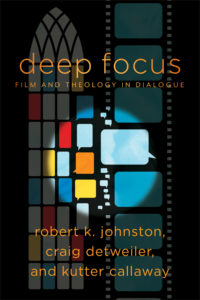 Deep Focus: Film and Theology in Dialogue Robert Johnston, Craig Detweiler and Kutter Callaway (Baker Academic) $26.99 As I’ve hinted above, I’m not inclined to be particularly interested in seeing what theologians, as such, have to say about film studies. A book about movies that has churchy stained glass on the cover strikes me as awkward. This sort of approach just seems somehow off to me, as if we have to somehow sanctify the ordinary act of watching movies not by thinking Christianly about movies (as Romanowski would argue) but that we need these professional thinkers about theology to make it so.
Deep Focus: Film and Theology in Dialogue Robert Johnston, Craig Detweiler and Kutter Callaway (Baker Academic) $26.99 As I’ve hinted above, I’m not inclined to be particularly interested in seeing what theologians, as such, have to say about film studies. A book about movies that has churchy stained glass on the cover strikes me as awkward. This sort of approach just seems somehow off to me, as if we have to somehow sanctify the ordinary act of watching movies not by thinking Christianly about movies (as Romanowski would argue) but that we need these professional thinkers about theology to make it so.
For what it is worth, I’d similarly say that that businesspeople need a Christian view of economics, not a “theology” of business and that, likewise, Christians in the sciences, say, need a faithful view of their research in God’s good world, a Christian approach to to the philosophy of science, less a “dialogue” with “theologians.” That these important authors of Deep Focus: Film and Theology in Dialogue (who have also done several other significant books that emerged out of their Reel Spirituality Institute at Fuller Theological Seminary) are all fine gents who served at a seminary probably makes this approach a natural in their world, I suppose. And, in this case, it sure is interesting, I’ll give that. Wow.
I just seem to discern – and I admit this may be a little unfair – a lurking dualism, rooted in the “sacred vs. secular” dichotomy that actually evolved in the church from pagan Plato, in this talk about a “secular” profession (business, science, art) needing to be “in conversation with” theology. Theology is an interesting, important, specialty, but why somebody with that specialty is privileged to be a necessary conversation partner conjures up for me an image of some some sacred/spiritual icing on the secular cake where faith is an ad-on, perfunctory. I’m sure they wouldn’t put it this way, but it nearly sounds as if secular movies can’t be discussed Christianly with Christianly-conceived aesthetic theories and coherent film studies approaches by movie makers and movie goers unless the religious guys from the theology department bless it all. It’s a caricature, I know, and a bit picky on my part, but it’s what this “theology of..” or “theology and…” lingo too often connotes.
Having said that, I was gobsmacked by how much I loved this Deep Focus: Film and Theology in Dialogue book.
Yes, I loved this book and found it hard to put down.
I can’t explain it all in detail now, but allow me to say I think this is the best volume yet to come out of this Reel Spirituality movement, and there have been some good ones (we we stock them all.) The authors really know their stuff, tell some personal stories about moments they’ve had at the Cineplex and I found it very enjoyable, quite stimulating, and even provocative. I’d highly recommend it as a follow-up or companion to Romanowski’s must-read Cinematic Faith.
Listen to Stefanie Knauss of Villanova University as she raves about Deep Focus:
Offering great movie choices, insightful analysis, wonderful prose, rich knowledge about film and theology – this book has it all. It’s a great read for all who are interested in the field of film and theology and offers the necessary tools to engage in this conversation in a knowledgeable, substantial way.
The publication of this new book this season – called “engaging, fluent and timely” – is curious. Romanowski, in his neat book, implies (but does not rail out loud) that too many Christian film studies volumes overestimate the role of content and underestimate the role of style, the art of the filmmaking craft. As we’ve seen above, Professor Romanowski suggests this isn’t adequate, that we must see how the aesthetics of the art of the filmmaking and directing and acting crafts influences how we then engage the movies themselves, as films. He suggests, as I’ve implied, that not enough of the Christian books on film do this that much.
And he’s on to something. Funny — I read one academic review in a scholarly journal once suggesting this same thing; a thoughtful Christian film prof was saying we simply have to get beyond a moralistic evaluation of a film’s content/message and pay equal attention to the art of the film and its production. And then that scholar continued on with the essay citing example after example of content, with hardly any word about angle of vision or editing or sound or even acting. That is, even those who say that we need a more aesthetically nuanced view of the art of movie-making, rarely get around to doing it.
Happily Deeply Focused: Film and Theology in Dialogue really does do a good measure of this, making it a very up-to-date, delightful, informative, and valuable contribution to those wanting a better Christian understanding of film. In this regard, at least, I’m sure Romanowski would applaud Deep Focus and how it helps us see the importance of the very stuff he is writing about. Kudos to Johnson, Detweiler, and Kutter for making this a central – and very enjoyable – part of Deep Focus.
There are three good chapters in Deep Focus that are entitled “Fade In: A Narrative Lens” and “Sights & Sounds: An Audiovisual Lens” and “Where Form Meets Feeling: A Critical Lens.” This is really, really good stuff, although I suspect I appreciated it all the more because I had just finished Cinematic Faith which alerted me to the need for such good material.
These authors do bring rather in-house theological terms to how they approach their topic – seeking an “ecclesial lens” and a “theological lens” and an “ethical lens” in other chapters.
In the chapter offering “an ecclesial lens” they are showing how God’s people in Christ’s church have been diverse in how we’ve engaged the culture and have held differing postures of appreciating or appropriating modern art, cinema, and popular movies. This is a bit obtuse at times, but they are trying to invite us to get beyond our historical debates within the church about film and the popular arts. They bring in lots of theologians (Tillich, Niehbur) and spirituality writers who will appeal to those who want this sort of churchy dialogue. It is interesting to me that the neo-Calvinist Romanowksi mostly quotes film critics and Christian philosophers and reviewers and rarely cites theologians as such.
The Deep Focus chapter exploring a theological lens is subtitled “Discerning Mystery” and, again, it is fascinating. I truly enjoyed it – like I loved Movies are Prayers by Josh Larson. The trio of Reel Spirituality authors tell very moving stories, actually, about their own film-going experiences and make a case for watching movies as a spiritual experience. Well, who doesn’t want that? I really appreciate this, and use this sort of “practicing the presence of God” sort of language to a contemplative approach to life fairly regularly. But, again –why must an experience of the arts before God’s face in God’s world be somehow a “spiritual” experience? Why can’t it just be a human experience, aesthetically charged as storytellers edify us with their search for meaning? What if we just have a good belly laugh or found ourselves strangely moved by touching romance? Sure these “common grace” gifts are a blessing from God but must they become mysterious encounters with the numinous in luminal space? You know what I mean?
Again, I almost sense a lurking dualism here, as if the “secular” art of movies has to be justified by bringing it into dialogue with theology and validated if it is a devotional experience. Sure some movies move us to tears and for Christians their tears are holy unto the Lord. But this move to make movies “spiritual” in search of an encounter with “mystery” somehow seems a bit fragmented. We don’t have to have a “dialogue” with theologians or have a “spiritual” experience to watch a movie faithfully.
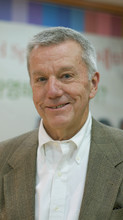
I suspect that these scholars would all agree, actually, so perhaps I should just receive their deep focus approach as another helpful tool for all of us to sense God’s presence in all things. There is absolutely no doubt that Johnston and Detweiler and Callaway are real film buffs and it is clear they have friends, literally, in the film scene in Hollywood. (Fuller Theological Seminary is near Hollywood and they’ve been in extraordinary discussions with real filmmakers and producers and directors, with those who write 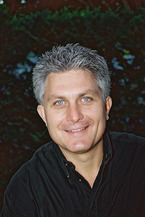
 screenplays and win awards for costuming and who are actors and actresses on the silver screen. They know their stuff and they’ve offered us important, inspiring stuff. In a back cover blurb, Terry Lindvall calls them “ophthalmologist of the cinema.” I love that!
screenplays and win awards for costuming and who are actors and actresses on the silver screen. They know their stuff and they’ve offered us important, inspiring stuff. In a back cover blurb, Terry Lindvall calls them “ophthalmologist of the cinema.” I love that!
As faith leaders who are obviously serious disciples of Jesus, we should listen to them and their good call to media literacy. Lindvall is correct in saying that:
This stellar work invites readers to join an ongoing conversation among some of the most cinematically literate companions one can find.
So, pass the popcorn and let’s get going, reading Cinematic Faith: A Christian Perspective on Movies and Meaning and Deep Focus: Film and Theology in Dialogue. Let’s surprise our churchy folks and show that followers of Jesus do not keep their faith to themselves, cordoned off from real, ordinary life. Lets help get that surprising message out there — that God cares about all of life and that we can (we must!) find ways to relate Sunday faith to Monday work as well as to our entertainment habits. Learning to be intelligent and wise and faithful in our discussion of and appreciation for contemporary movies is a great way to work that out, learning to discern God’s power and presence even in popular culture.
Enjoy these two great new books, or any others I mentioned, at our BookNotes 20% off. Our order form (below) is secure so you can enter credit card information safely, or you can hit “inquire” if you have any questions, need prices or availability on want to chat. We’re at your service. And who knows, maybe we’ll see you at the movies!
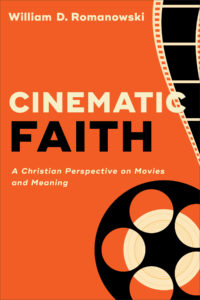
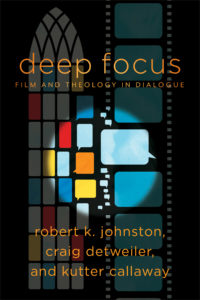
BookNotes

SPECIAL
DISCOUNT
20% OFF
ANY BOOK MENTIONED
+++
order here
this takes you to the secure Hearts & Minds order form page
just tell us what you want
inquire here
if you have questions or need more information
just ask us what you want to know
Hearts & Minds 234 East Main Street Dallastown PA 17313
read@heartsandmindsbooks.com
717-246-3333

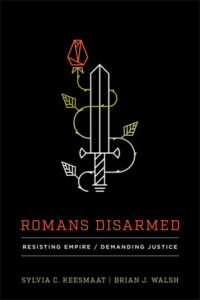 Last week’s BookNotes review
Last week’s BookNotes review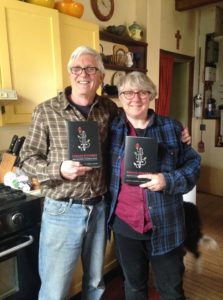 As I explained, Romans Disarmed book fits well within the decades of work and witness and writing Brian and Sylvia have done. They are a bit rare — academics who publish in the finest scholarly journals who work an organic farm, stewarding it well with old ways and some innovative permaculture approaches. (And they have animals and heirloom tomatoes and do workshops on all kinds of homesteading skills.) Plus, they have served among the homeless in Toronto, done campus ministry with college students, have mentored young adults in starting social service ministries and justice-seeking businesses. (Check out this video about
As I explained, Romans Disarmed book fits well within the decades of work and witness and writing Brian and Sylvia have done. They are a bit rare — academics who publish in the finest scholarly journals who work an organic farm, stewarding it well with old ways and some innovative permaculture approaches. (And they have animals and heirloom tomatoes and do workshops on all kinds of homesteading skills.) Plus, they have served among the homeless in Toronto, done campus ministry with college students, have mentored young adults in starting social service ministries and justice-seeking businesses. (Check out this video about 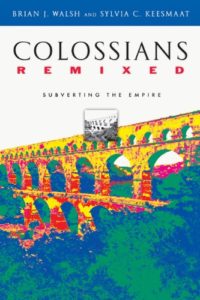 In case you missed it, I noted that Brian and Sylvia did a previous book in this same creative genre – an amazing, potent, radical, application-oriented (conversational) creative commentary called Colossians Remixed: Subverting the Empire (IVP Academic; $28.00; our sale price at 20% off = $22.40.) In that column I named some of their other books as well.
In case you missed it, I noted that Brian and Sylvia did a previous book in this same creative genre – an amazing, potent, radical, application-oriented (conversational) creative commentary called Colossians Remixed: Subverting the Empire (IVP Academic; $28.00; our sale price at 20% off = $22.40.) In that column I named some of their other books as well.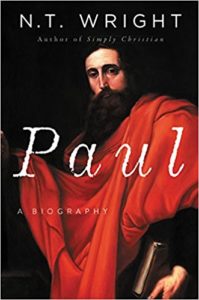 There have been a lot of books on St. Paul, lately. Those of us who don’t read a lot in this field may not know it, but it is stimulating to find the various scholars who are helping us solve our problems with Paul. Of course, we have raved about the novel-like biography of Paul colorfully written by N.T. Wright called Paul A Biography (HarperOne; $29.99; our 20% off sale price = $23.99) and we highly recommend it.
There have been a lot of books on St. Paul, lately. Those of us who don’t read a lot in this field may not know it, but it is stimulating to find the various scholars who are helping us solve our problems with Paul. Of course, we have raved about the novel-like biography of Paul colorfully written by N.T. Wright called Paul A Biography (HarperOne; $29.99; our 20% off sale price = $23.99) and we highly recommend it.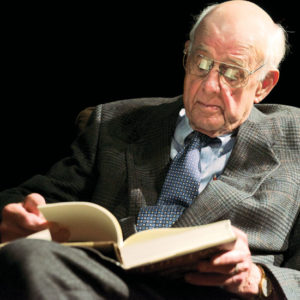

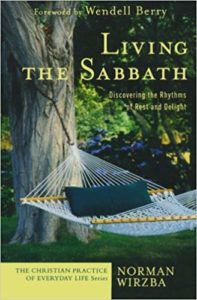 Practical books come to mind as helpful resources for more simple living like Nancy Sleeth’s delightful and very inspiring Almost Amish: One Woman’s Quest for a Slower, Simpler, More Sustainable Life (Tyndale; $14.99 – our sale price = $11.99) and wise, profound books like Norma Wirzba’s Living the Sabbath: Discovering the Rhythms of Rest and Delight (Brazos Press; $20.00; our sale price = $16.00) and A.J. Soboba’s Subversive Sabbath: The Surprising Power of Rest in a Nonstop Road (Brazos Press; $19.99; our sale price = $15.99) which are exceptionally helpful to shore up the Christian lifestyle proclaimed as good news in Romans Disarmed.
Practical books come to mind as helpful resources for more simple living like Nancy Sleeth’s delightful and very inspiring Almost Amish: One Woman’s Quest for a Slower, Simpler, More Sustainable Life (Tyndale; $14.99 – our sale price = $11.99) and wise, profound books like Norma Wirzba’s Living the Sabbath: Discovering the Rhythms of Rest and Delight (Brazos Press; $20.00; our sale price = $16.00) and A.J. Soboba’s Subversive Sabbath: The Surprising Power of Rest in a Nonstop Road (Brazos Press; $19.99; our sale price = $15.99) which are exceptionally helpful to shore up the Christian lifestyle proclaimed as good news in Romans Disarmed.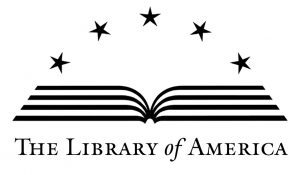 It brings us great delight to announce the release this past week of the prestigious Library of America’s simultaneous publication of two handsome, sturdy cloth hardbacks (expertly bound with high quality, acid-free paper, Smyth-sewn binding, even ribbon markers) of some of Wendell Berry’s most significant essays.
It brings us great delight to announce the release this past week of the prestigious Library of America’s simultaneous publication of two handsome, sturdy cloth hardbacks (expertly bound with high quality, acid-free paper, Smyth-sewn binding, even ribbon markers) of some of Wendell Berry’s most significant essays.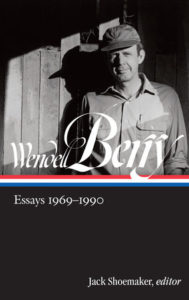
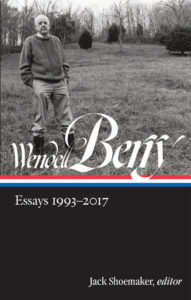
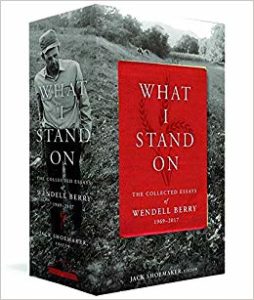 What I Stand On: The Collected Essays of Wendell Berry 1969-2017 Boxed Set edited by Wendell Berry (Library of America)
What I Stand On: The Collected Essays of Wendell Berry 1969-2017 Boxed Set edited by Wendell Berry (Library of America)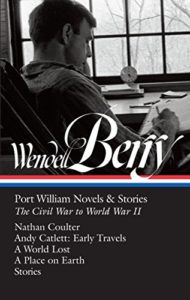 For those wanting to dip into Mr. Berry’s extraordinary fiction world – all of his novels and short stories are set within the membership of the same fictional Kentucky community, haphazardly scattered over more than a century — Library of America has published (and we have announced, previously) the first of a several volume set of his stories and novels, arranged, cleverly, in fictive, Port Williams historical order. That is, they are not chronological based on when Berry wrote or published them, but are ordered within the historical unfolding within Berry’s Port Williams world. We don’t know when the next volume is coming but this LoA is very, very nice.
For those wanting to dip into Mr. Berry’s extraordinary fiction world – all of his novels and short stories are set within the membership of the same fictional Kentucky community, haphazardly scattered over more than a century — Library of America has published (and we have announced, previously) the first of a several volume set of his stories and novels, arranged, cleverly, in fictive, Port Williams historical order. That is, they are not chronological based on when Berry wrote or published them, but are ordered within the historical unfolding within Berry’s Port Williams world. We don’t know when the next volume is coming but this LoA is very, very nice.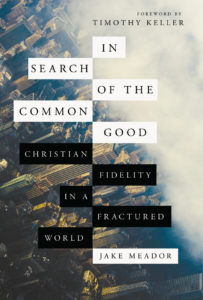
 Jake brings brilliant learning and fine writing (he is vice president of the brainy Davenant Institute and the editor-in-chief of Mere Orthodoxy) but he’s a real Wendell Berry buff, so he’s always down to Earth. His sense of place – and his invitation to us to deepen our own loyalties to our own places – is palpable. It may be because he’s a Husker from Nebraska and has seemingly fierce loyalties there. As Collin Hansen of the Gospel Coalition says of Meador’s writing, “You’ll see his characteristic combination of deep learning with an earthy touch.” That’s putting it mildly. There’s real dirt under this guy’s fingernails.
Jake brings brilliant learning and fine writing (he is vice president of the brainy Davenant Institute and the editor-in-chief of Mere Orthodoxy) but he’s a real Wendell Berry buff, so he’s always down to Earth. His sense of place – and his invitation to us to deepen our own loyalties to our own places – is palpable. It may be because he’s a Husker from Nebraska and has seemingly fierce loyalties there. As Collin Hansen of the Gospel Coalition says of Meador’s writing, “You’ll see his characteristic combination of deep learning with an earthy touch.” That’s putting it mildly. There’s real dirt under this guy’s fingernails. The first half of In Search of the Common Good is a vital and compelling few chapters – about 30 pages – on “The Breakdown of Community.” He explores what he calls “the passing of the American church” and then explains, brilliantly, “the unwinding of common life in America.” You know this stuff in your bones, but we need words to say it, and we need some sense of why we’re experiencing this unprecedented unwinding. It is very good writing; I was engaged from the beginning. And it offers a view that isn’t alarmist, but is urgent.
The first half of In Search of the Common Good is a vital and compelling few chapters – about 30 pages – on “The Breakdown of Community.” He explores what he calls “the passing of the American church” and then explains, brilliantly, “the unwinding of common life in America.” You know this stuff in your bones, but we need words to say it, and we need some sense of why we’re experiencing this unprecedented unwinding. It is very good writing; I was engaged from the beginning. And it offers a view that isn’t alarmist, but is urgent. Romans Disarmed: Resisting Empire/Demanding Justice by Sylvia Keesmaat & Brian Walsh (Brazos Press) ON SALE – 20% OFF regular price = $26.99 / our sale price = $21.59
Romans Disarmed: Resisting Empire/Demanding Justice by Sylvia Keesmaat & Brian Walsh (Brazos Press) ON SALE – 20% OFF regular price = $26.99 / our sale price = $21.59 air, but are drawn from what we know about first century social experience in Rome. In a chapter called “Kitchen Walls and Tenement Halls” we meet a slave, Iris, (who is named after a person who is actually described in a scholarly work by Peter Oakes called Reading Romans in Pompeii: Paul’s Letter at Ground Zero) and we meet Nereus, a Judean who lived among the dock workers and leather makers in the lowlands by the Tiber, but who ventured into the heart of Rome to hear Paul’s letter. Where he meets the pagan slave woman, Iris. What a story, laden with scholarly footnotes and even Bible references (who knew the list of names in Romans 16 could be so informative and yield such an interesting story!)
air, but are drawn from what we know about first century social experience in Rome. In a chapter called “Kitchen Walls and Tenement Halls” we meet a slave, Iris, (who is named after a person who is actually described in a scholarly work by Peter Oakes called Reading Romans in Pompeii: Paul’s Letter at Ground Zero) and we meet Nereus, a Judean who lived among the dock workers and leather makers in the lowlands by the Tiber, but who ventured into the heart of Rome to hear Paul’s letter. Where he meets the pagan slave woman, Iris. What a story, laden with scholarly footnotes and even Bible references (who knew the list of names in Romans 16 could be so informative and yield such an interesting story!)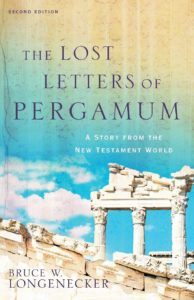 I might add there are several fun books that do this sort of thing, but not many. Keesmaat and Walsh site the fabulous The Lost Letters of Pergamum: A Story from the New Testament World by Bruce Longenecker (Baker Academic; $19.99), a book we championed it its early first edition. See also the clever books in a recent series by IVP such as A Week in the Life of Corinth and A Week During the Fall of Jerusalem (both by Ben Witherington) and A Week in the Life of a Roman Centurion by Gary Burge) and several others.
I might add there are several fun books that do this sort of thing, but not many. Keesmaat and Walsh site the fabulous The Lost Letters of Pergamum: A Story from the New Testament World by Bruce Longenecker (Baker Academic; $19.99), a book we championed it its early first edition. See also the clever books in a recent series by IVP such as A Week in the Life of Corinth and A Week During the Fall of Jerusalem (both by Ben Witherington) and A Week in the Life of a Roman Centurion by Gary Burge) and several others.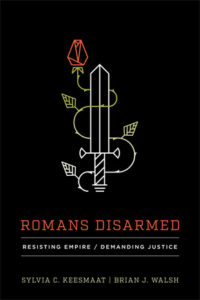 I might as well just say it. I think Romans Disarmed: Resisting Empire/Demanding Justice is the most important book of Biblical study I have read in years; perhaps ever. I promise you that you have never read anything like it, and it is one of those few books that the often-used (but rarely accurate) phrase “it could change your life” applies. It surely deserves a Best Book of the Year award, but, because it is so politically charged, don’t expect to see it on evangelical “Best of 2019” lists. I suspect most Christian bookstores won’t even carry it. I assume (but one never knows) that the respected New Testament commentators who are active – Douglas Moo, Tom Wright, Fleming Rutledge, Beverly Gavanta, Katherine Grieb, Michael Bird, Frank Matera, Craig Keener, Scot McKnight, Richard Longenecker, Michael Gorman, Stephen Westerholm, Thomas Schreiner, Richard Hays — will be weighing in on its merits. Will they appreciate how much social location matters? Will they know why they draw so much on Elsa Tamez and her book Amnesty of Grace exploring justification by faith through the lens of suffering and repression in Latin America? Romans Disarmed is a very important book and I can’t wait to hear what others think about it.
I might as well just say it. I think Romans Disarmed: Resisting Empire/Demanding Justice is the most important book of Biblical study I have read in years; perhaps ever. I promise you that you have never read anything like it, and it is one of those few books that the often-used (but rarely accurate) phrase “it could change your life” applies. It surely deserves a Best Book of the Year award, but, because it is so politically charged, don’t expect to see it on evangelical “Best of 2019” lists. I suspect most Christian bookstores won’t even carry it. I assume (but one never knows) that the respected New Testament commentators who are active – Douglas Moo, Tom Wright, Fleming Rutledge, Beverly Gavanta, Katherine Grieb, Michael Bird, Frank Matera, Craig Keener, Scot McKnight, Richard Longenecker, Michael Gorman, Stephen Westerholm, Thomas Schreiner, Richard Hays — will be weighing in on its merits. Will they appreciate how much social location matters? Will they know why they draw so much on Elsa Tamez and her book Amnesty of Grace exploring justification by faith through the lens of suffering and repression in Latin America? Romans Disarmed is a very important book and I can’t wait to hear what others think about it.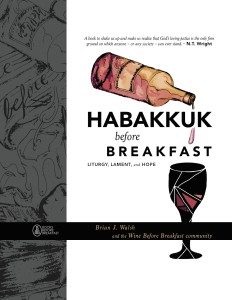 As they tell of these painful stories (some of us met their late friend Iggy in Brian’s powerful Habakkuk Before Breakfast; Books Before Breakfast; $14.00 which
As they tell of these painful stories (some of us met their late friend Iggy in Brian’s powerful Habakkuk Before Breakfast; Books Before Breakfast; $14.00 which 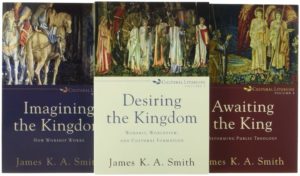 Christian faith is never mostly about holding the right abstract theological truisms, but always about what we embody as we live out the deepest convictions of our hearts, “against the world, but for the world” as some put it. (By the way, as an aside: did you know that James K.A. Smith, who wrote the must-read “cultural formation” trilogy, summarized in his one-volume You Are
Christian faith is never mostly about holding the right abstract theological truisms, but always about what we embody as we live out the deepest convictions of our hearts, “against the world, but for the world” as some put it. (By the way, as an aside: did you know that James K.A. Smith, who wrote the must-read “cultural formation” trilogy, summarized in his one-volume You Are 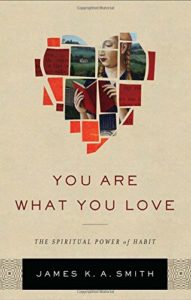 What You Love: The Spiritual Power of Habits (Brazos Press; $19.99), studied with Brian Walsh when he was a grad student at the
What You Love: The Spiritual Power of Habits (Brazos Press; $19.99), studied with Brian Walsh when he was a grad student at the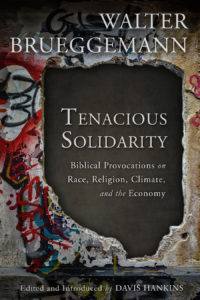
 activist poet Wendell Berry and anti-globalization prophet Naomi Klein. If you’ve read the latest from Brueggemann (like Tenacious Solidarity or Truth Speaks to Power or God, Neighbor, Empire) or Wendell Berry’s Sex, Economy, Freedom Community or Citizenship Papers, or any of Ms. Klein’s anti-climate change manifestos (or, for that matter, anything by their friend Norman Wirzba, who writes on faith and food, farming, Sabbath, and the like, and edited the Wendell Berry agrarian collection The Art of the Commonplace) you’ll have a sense of where they are coming from. Or, maybe, you could pick up the book I last spotlighted in BookNotes, The Possibility of America (WJK; $17.00) by David Dark, who, with a poet’s eye and patriot’s heart, gets so much of this.
activist poet Wendell Berry and anti-globalization prophet Naomi Klein. If you’ve read the latest from Brueggemann (like Tenacious Solidarity or Truth Speaks to Power or God, Neighbor, Empire) or Wendell Berry’s Sex, Economy, Freedom Community or Citizenship Papers, or any of Ms. Klein’s anti-climate change manifestos (or, for that matter, anything by their friend Norman Wirzba, who writes on faith and food, farming, Sabbath, and the like, and edited the Wendell Berry agrarian collection The Art of the Commonplace) you’ll have a sense of where they are coming from. Or, maybe, you could pick up the book I last spotlighted in BookNotes, The Possibility of America (WJK; $17.00) by David Dark, who, with a poet’s eye and patriot’s heart, gets so much of this.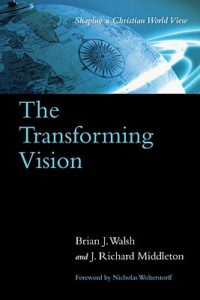 That they learned much of this analysis about ideology and idols from Dutch Kuyperian economist and socio-political observer Bob Goudzwaard is no secret, and Brian’s 1980s classic (co-authored with Richard Middleton) The Transforming Vision: Shaping a Christian Worldview (IVP Academic; $25.00) remains a succinct and powerful study of the development of the idols of our time that they named as scientism, technicism, and economism. (Idols, you know, are good things that become ultimate things; things we trust for communal salvation and that we start to serve and even become like.) That their imagination of seeing and saying this stuff has been deepened by Canadian folk-rock-pop singer-songwriter Bruce Cockburn is no surprise, either, and Brian has explored how a Christian social imaginary can be enhanced by a close reading of Cockburn lyrics in his brilliant Kicking at the Darkness: Bruce Cockburn and the Christian Imagination (Brazos Press; $19.00.) Believe me, it’s illuminating about the arts, about music, and about the idols of our time, helping us “see” things anew, whether you happen to like Cockburn’s songs or not.
That they learned much of this analysis about ideology and idols from Dutch Kuyperian economist and socio-political observer Bob Goudzwaard is no secret, and Brian’s 1980s classic (co-authored with Richard Middleton) The Transforming Vision: Shaping a Christian Worldview (IVP Academic; $25.00) remains a succinct and powerful study of the development of the idols of our time that they named as scientism, technicism, and economism. (Idols, you know, are good things that become ultimate things; things we trust for communal salvation and that we start to serve and even become like.) That their imagination of seeing and saying this stuff has been deepened by Canadian folk-rock-pop singer-songwriter Bruce Cockburn is no surprise, either, and Brian has explored how a Christian social imaginary can be enhanced by a close reading of Cockburn lyrics in his brilliant Kicking at the Darkness: Bruce Cockburn and the Christian Imagination (Brazos Press; $19.00.) Believe me, it’s illuminating about the arts, about music, and about the idols of our time, helping us “see” things anew, whether you happen to like Cockburn’s songs or not.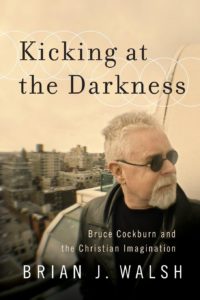
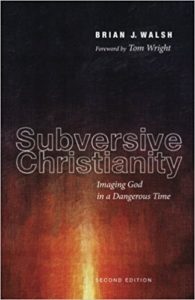 We have often promoted Brian’s small but potent collection of essays/sermons (with a foreword by N.T. Wright and a blurb on the back by yours truly) called Subversive Christianity: Imaging God in a Dangerous Time (Wipf & Stock; $17.00.) Even for those old friends who have the first edition, the second edition released in 2014 has a very important, long, new chapter that anticipates the work being done here analyzing the American empire, globalization, economic injustice, the violence of the state, and how the Bible itself can deconstruct – subvert – the harsh ideologies that, in Cockburn’s lyric (in a song about the International Monetary Fund’s dubious work in the developing world) offer “deification of tyranny – idolatry of ideology.”
We have often promoted Brian’s small but potent collection of essays/sermons (with a foreword by N.T. Wright and a blurb on the back by yours truly) called Subversive Christianity: Imaging God in a Dangerous Time (Wipf & Stock; $17.00.) Even for those old friends who have the first edition, the second edition released in 2014 has a very important, long, new chapter that anticipates the work being done here analyzing the American empire, globalization, economic injustice, the violence of the state, and how the Bible itself can deconstruct – subvert – the harsh ideologies that, in Cockburn’s lyric (in a song about the International Monetary Fund’s dubious work in the developing world) offer “deification of tyranny – idolatry of ideology.”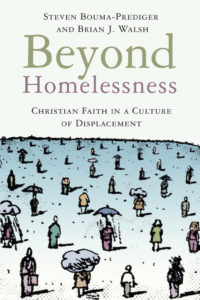 Almost a decade ago, Brian teamed up with beloved environmental studies professor and creation-care advocate at Hope College, Stephen Bouma-Prediger to write a book that, again, forms a nearly essential backdrop to the work he and Sylvia have done in Romans Disarmed. It is called Beyond Homelessness: Christian Faith in a Culture of Displacement (Eerdmans; $29.00) in which they play with the classic shorthand for the Biblical narrative, “creation-fall-redemption”, by talking about “homemaking-exile-homecoming.”(For those who get the inside joke, I have called that book Al Wolters meets Wendell Berry meets James Howard Kunstler.)
Almost a decade ago, Brian teamed up with beloved environmental studies professor and creation-care advocate at Hope College, Stephen Bouma-Prediger to write a book that, again, forms a nearly essential backdrop to the work he and Sylvia have done in Romans Disarmed. It is called Beyond Homelessness: Christian Faith in a Culture of Displacement (Eerdmans; $29.00) in which they play with the classic shorthand for the Biblical narrative, “creation-fall-redemption”, by talking about “homemaking-exile-homecoming.”(For those who get the inside joke, I have called that book Al Wolters meets Wendell Berry meets James Howard Kunstler.)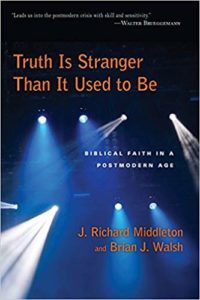 (This theme of longing for a safe home was conjured up beautifully in Brian’s book on Cockburn in which he preached the gospel of homecoming in tandem with Bruce’s song “The Candy Man’s Gone” and previously in Truth Is Stranger Than It Used to Be: Biblical Faith in a Postmodern Age (IVP Academic; $26.00) which made the case that a longing for home was behind much of the and ennui and restlessness of postmodernity.It remains the best book on the subject, and the one the engages the Bible the most!)
(This theme of longing for a safe home was conjured up beautifully in Brian’s book on Cockburn in which he preached the gospel of homecoming in tandem with Bruce’s song “The Candy Man’s Gone” and previously in Truth Is Stranger Than It Used to Be: Biblical Faith in a Postmodern Age (IVP Academic; $26.00) which made the case that a longing for home was behind much of the and ennui and restlessness of postmodernity.It remains the best book on the subject, and the one the engages the Bible the most!)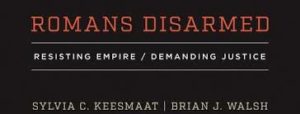
 A third point to underscore: from very contemporary debates about climate change or sexuality or race and ethnicity or theological doctrine, the letter of Paul has been weaponized (used to bolster a strident view, to exclude others, or, as in Boy Erased, where a Bible was literally used to pummel a teen, making a point that God’s Word can pound out same-sex attraction.) From a Trump official saying last summer that we have to obey them because of Romans 13 (oh, what a misreading!) to insistence on certain views about Jews or predestination, this weaponizing is prevalent. Drs. Keesmaat & Walsh insist we have to read it in a more generous and disarming way so it can function for us today as it surely did in the first century in Rome.
A third point to underscore: from very contemporary debates about climate change or sexuality or race and ethnicity or theological doctrine, the letter of Paul has been weaponized (used to bolster a strident view, to exclude others, or, as in Boy Erased, where a Bible was literally used to pummel a teen, making a point that God’s Word can pound out same-sex attraction.) From a Trump official saying last summer that we have to obey them because of Romans 13 (oh, what a misreading!) to insistence on certain views about Jews or predestination, this weaponizing is prevalent. Drs. Keesmaat & Walsh insist we have to read it in a more generous and disarming way so it can function for us today as it surely did in the first century in Rome.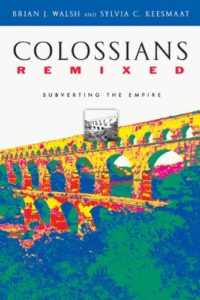 One of the ways they enact this exact sort of hospitable discourse is by using a device they featured creatively in Colossians Remixed. Just when some of their teaching is getting heavy and their Bible interpretation seems a bit speculative, in comes another voice, in italics, an interlocutor. I was hoping the argumentative kid who gave them a hard time in Colossians Remixed, interrupting with skeptical questions that led to fascinating digressions would be back, but it isn’t that guy. This new conversation partner is skeptical enough, but seems to be on board more with their claims, asking wise and good questions, seeking clarification of their exegesis and theological views and telling stories from his own life about the difficulties of applying this kind of anti-imperial lifestyle. They can debate about what Keesmaat & Walsh mean when they say that Romans 1
One of the ways they enact this exact sort of hospitable discourse is by using a device they featured creatively in Colossians Remixed. Just when some of their teaching is getting heavy and their Bible interpretation seems a bit speculative, in comes another voice, in italics, an interlocutor. I was hoping the argumentative kid who gave them a hard time in Colossians Remixed, interrupting with skeptical questions that led to fascinating digressions would be back, but it isn’t that guy. This new conversation partner is skeptical enough, but seems to be on board more with their claims, asking wise and good questions, seeking clarification of their exegesis and theological views and telling stories from his own life about the difficulties of applying this kind of anti-imperial lifestyle. They can debate about what Keesmaat & Walsh mean when they say that Romans 1 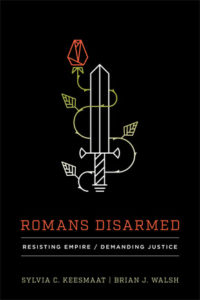 exposes “the idolatry at the root of the depravity of life in the Empire” and how the Jerusalem Council re-imagined the nature of faithful discipleship and what stipulations are essential for fellow believers, but they also must talk about what difference all this makes for us and what we should be about now, in these times. I don’t recall that we ever learned this person’s name, but she (I thought it is a he, but we learn, eventually that it is a woman) is a great part of the story. This dialogue partner, even though pushing back against some of their statements, is sincere and eager to learn and grow into deeper more relevant fidelity to the gospel. She’s a good part of the story.
exposes “the idolatry at the root of the depravity of life in the Empire” and how the Jerusalem Council re-imagined the nature of faithful discipleship and what stipulations are essential for fellow believers, but they also must talk about what difference all this makes for us and what we should be about now, in these times. I don’t recall that we ever learned this person’s name, but she (I thought it is a he, but we learn, eventually that it is a woman) is a great part of the story. This dialogue partner, even though pushing back against some of their statements, is sincere and eager to learn and grow into deeper more relevant fidelity to the gospel. She’s a good part of the story.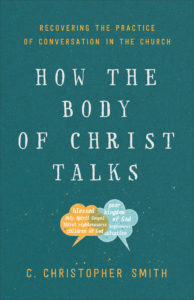 It is true, after all, that we all need to grapple with this matter of hearing each other, of hosting better conversations, which is why I’m sure Brian and Sylvia would love – as we do! – the new book (also published by Brazos) by our friend out at Englewood MO, C. Christopher Smith, who just released the must-read How the Body of Christ Talks: Recovering the Practice of Conversation in the Church (Brazos Press; $16.99.) I suspect that as you are reading Romans Disarmed you are going to want to have some conversations about a lot of different things and How the Body of Christ Talks just might be tool that will save you a lot of grief, guiding you towards being communities of missional conversation and prophetic dialogue. Oh yes, this is rich, thoughtful, good stuff and would make a great companion volume to read alongside Romans Disarmed.
It is true, after all, that we all need to grapple with this matter of hearing each other, of hosting better conversations, which is why I’m sure Brian and Sylvia would love – as we do! – the new book (also published by Brazos) by our friend out at Englewood MO, C. Christopher Smith, who just released the must-read How the Body of Christ Talks: Recovering the Practice of Conversation in the Church (Brazos Press; $16.99.) I suspect that as you are reading Romans Disarmed you are going to want to have some conversations about a lot of different things and How the Body of Christ Talks just might be tool that will save you a lot of grief, guiding you towards being communities of missional conversation and prophetic dialogue. Oh yes, this is rich, thoughtful, good stuff and would make a great companion volume to read alongside Romans Disarmed.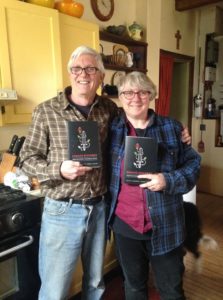 That is, they think Paul’s letter, read carefully and contextually, insists on an open and inclusive fellowship. But they also are clear that (following nearly every other major, well-informed Bible scholar) when Paul uses the word righteousness, he means very much something like what we today might call social justice; as N.T. Wright puts it in his oh-so-British way, a “putting things to rights.” Salvation is not a promise of an ethereal soul floating off to heaven because one got the ticket out of hell, but the breaking in of a new creation order, a regime change here on earth where God in Christ brings His shalom, social health, cultural renewal, a politics of peacemaking, a Jubilee vision of justice. This is not liberal social gospel rhetoric, but the best, most faithful rendering of what the Bible itself really says. We have Christ’s righteousness imputed and imparted to us, and that, properly understood, means we become gospel-infused agents of justice. Which maybe starts with hospitality, being welcoming and listening well, especially to the marginalized and hurting.
That is, they think Paul’s letter, read carefully and contextually, insists on an open and inclusive fellowship. But they also are clear that (following nearly every other major, well-informed Bible scholar) when Paul uses the word righteousness, he means very much something like what we today might call social justice; as N.T. Wright puts it in his oh-so-British way, a “putting things to rights.” Salvation is not a promise of an ethereal soul floating off to heaven because one got the ticket out of hell, but the breaking in of a new creation order, a regime change here on earth where God in Christ brings His shalom, social health, cultural renewal, a politics of peacemaking, a Jubilee vision of justice. This is not liberal social gospel rhetoric, but the best, most faithful rendering of what the Bible itself really says. We have Christ’s righteousness imputed and imparted to us, and that, properly understood, means we become gospel-infused agents of justice. Which maybe starts with hospitality, being welcoming and listening well, especially to the marginalized and hurting. You can decide for yourself if chatting with Sylvia and Brian at church, or hanging around the rough-around-the edges ministry of Greg Paul and his Sanctuary Community that they tell us about, or visiting their farm and joining in the daily chores (yes, it’s a real farm with a lot of daily chores) would feel safe and good for you, if they are truly hospitable and welcoming of a variety of views. I have a hunch that even if
You can decide for yourself if chatting with Sylvia and Brian at church, or hanging around the rough-around-the edges ministry of Greg Paul and his Sanctuary Community that they tell us about, or visiting their farm and joining in the daily chores (yes, it’s a real farm with a lot of daily chores) would feel safe and good for you, if they are truly hospitable and welcoming of a variety of views. I have a hunch that even if 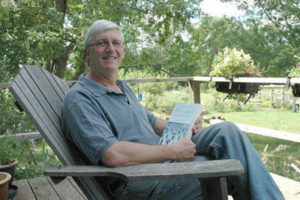 you find them, as I do, a bit strident at times, you will like them a lot. They know a lot about philosophy, about church history, about contemporary political issues, about rock music, about urban architecture, and contemporary social science, and, yep, they grow food and love to bake bread and do many, essential home-making arts. They know their Bibles and they love Jesus. And you can trust that they’ll shoot straight, telling you what’s on their hearts. What’s not to like?
you find them, as I do, a bit strident at times, you will like them a lot. They know a lot about philosophy, about church history, about contemporary political issues, about rock music, about urban architecture, and contemporary social science, and, yep, they grow food and love to bake bread and do many, essential home-making arts. They know their Bibles and they love Jesus. And you can trust that they’ll shoot straight, telling you what’s on their hearts. What’s not to like?
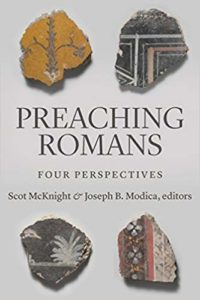 social and even political implications. They flesh it out more robustly and with more verve than any other book we know, but this isn’t altogether pioneering stuff. In fact, just a few months back a great book was released compiled and edited (again) by McKnight & Modica called Preaching Romans: Four Perspectives (Eerdmans; $20.00.) These essays and sample sermons illustrated generously how many different views there are about the heart of Romans, how to read it, and how sermons proclaim its grace and grit to us for our daily discipleship. From Fleming Rutledge to Will Willimon to Carl Trueman to Tara Beth Leach, there is good stuff in here. Friends who are sympathetic to Walsh and Keesmaat are included in voices such as Michael Gorman and Richard Hays.
social and even political implications. They flesh it out more robustly and with more verve than any other book we know, but this isn’t altogether pioneering stuff. In fact, just a few months back a great book was released compiled and edited (again) by McKnight & Modica called Preaching Romans: Four Perspectives (Eerdmans; $20.00.) These essays and sample sermons illustrated generously how many different views there are about the heart of Romans, how to read it, and how sermons proclaim its grace and grit to us for our daily discipleship. From Fleming Rutledge to Will Willimon to Carl Trueman to Tara Beth Leach, there is good stuff in here. Friends who are sympathetic to Walsh and Keesmaat are included in voices such as Michael Gorman and Richard Hays.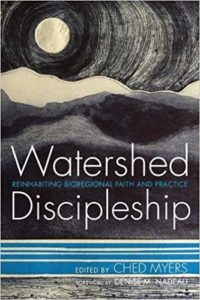 stewardly within their own watershed (they are part of a movement explored, in fact, in a book edited by Ched Meyers called Watershed Discipleship: Reinhabiting Bioregional Faith & Practice [Cascade; $30.00.]) Of course they draw on some of the great, clear writings of Wendell Berry, who they’ve been citing for years. They talk about race and racial injustice (which, for them, include a lot about First Nations people in Canada, among whom they have good friends and with whom they have been working for decades, long before the uprising at Standing Rock brought Native people’s contemporary issues to most of our awareness.) They talk about food and music and politics and violence and home-making and sexuality and worship and lament and joy and grace and worldviews. All in a commentary on a book of the Bible that some people think is metaphysical, theological, and beyond their ken. Again I say, wow. Romans Disarmed is one of the most curiously interesting, life-changing books I have read in a very long time.
stewardly within their own watershed (they are part of a movement explored, in fact, in a book edited by Ched Meyers called Watershed Discipleship: Reinhabiting Bioregional Faith & Practice [Cascade; $30.00.]) Of course they draw on some of the great, clear writings of Wendell Berry, who they’ve been citing for years. They talk about race and racial injustice (which, for them, include a lot about First Nations people in Canada, among whom they have good friends and with whom they have been working for decades, long before the uprising at Standing Rock brought Native people’s contemporary issues to most of our awareness.) They talk about food and music and politics and violence and home-making and sexuality and worship and lament and joy and grace and worldviews. All in a commentary on a book of the Bible that some people think is metaphysical, theological, and beyond their ken. Again I say, wow. Romans Disarmed is one of the most curiously interesting, life-changing books I have read in a very long time.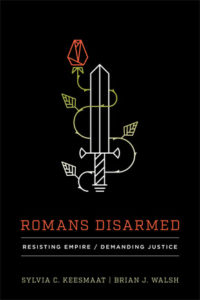
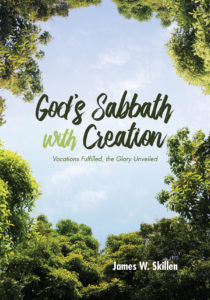 God’s Sabbath With Creation: Vocations Fulfilled, the Glory Unveiled James W. Skillen (Wipf & Stock) $35.00 Well, if Sylvia Keesmaat & Brain Walsh are feisty farmers and watershed activists, stewarding well their own land even while in conversation with First Nation’s peoples seeking justice, and this sense-of-place informs their study of Romans which they see as an anti-Empire manifesto, this new book – which picks up some (vaguely) similar themes, by political scientist and founder of the moderate Christian think-tank and faith-based, US citizen’s group, the
God’s Sabbath With Creation: Vocations Fulfilled, the Glory Unveiled James W. Skillen (Wipf & Stock) $35.00 Well, if Sylvia Keesmaat & Brain Walsh are feisty farmers and watershed activists, stewarding well their own land even while in conversation with First Nation’s peoples seeking justice, and this sense-of-place informs their study of Romans which they see as an anti-Empire manifesto, this new book – which picks up some (vaguely) similar themes, by political scientist and founder of the moderate Christian think-tank and faith-based, US citizen’s group, the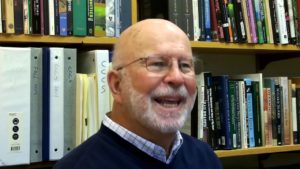 foundational critique of the secular rationalism of much of the Western philosophical tradition (and the pietism and/or secular rationalism of the Western theological tradition, as well) from the famous Dutch philosopher, Herman Dooyeweerd. Dr. Skillen has long been deeply grounded in that particular stream of neo-Calvinist (“reformational”) worldview philosophy and although he has been a political scientist most of his life (his most recent previous book is one
foundational critique of the secular rationalism of much of the Western philosophical tradition (and the pietism and/or secular rationalism of the Western theological tradition, as well) from the famous Dutch philosopher, Herman Dooyeweerd. Dr. Skillen has long been deeply grounded in that particular stream of neo-Calvinist (“reformational”) worldview philosophy and although he has been a political scientist most of his life (his most recent previous book is one 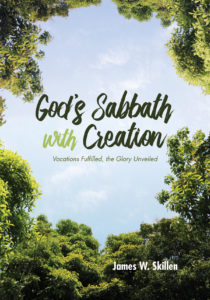
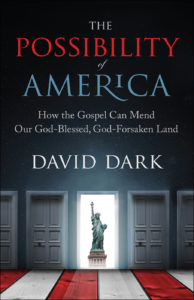 The Possibility of America: How the Gospel Can Mend our God-Blessed, God-Forsake Land David Dark (Westminster John Knox) $17.00 OUR SALE PRICE = $13.60
The Possibility of America: How the Gospel Can Mend our God-Blessed, God-Forsake Land David Dark (Westminster John Knox) $17.00 OUR SALE PRICE = $13.60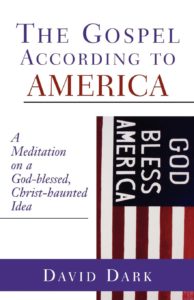 The Possibility of America: How the Gospel Can Mend our God-Blessed, God-Forsake Land is actually a considerable re-working and expanded edition of his 2005 book, The Gospel According to America: A Meditation on a Christ-haunted, God-blessed Idea. It is, for those who are familiar with that stimulating, much-discussed book, different enough that it demanded a new title; it is not just a “revised” edition. There’s so much new content in The Possibility of America that it earned a new title; not only is there considerable re-working and new content, the overall tone is a bit different. Understandably.
The Possibility of America: How the Gospel Can Mend our God-Blessed, God-Forsake Land is actually a considerable re-working and expanded edition of his 2005 book, The Gospel According to America: A Meditation on a Christ-haunted, God-blessed Idea. It is, for those who are familiar with that stimulating, much-discussed book, different enough that it demanded a new title; it is not just a “revised” edition. There’s so much new content in The Possibility of America that it earned a new title; not only is there considerable re-working and new content, the overall tone is a bit different. Understandably. Enter David Dark, who once was a bit less outraged and a bit less consumed by the dark antics of our leaders, and who has deepened his long standing passion for Biblical justice and relating prophetic truth to current realities.
Enter David Dark, who once was a bit less outraged and a bit less consumed by the dark antics of our leaders, and who has deepened his long standing passion for Biblical justice and relating prophetic truth to current realities.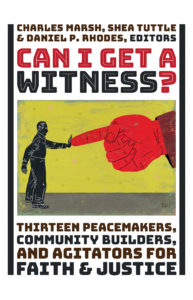 To wit: see also the great chapter by Mr. Dark on Father Berrigan in the wonderfully grand Eerdmans collection called Can I Get a Witness: Thirteen Peacemakers, Community Builders, and Agitators for Faith & Justice (Eerdmans) $26.99. OUR SALE PRICE = $21.59 I described this very sturdy and nicely bound hardback previously at BookNotes, exclaiming how profound this collection is, how needed. Edited by Charles Marsh, Shea Tuttle, & Daniel Rhodes, there are a baker’s dozen chapters by 13 deeply caring authors. Each good author tells about a certain American saint who lived out faith in robust and often-controversial ways, who took a stand, spoke out, paid up. The research for the book came out of a several year project overseen by Charles Marsh at the
To wit: see also the great chapter by Mr. Dark on Father Berrigan in the wonderfully grand Eerdmans collection called Can I Get a Witness: Thirteen Peacemakers, Community Builders, and Agitators for Faith & Justice (Eerdmans) $26.99. OUR SALE PRICE = $21.59 I described this very sturdy and nicely bound hardback previously at BookNotes, exclaiming how profound this collection is, how needed. Edited by Charles Marsh, Shea Tuttle, & Daniel Rhodes, there are a baker’s dozen chapters by 13 deeply caring authors. Each good author tells about a certain American saint who lived out faith in robust and often-controversial ways, who took a stand, spoke out, paid up. The research for the book came out of a several year project overseen by Charles Marsh at the 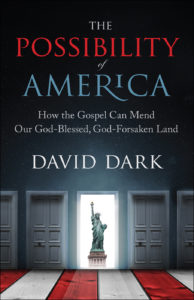 As I trust I’ve made clear, he has written about a variety of aspects of American culture and politics, if in a tone of “new seriousness.” The stern Berrigan-esque insight is prevalent but America is not just a nay-saying screed. He truly enjoys thinking about this stuff – one can tell, in part by the way his fertile mind jumps from this author to that, this episode of an old TV show to that, from a memory of being frustrated with a scene in Patch Adams to teaching us the importance of Faulkner’s The Sound and the Fury or riffing on the message of folk singer John Prine’s song “Your Flag Decal Won’t Get Your into Heaven Anymore,” or how one of his conversation partners (a student, perhaps?) put Wendell Berry in his pantheon of elders, “right up there with Tupac Shakur and Ursula K. Le Guin.”
As I trust I’ve made clear, he has written about a variety of aspects of American culture and politics, if in a tone of “new seriousness.” The stern Berrigan-esque insight is prevalent but America is not just a nay-saying screed. He truly enjoys thinking about this stuff – one can tell, in part by the way his fertile mind jumps from this author to that, this episode of an old TV show to that, from a memory of being frustrated with a scene in Patch Adams to teaching us the importance of Faulkner’s The Sound and the Fury or riffing on the message of folk singer John Prine’s song “Your Flag Decal Won’t Get Your into Heaven Anymore,” or how one of his conversation partners (a student, perhaps?) put Wendell Berry in his pantheon of elders, “right up there with Tupac Shakur and Ursula K. Le Guin.”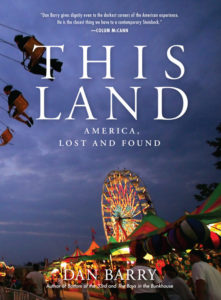 This Land: America, Lost and Found Dan Barry (Black Dog & Leventhal Publishers) $29.99 OUR SALE PRCE = $23.99 I came to respect Dan Barry as a extraordinary writer and dogged investigator and great storyteller when I read one of the most gripping books of creative nonfiction I’ve ever read, Boys in the Bunkhouse: Servitude and Salvation in the Heartland. (Enter it in quotations in our “search” box at the Hearts & Minds bookstore website and you can find my comments about it in December of 2016 or again when I awarded it Best Book award at the end of that year.) That award-winning expose moved me so that I explored his personal memoir, Pull Me Up, and then his great baseball book Bottom of the 33rd.
This Land: America, Lost and Found Dan Barry (Black Dog & Leventhal Publishers) $29.99 OUR SALE PRCE = $23.99 I came to respect Dan Barry as a extraordinary writer and dogged investigator and great storyteller when I read one of the most gripping books of creative nonfiction I’ve ever read, Boys in the Bunkhouse: Servitude and Salvation in the Heartland. (Enter it in quotations in our “search” box at the Hearts & Minds bookstore website and you can find my comments about it in December of 2016 or again when I awarded it Best Book award at the end of that year.) That award-winning expose moved me so that I explored his personal memoir, Pull Me Up, and then his great baseball book Bottom of the 33rd.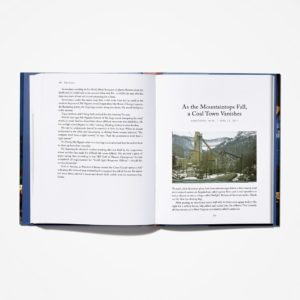 This handsome volume is illuminated with full color photographs from award-winning photojournalists, on thicker paper, making it nearly a keepsake volume. I agree with those who have said it is nearly a historic look at American life, from sea to shining sea. (There is even a chapter on Lancaster, PA.) This Land truly is a magnificent book and it would make a fabulous gift for anyone who cares about our place or enjoys reading short form creative nonfiction.
This handsome volume is illuminated with full color photographs from award-winning photojournalists, on thicker paper, making it nearly a keepsake volume. I agree with those who have said it is nearly a historic look at American life, from sea to shining sea. (There is even a chapter on Lancaster, PA.) This Land truly is a magnificent book and it would make a fabulous gift for anyone who cares about our place or enjoys reading short form creative nonfiction.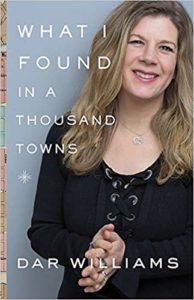 What I Found in a Thousand Towns: A Traveling Musicians Guide to Rebuilding America’s Communities – One Coffee Shop, Dog Run, and Open-Mike Night at a Time Dar Williams (Basic Books) $27.00 OUR SALE PRICE = $21.60 We’ve carried the great Dar Williams’ music for years – yes, we still stock CDs – and when we heard she had a book coming out, I was excited. She is articulate, has a good eye for that curious detail, and is known as an environmental spokesperson. She cares about things that matter and has sung beautiful about life in our hurting world. (The New York Times review said this book was more a report from the Green party than the green room. Nice!)
What I Found in a Thousand Towns: A Traveling Musicians Guide to Rebuilding America’s Communities – One Coffee Shop, Dog Run, and Open-Mike Night at a Time Dar Williams (Basic Books) $27.00 OUR SALE PRICE = $21.60 We’ve carried the great Dar Williams’ music for years – yes, we still stock CDs – and when we heard she had a book coming out, I was excited. She is articulate, has a good eye for that curious detail, and is known as an environmental spokesperson. She cares about things that matter and has sung beautiful about life in our hurting world. (The New York Times review said this book was more a report from the Green party than the green room. Nice!)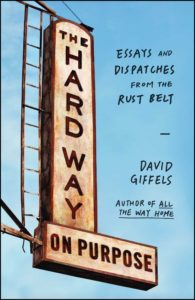 The Hard Way on Purpose: Essays and Dispatches from the Rust Belt David Giffels (Scribner Book Company) $16.00 OUR SALE PRICE = $12.80 Perhaps you recall that we named as one of my favorite books this past year the fabulously interesting, engaging memoir Furnishing Eternity: A Father, a Son, a Coffin, and a Measure of Life, a memoir about a guy in Akron, Ohio, who is a writer, community college teacher, and who is a bit of a wood-worker – he had written a previous memoir about fixing up his old house called All the Way Home: Building a Family in a Falling-Down House – who is making a casket with his engineer/ woodworking father. It is a book about small towns, about rock and roll, about father-son stuff, the lost arts of working with your hands, and a lot about the grief he experiences as he loses his best friend and beloved mother. It was a near prefect book for me – a memoir of a middle-aged guy with rock sensibilities, an irreverent streak, and a colorful, religious family. Building a coffin. What a great book!
The Hard Way on Purpose: Essays and Dispatches from the Rust Belt David Giffels (Scribner Book Company) $16.00 OUR SALE PRICE = $12.80 Perhaps you recall that we named as one of my favorite books this past year the fabulously interesting, engaging memoir Furnishing Eternity: A Father, a Son, a Coffin, and a Measure of Life, a memoir about a guy in Akron, Ohio, who is a writer, community college teacher, and who is a bit of a wood-worker – he had written a previous memoir about fixing up his old house called All the Way Home: Building a Family in a Falling-Down House – who is making a casket with his engineer/ woodworking father. It is a book about small towns, about rock and roll, about father-son stuff, the lost arts of working with your hands, and a lot about the grief he experiences as he loses his best friend and beloved mother. It was a near prefect book for me – a memoir of a middle-aged guy with rock sensibilities, an irreverent streak, and a colorful, religious family. Building a coffin. What a great book!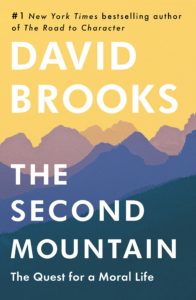 The Second Mountain: The Quest for a Moral Life David Brooks (Random House) $28.00 OUR SALE PRICE = $22.40 We received a somewhat early edition of this and have been working through it bit by bit. I am a huge David Brooks fan, and appreciate his lucid and eloquent speaking and writing. I know those who are serious progressives distrust him since he is often pitched as the conservative voice on NPR or PBS. Conversely, some of my conservative friends roll their eyes when they think of David as a conservative, since they think he is way too liberal. In this regard he seems akin to another favorite pundit, The Washington Post’s Michael Gerson.
The Second Mountain: The Quest for a Moral Life David Brooks (Random House) $28.00 OUR SALE PRICE = $22.40 We received a somewhat early edition of this and have been working through it bit by bit. I am a huge David Brooks fan, and appreciate his lucid and eloquent speaking and writing. I know those who are serious progressives distrust him since he is often pitched as the conservative voice on NPR or PBS. Conversely, some of my conservative friends roll their eyes when they think of David as a conservative, since they think he is way too liberal. In this regard he seems akin to another favorite pundit, The Washington Post’s Michael Gerson.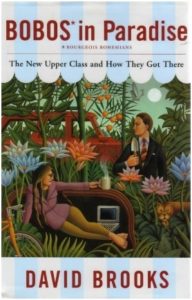
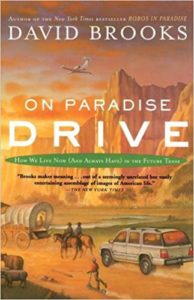 I loved Brooks’ early books like the essential Bobos in Paradise and the fantastic one about suburban fascination with yards, On Paradise Drive. Of course we stock them both, not to mention The Social Animal and The Road to Character. But this new one is truly extraordinary, catapulting Brooks, I would think, into the major ranks of being a thoughtful, accessible, public intellectual rooted in the Christian tradition.
I loved Brooks’ early books like the essential Bobos in Paradise and the fantastic one about suburban fascination with yards, On Paradise Drive. Of course we stock them both, not to mention The Social Animal and The Road to Character. But this new one is truly extraordinary, catapulting Brooks, I would think, into the major ranks of being a thoughtful, accessible, public intellectual rooted in the Christian tradition.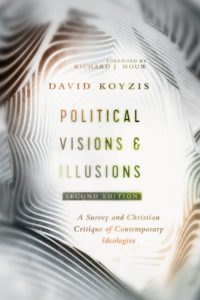 Political Visions & Illusions: A Survey & Christian Critique of Contemporary Ideologies (2ND Edition) David Koyzis (foreword by Richard Mouw) (IVP Academic) $33.00 OUR SALE PRICE = $26.40 I have maintained since the first edition of this learned and exceptional book came out in 2003 that it is nothing short of essential for those wishing to think deeply and Christianly about faith and political life. In my first BookNotes review of it, I summoned Bible texts about the mind of Christ, about not being “taken captive” by worldy ideologies, about being “non-conformed” to the ways of this world through having a “renewed mind.” I hope you know those texts. The Bible is clear that we are to “take every thought captive” and as Al Wolters first taught me, the Greek word in Colossians 2:8 (similarly to 2 Corinthians 10:5) does not mean merely any bad thoughts – like take captive our propensity to lust or anger or envy, but theories. That is, we shouldn’t be taken captive by theories or ideas that are not themselves consistent with a Biblical view of reality.
Political Visions & Illusions: A Survey & Christian Critique of Contemporary Ideologies (2ND Edition) David Koyzis (foreword by Richard Mouw) (IVP Academic) $33.00 OUR SALE PRICE = $26.40 I have maintained since the first edition of this learned and exceptional book came out in 2003 that it is nothing short of essential for those wishing to think deeply and Christianly about faith and political life. In my first BookNotes review of it, I summoned Bible texts about the mind of Christ, about not being “taken captive” by worldy ideologies, about being “non-conformed” to the ways of this world through having a “renewed mind.” I hope you know those texts. The Bible is clear that we are to “take every thought captive” and as Al Wolters first taught me, the Greek word in Colossians 2:8 (similarly to 2 Corinthians 10:5) does not mean merely any bad thoughts – like take captive our propensity to lust or anger or envy, but theories. That is, we shouldn’t be taken captive by theories or ideas that are not themselves consistent with a Biblical view of reality.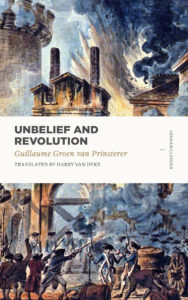 his own immersion in the profoundly Biblical political science of the likes of Groen van Prinsterer, the brilliant and feisty anti-French Revolutionary social theorist who framed much of the Christian political party that eventually came to be led by Prime Minister Abraham Kuyper in early 20th century Holland. That is, van Prinsterer (we have the new edition of his classic Unbelief and Revolution newly translated by Harry Van Dyke and re-issued by Lexham Press; $15.99) was the main intellectual leader behind Kuyper’s movement.
his own immersion in the profoundly Biblical political science of the likes of Groen van Prinsterer, the brilliant and feisty anti-French Revolutionary social theorist who framed much of the Christian political party that eventually came to be led by Prime Minister Abraham Kuyper in early 20th century Holland. That is, van Prinsterer (we have the new edition of his classic Unbelief and Revolution newly translated by Harry Van Dyke and re-issued by Lexham Press; $15.99) was the main intellectual leader behind Kuyper’s movement.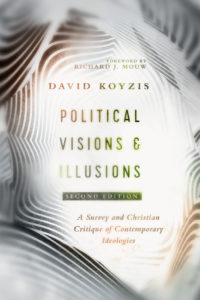 science, Koyzis is a help in this for those interested enough in working through a major book like this. Certainly anyone in public office or working for campaigns or interested in public affairs needs this sort of resource. It is less sprawling than Suicide of the West, the best seller by Jonah Goldberg (who makes no pretenses of trying to nurture a Christian perspective), but if one has interest in this sort of thing, Political Dreams and Illusions is your book.
science, Koyzis is a help in this for those interested enough in working through a major book like this. Certainly anyone in public office or working for campaigns or interested in public affairs needs this sort of resource. It is less sprawling than Suicide of the West, the best seller by Jonah Goldberg (who makes no pretenses of trying to nurture a Christian perspective), but if one has interest in this sort of thing, Political Dreams and Illusions is your book.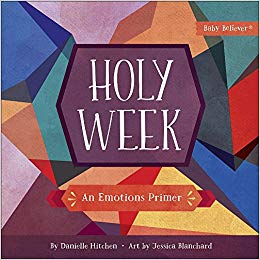 Holy Week: An Emotions Primer Danielle Hitchen art by Jessica Blanchard (Harvest House) $12.99 I have rarely been so glad, and frankly surprised, by a board book; this new one called Holy Week is part of a several book series called “Baby Believer.” Maybe that sounds a little corny to your liturgical ears, but these are wonderful books for infants (and maybe up to 4 or 5 years old or so.) Each one has Bible episode or verse, linked to something that is also being taught. For instance, Let There Be
Holy Week: An Emotions Primer Danielle Hitchen art by Jessica Blanchard (Harvest House) $12.99 I have rarely been so glad, and frankly surprised, by a board book; this new one called Holy Week is part of a several book series called “Baby Believer.” Maybe that sounds a little corny to your liturgical ears, but these are wonderful books for infants (and maybe up to 4 or 5 years old or so.) Each one has Bible episode or verse, linked to something that is also being taught. For instance, Let There Be  Basics is called A Counting Primer; we love the one called From Eden to Bethlehem: An Animals Primer. There is even one called Psalms of Praise: A
Basics is called A Counting Primer; we love the one called From Eden to Bethlehem: An Animals Primer. There is even one called Psalms of Praise: A 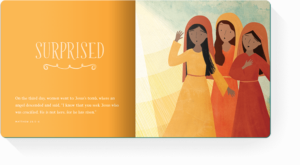 The one we are featuring now, of course, is the one designed to teach the episodes of Holy Week, and it does so brilliantly. Each chunky page tells of something that happened and lists and emotion. You’ve got to see it in it’s full color glory with excellent age-appropriate illustration, but here’s what it shows:
The one we are featuring now, of course, is the one designed to teach the episodes of Holy Week, and it does so brilliantly. Each chunky page tells of something that happened and lists and emotion. You’ve got to see it in it’s full color glory with excellent age-appropriate illustration, but here’s what it shows:
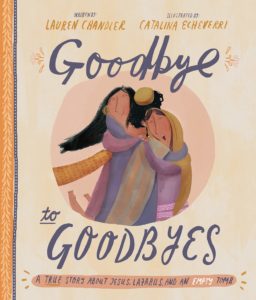 Goodbye to Goodbyes: A True Story About Jesus, Lazarus, and an Empty Tomb Lauren Chandler, illustrated by Catalina Echeverri (The Good Book Company) $14.99 We have highlighted each of the books in this great series, too, and we rejoice that there is a new one, perfect as an Easter gift for young ones ages up to middle elementary ages. Goodbye to Goodbyes is part of a series called “Tales That Tell the Truth” and we love them all. I hope you recall A Christmas Promise or The One O’Clock Miracle or The Storm That Stopped. The recent The Friend Who Forgives is about grace, based on a parable from Jesus. We loved God’s Very Good Idea which shows God’s plan for ethnic and other kinds of diversity in creation, and how God’s plan of redemption includes restoring multi-ethnic reconciliation, never wavering from his “very good” plan. It’s a delight that share the whole gospel — what Lisa Sharon Harper on her adult book calls The Very Good Gospel.
Goodbye to Goodbyes: A True Story About Jesus, Lazarus, and an Empty Tomb Lauren Chandler, illustrated by Catalina Echeverri (The Good Book Company) $14.99 We have highlighted each of the books in this great series, too, and we rejoice that there is a new one, perfect as an Easter gift for young ones ages up to middle elementary ages. Goodbye to Goodbyes is part of a series called “Tales That Tell the Truth” and we love them all. I hope you recall A Christmas Promise or The One O’Clock Miracle or The Storm That Stopped. The recent The Friend Who Forgives is about grace, based on a parable from Jesus. We loved God’s Very Good Idea which shows God’s plan for ethnic and other kinds of diversity in creation, and how God’s plan of redemption includes restoring multi-ethnic reconciliation, never wavering from his “very good” plan. It’s a delight that share the whole gospel — what Lisa Sharon Harper on her adult book calls The Very Good Gospel. 
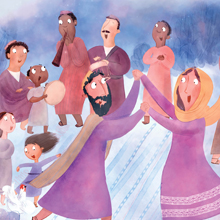 As it says on the back cover, “This is happy, and sad, and (in the end) very happy story of what happened when Jesus visited his friends Mary, Martha, and Lazarus, and changed everything.” Kudos to the whimsical illustrations, the portrayal of people from many ethnicities, energetic illustration that captures the spicy flavor of Middle Eastern culture, and the glimpse to contemporary times.
As it says on the back cover, “This is happy, and sad, and (in the end) very happy story of what happened when Jesus visited his friends Mary, Martha, and Lazarus, and changed everything.” Kudos to the whimsical illustrations, the portrayal of people from many ethnicities, energetic illustration that captures the spicy flavor of Middle Eastern culture, and the glimpse to contemporary times.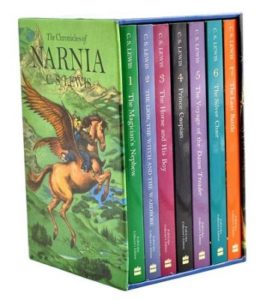 The Chronicles of Narnia C.S. Lewis (Harper) I suppose I don’t have to explain the remarkable stories here, their wonder and joy and sadness and adventure and triumph. Beth and I had the opportunity to sell Lewis books at a Lewis conference in an Episcopal church near Philly a few weeks back and we were enchanted again by being around people who knew so much about Lewis (and the other Inklings) and seeing rekindled enthusiasms for these good stories. It is terribly simplistic, but maybe it would be helpful to be reminded of some of the themes in the Narnia books; here is what Wikipedia says, at least:
The Chronicles of Narnia C.S. Lewis (Harper) I suppose I don’t have to explain the remarkable stories here, their wonder and joy and sadness and adventure and triumph. Beth and I had the opportunity to sell Lewis books at a Lewis conference in an Episcopal church near Philly a few weeks back and we were enchanted again by being around people who knew so much about Lewis (and the other Inklings) and seeing rekindled enthusiasms for these good stories. It is terribly simplistic, but maybe it would be helpful to be reminded of some of the themes in the Narnia books; here is what Wikipedia says, at least: The nicer paperbacks with better paper and colorized Pauline Baynes art sell for $9.99 or $8.99 each (depending which book) or $64.99 for a boxed set.
The nicer paperbacks with better paper and colorized Pauline Baynes art sell for $9.99 or $8.99 each (depending which book) or $64.99 for a boxed set. The hardbacks sell for $17.99 each (or $120.00 for a boxed set.) The cover art is by 2-time Caldecott medalist David Wiesner and interior illustrations are Pauline Baynes originals.
The hardbacks sell for $17.99 each (or $120.00 for a boxed set.) The cover art is by 2-time Caldecott medalist David Wiesner and interior illustrations are Pauline Baynes originals.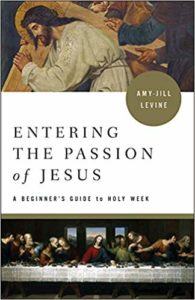 Entering the Passion of Jesus: A Beginner’s Guide to Holy Week Amy-Jill Levine (Abingdon Press) $16.99 You may recall my review of this at the start of Lent… it isn’t written as a daily Lenten devotional, so I was surprised how many people ordered it from us a month ago. I wanted to mention it again since its six chapters would make a great reading plan for Holy Week. It’s just 141 pages and a very good read!
Entering the Passion of Jesus: A Beginner’s Guide to Holy Week Amy-Jill Levine (Abingdon Press) $16.99 You may recall my review of this at the start of Lent… it isn’t written as a daily Lenten devotional, so I was surprised how many people ordered it from us a month ago. I wanted to mention it again since its six chapters would make a great reading plan for Holy Week. It’s just 141 pages and a very good read!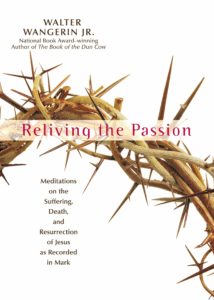 Reliving the Passion: Meditations on the Suffering, Death, and Resurrection of Jesus as Record in Mark Walter Wangerin, Jr. (Zondervan) $14.99 Oh my, this is one of the best Lenten books we know, a careful and moving reflection on Mark’s telling of the passion week story. This offers 41 readings for the season but you could obviously just read the last few weeks as it moves towards Good Friday and Holy Saturday.
Reliving the Passion: Meditations on the Suffering, Death, and Resurrection of Jesus as Record in Mark Walter Wangerin, Jr. (Zondervan) $14.99 Oh my, this is one of the best Lenten books we know, a careful and moving reflection on Mark’s telling of the passion week story. This offers 41 readings for the season but you could obviously just read the last few weeks as it moves towards Good Friday and Holy Saturday.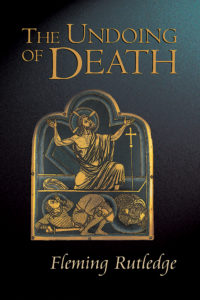 The Undoing of Death Fleming Rutledge (Eerdmans) $24.00 I have described this in better detail other years — almost every year since I was blown away by it in 2003, I believe. If you enjoyed her Advent sermons you will appreciate these as well. These are not Lenten sermons generally, but many year’s worth of Holy Week messages — Palm Sunday sermons, Maundy Thursday reflections, Good Friday words, good, good stuff on Holy Saturday, Easter sermons. This is mature, eloquent, moving, inspiring, collection of real sermons preached by this legendary Episcopal priest. For some chapters there are some art pieces shown on which she helpfully comments. I commend this book to you with all my heart.
The Undoing of Death Fleming Rutledge (Eerdmans) $24.00 I have described this in better detail other years — almost every year since I was blown away by it in 2003, I believe. If you enjoyed her Advent sermons you will appreciate these as well. These are not Lenten sermons generally, but many year’s worth of Holy Week messages — Palm Sunday sermons, Maundy Thursday reflections, Good Friday words, good, good stuff on Holy Saturday, Easter sermons. This is mature, eloquent, moving, inspiring, collection of real sermons preached by this legendary Episcopal priest. For some chapters there are some art pieces shown on which she helpfully comments. I commend this book to you with all my heart.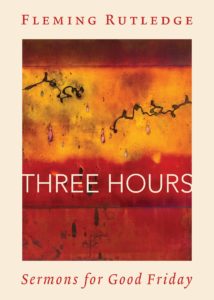 Three Hours: Sermons for Good Friday Fleming Rutledge (Eerdmans) $18.00 Last year, Reverend Rutledge preached seven sermons in a three hour Good Friday sermon. She has published several such sermons in The Undoing of Death and again in the nice little paperback, The Seven
Three Hours: Sermons for Good Friday Fleming Rutledge (Eerdmans) $18.00 Last year, Reverend Rutledge preached seven sermons in a three hour Good Friday sermon. She has published several such sermons in The Undoing of Death and again in the nice little paperback, The Seven 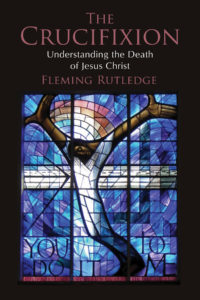 The Crucifixion: Understanding the Death of Jesus Christ Fleming Rutledge (Eerdmans) $30.00 I don’t need to explain this award winning book that (with indexes) weighs in at 665 pages. It is, doubtlessly, one of the major theological books of our time and, by some accounts, one of a handful of must-read books on the cross. It won the Academy of Parish Clergy Reference Book of the Year when it first came out, and the next year it was awarded the Christianity Today Book of the Year. We named it a Hearts & Minds Best Book the year it came out, adding our little voice to the choir of accolades. Roman Catholics, mainline Protestants and evangelicals alike have raved about it, using words like “extraordinary” and “monumental” and “supremely illuminating.”
The Crucifixion: Understanding the Death of Jesus Christ Fleming Rutledge (Eerdmans) $30.00 I don’t need to explain this award winning book that (with indexes) weighs in at 665 pages. It is, doubtlessly, one of the major theological books of our time and, by some accounts, one of a handful of must-read books on the cross. It won the Academy of Parish Clergy Reference Book of the Year when it first came out, and the next year it was awarded the Christianity Today Book of the Year. We named it a Hearts & Minds Best Book the year it came out, adding our little voice to the choir of accolades. Roman Catholics, mainline Protestants and evangelicals alike have raved about it, using words like “extraordinary” and “monumental” and “supremely illuminating.”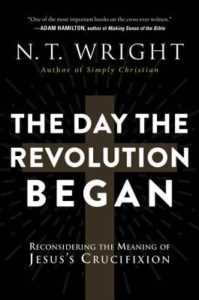 The Day the Revolution Began: Reconsidering the Meaning of Jesus’s Crucifixion N.T. Wright (HarperOne) $18.99 You know we are fans of Tom Wright and we appreciate his careful and lively exegesis framed by a big Kingdom vision. This is Bible exploration for the sake of the churches mission, which itself is for the sake of the world — thanks be to God! As I explained when this came out in hardcover a year or so ago, we might describe this as a study of the cross in light of Wright’s essential book Surprised by Hope. That is, if God’s final agenda is not to whisk us away to some heavenly place beyond the clouds but is, in promissory fashion, restoring the good but fallen world into a (re)new(ed) creation then — with that big restoration/creation-regained project in mind –what is the point of the cross? Wright her looks through the lens of new creation and cosmic restoration at every key passage where the apostle Paul writes about the cross. What is going on in these passages? How might we more fully understand Paul’s insistence that Jesus puts to death, Death? Is it proper to refer to Good Friday as the start of the revolution? I dare you to read this book and not feel your mind stimulated, your heart inspired, and your feet and hands ready to get back to work on Monday morning.
The Day the Revolution Began: Reconsidering the Meaning of Jesus’s Crucifixion N.T. Wright (HarperOne) $18.99 You know we are fans of Tom Wright and we appreciate his careful and lively exegesis framed by a big Kingdom vision. This is Bible exploration for the sake of the churches mission, which itself is for the sake of the world — thanks be to God! As I explained when this came out in hardcover a year or so ago, we might describe this as a study of the cross in light of Wright’s essential book Surprised by Hope. That is, if God’s final agenda is not to whisk us away to some heavenly place beyond the clouds but is, in promissory fashion, restoring the good but fallen world into a (re)new(ed) creation then — with that big restoration/creation-regained project in mind –what is the point of the cross? Wright her looks through the lens of new creation and cosmic restoration at every key passage where the apostle Paul writes about the cross. What is going on in these passages? How might we more fully understand Paul’s insistence that Jesus puts to death, Death? Is it proper to refer to Good Friday as the start of the revolution? I dare you to read this book and not feel your mind stimulated, your heart inspired, and your feet and hands ready to get back to work on Monday morning. 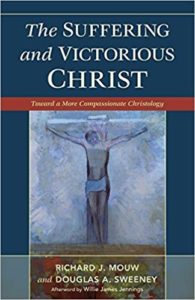 The Suffering and Victorious Christ: Toward a More Compassionate Christology Richard Mouw and Douglas A. Sweeney, with an afterword by Willie James Jennings (Eerdmans) $19.99 In the last BookNotes blog newsletter I highlighted a fabulous, readable, conversational rumination on evangelical theology called Restless Faith by Richard J. Mouw. I noted how widely read and conversant he is in many faith traditions, how he is generous in taking seriously the proposals and insights of those outside of his own Reformed camp, and is a good conversation partner, learning and growing from others as he seeks theological (and social) common ground. I might have said that he is restless not in an itchy or cynical way, but in a generous sort of open way, always eager to reform, to mature, to give an account for stuff we learn as we live in God’s world.
The Suffering and Victorious Christ: Toward a More Compassionate Christology Richard Mouw and Douglas A. Sweeney, with an afterword by Willie James Jennings (Eerdmans) $19.99 In the last BookNotes blog newsletter I highlighted a fabulous, readable, conversational rumination on evangelical theology called Restless Faith by Richard J. Mouw. I noted how widely read and conversant he is in many faith traditions, how he is generous in taking seriously the proposals and insights of those outside of his own Reformed camp, and is a good conversation partner, learning and growing from others as he seeks theological (and social) common ground. I might have said that he is restless not in an itchy or cynical way, but in a generous sort of open way, always eager to reform, to mature, to give an account for stuff we learn as we live in God’s world.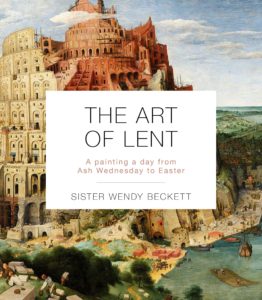 The Art of Lent: A Painting a Day from Ash Wednesday to Easter Sister Wendy Beckett (SPCK) $15.00 This little book, wonderfully printed on heavy paper and full color reproduction, at such a nice price, is, I’ve often said, the best bargain of any book published in recent years. What a great resource this is — so nicely done (if, granted, a bit small.) Okay, so you missed the wonderful opportunity to use this for the last 30 days. You can use it this next week or so, and I am sure you’ll draw on it over and over. We sold a lot of this one last year, and some have re-ordered. Some who loved the Advent one got the Lent on (a “no-brainer” somebody said.) We’re happy to remind you of it again. Get it now, on sale.
The Art of Lent: A Painting a Day from Ash Wednesday to Easter Sister Wendy Beckett (SPCK) $15.00 This little book, wonderfully printed on heavy paper and full color reproduction, at such a nice price, is, I’ve often said, the best bargain of any book published in recent years. What a great resource this is — so nicely done (if, granted, a bit small.) Okay, so you missed the wonderful opportunity to use this for the last 30 days. You can use it this next week or so, and I am sure you’ll draw on it over and over. We sold a lot of this one last year, and some have re-ordered. Some who loved the Advent one got the Lent on (a “no-brainer” somebody said.) We’re happy to remind you of it again. Get it now, on sale.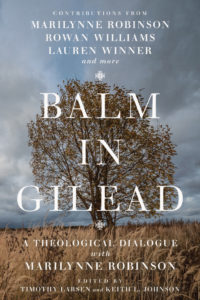 Balm in Gilead: A Theological Dialogue with Marilynne Robinson edited by Timothy Larson & Keith Johnson (IVP Academic) $28.00 Oh my, what a marvelous book, another in the extraordinary collections that are published by IVP from the annual Wheaton College theology conference. Last year the event was a discussion about and with novelists and essayist Marilynne Robinson and it brought together some of our finest thinkers about faith and literature and culture and church and included a response by the notable author herself. (There are contributions here by Rowan Williams and Joel Sheesley and Lauren Winner and Timothy George and others.) This book is the next best thing to being there at the event, and we are so, so happy to get to announce it here. I trust you get the allusion in the title to the Pulitzer Prize winning novel, Robinson’s second, Gilead.
Balm in Gilead: A Theological Dialogue with Marilynne Robinson edited by Timothy Larson & Keith Johnson (IVP Academic) $28.00 Oh my, what a marvelous book, another in the extraordinary collections that are published by IVP from the annual Wheaton College theology conference. Last year the event was a discussion about and with novelists and essayist Marilynne Robinson and it brought together some of our finest thinkers about faith and literature and culture and church and included a response by the notable author herself. (There are contributions here by Rowan Williams and Joel Sheesley and Lauren Winner and Timothy George and others.) This book is the next best thing to being there at the event, and we are so, so happy to get to announce it here. I trust you get the allusion in the title to the Pulitzer Prize winning novel, Robinson’s second, Gilead. 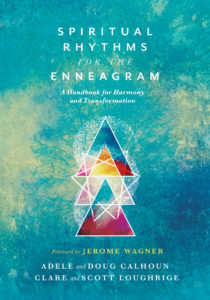 Spiritual Rhythms for the Enneagram: A Handbook for Harmony and Transformation Adele & Doug Calhoun and Clare & Scott Loughrige (IVP/formatio) $24.00 Holy smokes, just when you thought there were enough books on the enneagram and faith formation (well, unless your a 5, and then you can’t get enough) here comes a workbook-sized manual by remarkable folks gifted in creating great resources. (Adele Calhoun did the incredibly useful Spiritual Disciplines Handbook and the powerful, poetic Invitations to God.) Clare and Scott are cofounders of a church where they’ve served for twenty-six years and they are, like the Calhoun’s, are certified Enneagram instructors. In large print on the back it says “You are more than your type.” Hear, hear.
Spiritual Rhythms for the Enneagram: A Handbook for Harmony and Transformation Adele & Doug Calhoun and Clare & Scott Loughrige (IVP/formatio) $24.00 Holy smokes, just when you thought there were enough books on the enneagram and faith formation (well, unless your a 5, and then you can’t get enough) here comes a workbook-sized manual by remarkable folks gifted in creating great resources. (Adele Calhoun did the incredibly useful Spiritual Disciplines Handbook and the powerful, poetic Invitations to God.) Clare and Scott are cofounders of a church where they’ve served for twenty-six years and they are, like the Calhoun’s, are certified Enneagram instructors. In large print on the back it says “You are more than your type.” Hear, hear.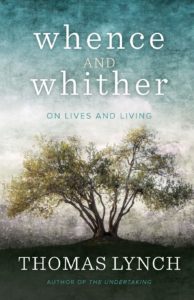 Whence and Whither: On Lives and Living Thomas Lynch (WJK) $18.00 Those who have followed our work for a long time might recall the times, years ago, when I insisted that Lynch was our favorite new writer. His award-winning book The Undertaking: Notes from the Dismal Trade and it’s follow up Bodies at Motion and at Rest helped me when my dad was killed and I was unable to read about grief. But these literary, passionate, deeply moral reflections on being an undertaker blew me away and remain all time favs. His great reflection on his travels to Ireland — Booking Passage and the book he wrote with theologian Thomas Long (The Good Funeral) are stellar. We stock his poetry, too. Because of his groundbreaking work doing solid studies of the role of the “dismal trade” and his splendid writing style, Lynch remains the gold standard in this genre, but lately I’ve read a number of other such books. I loved the spunky Smoke Gets In Your Eyes: And Other Tales from the Crematorium and, last year, Caleb Wilde’s
Whence and Whither: On Lives and Living Thomas Lynch (WJK) $18.00 Those who have followed our work for a long time might recall the times, years ago, when I insisted that Lynch was our favorite new writer. His award-winning book The Undertaking: Notes from the Dismal Trade and it’s follow up Bodies at Motion and at Rest helped me when my dad was killed and I was unable to read about grief. But these literary, passionate, deeply moral reflections on being an undertaker blew me away and remain all time favs. His great reflection on his travels to Ireland — Booking Passage and the book he wrote with theologian Thomas Long (The Good Funeral) are stellar. We stock his poetry, too. Because of his groundbreaking work doing solid studies of the role of the “dismal trade” and his splendid writing style, Lynch remains the gold standard in this genre, but lately I’ve read a number of other such books. I loved the spunky Smoke Gets In Your Eyes: And Other Tales from the Crematorium and, last year, Caleb Wilde’s 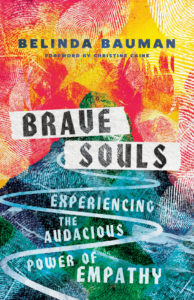 Brave Souls: Experiencing the Audacious Power of Empathy Belinda Bauman (IVP) $23.00 Belinda Bauman is one of our favorite people, even though we’ve only met a few times. You know those rare folks who are confident and honest, who show such interest in you that you realize they have a gift — caring, thoughtful, brave, for real. After a few moments in her presence I was encouraged and blessed and glad. She and her husband, Stephen, have lived all over the world, doing relief and development work and caring for the poor and oppressed in the name of Jesus. As Steven tells it, Belinda was often the energizing force, the one who most readily heard God’s call to risk and serve. They are adventurous people who do excellent work and I’d read anything either of them wrote.
Brave Souls: Experiencing the Audacious Power of Empathy Belinda Bauman (IVP) $23.00 Belinda Bauman is one of our favorite people, even though we’ve only met a few times. You know those rare folks who are confident and honest, who show such interest in you that you realize they have a gift — caring, thoughtful, brave, for real. After a few moments in her presence I was encouraged and blessed and glad. She and her husband, Stephen, have lived all over the world, doing relief and development work and caring for the poor and oppressed in the name of Jesus. As Steven tells it, Belinda was often the energizing force, the one who most readily heard God’s call to risk and serve. They are adventurous people who do excellent work and I’d read anything either of them wrote.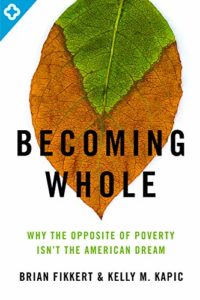 Becoming Whole: Why the Opposite of Poverty Isn’t the American Dream Brian Fikkert & Kelly Kapic (Moody Publishers) $15.99 Why don’t you order a few of these from us right away — it’s that important, and I’ll be mentioning it often this year. I’m sure I will name it as one of the Best Books of 2019. Let me explain.
Becoming Whole: Why the Opposite of Poverty Isn’t the American Dream Brian Fikkert & Kelly Kapic (Moody Publishers) $15.99 Why don’t you order a few of these from us right away — it’s that important, and I’ll be mentioning it often this year. I’m sure I will name it as one of the Best Books of 2019. Let me explain.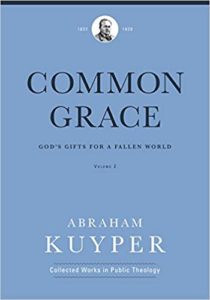 Common Grace: God’s Gifts for a Fallen World Volume 2 Abraham Kuyper (Lexham Press) $54.99 This is the brand new, much-anticipated volume in the ongoing Kuyper publishing project releasing hefty tomes in the “Collected Works in Public Theology.” We stock them gladly as it was in many ways Kuyperians — the fancy word those who stand in the line of the early 20th century Dutch neo-Calvinist cultural leader and public intellectual who reminded us of God’s redemption of “every square inch” of culture and society — who inspired us with a world-and-life vision of faith that led to founding our bookstore the way that it is. That God has given good gifts that can be discerned by artists and scientists and wise ones who are attentive to the glories and structures of creation should be evident; that such wisdom leads to human flourishing by honoring God’s built-in intentions for His creation is a matter of life and death. The best books help us open up and disclose the meaning of history and the point of life in each and every aspect of society. Preacher, theologian, reporter, educator, Prime Minister Kuyper (1837-1920) had much to say about so much of this, positing a set of Christian principles from which might emerge a renewed, just culture (unlike the brutal French Revolution of the previous century) and his old words still speak today. Kudos to those translating his many newspaper essays and lectures and books (sometimes for the first time in English) and for putting them in these handsome, enduring volumes.
Common Grace: God’s Gifts for a Fallen World Volume 2 Abraham Kuyper (Lexham Press) $54.99 This is the brand new, much-anticipated volume in the ongoing Kuyper publishing project releasing hefty tomes in the “Collected Works in Public Theology.” We stock them gladly as it was in many ways Kuyperians — the fancy word those who stand in the line of the early 20th century Dutch neo-Calvinist cultural leader and public intellectual who reminded us of God’s redemption of “every square inch” of culture and society — who inspired us with a world-and-life vision of faith that led to founding our bookstore the way that it is. That God has given good gifts that can be discerned by artists and scientists and wise ones who are attentive to the glories and structures of creation should be evident; that such wisdom leads to human flourishing by honoring God’s built-in intentions for His creation is a matter of life and death. The best books help us open up and disclose the meaning of history and the point of life in each and every aspect of society. Preacher, theologian, reporter, educator, Prime Minister Kuyper (1837-1920) had much to say about so much of this, positing a set of Christian principles from which might emerge a renewed, just culture (unlike the brutal French Revolution of the previous century) and his old words still speak today. Kudos to those translating his many newspaper essays and lectures and books (sometimes for the first time in English) and for putting them in these handsome, enduring volumes.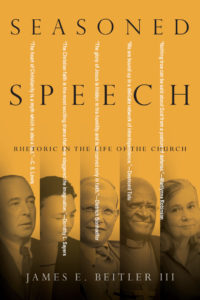 Seasoned Speech: Rhetoric in the Life of the Church James E. Beitler III (IVP Academic) $25.00 Maybe you saw on social media that a week or two ago we sold books at a great C.S. Lewis conference hosted at an Episcopal Church near Philadelphia. With several expert Lewis scholars we had a blast, and a few talked about this seemingly arcane topic that so preoccupied Lewis and his Inklings: rhetoric. In many ways, this is a huge topic — how do we communicate? What makes something compelling? How do we present truth (or what we think is truth) to others? In an age of mass marketing and social media, how do we persuade? Does goodness, beauty and truth go together, and does charm and eloquence and elegance count much in persuading others? What is a Christian view of communication and what might a theologically-aware framework offer as we think about rhetoric? What does that verse (Colossians 4:6) mean about having our speech “seasoned with salt”? Lewis asked these questions, of course.
Seasoned Speech: Rhetoric in the Life of the Church James E. Beitler III (IVP Academic) $25.00 Maybe you saw on social media that a week or two ago we sold books at a great C.S. Lewis conference hosted at an Episcopal Church near Philadelphia. With several expert Lewis scholars we had a blast, and a few talked about this seemingly arcane topic that so preoccupied Lewis and his Inklings: rhetoric. In many ways, this is a huge topic — how do we communicate? What makes something compelling? How do we present truth (or what we think is truth) to others? In an age of mass marketing and social media, how do we persuade? Does goodness, beauty and truth go together, and does charm and eloquence and elegance count much in persuading others? What is a Christian view of communication and what might a theologically-aware framework offer as we think about rhetoric? What does that verse (Colossians 4:6) mean about having our speech “seasoned with salt”? Lewis asked these questions, of course.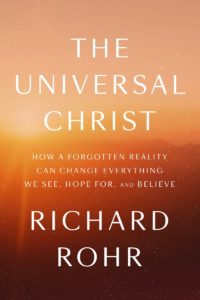 The Universal Christ: How a Forgotten Reality Can Change Everything We See, Hope For, and Belief Richard Rohr (Convergent) $26.00 Okay, I’ll say right away that my announcement here does not do this book justice. As I wrote in my somewhat critical review of Rohr’s previous book, The Divine Dance, I have great appreciation for Father Rohr and his Franciscan sensibilities. His peace and justice activism rooted in a vision where “everything belongs” in the “naked now” means a lot to me. When he cites Merton and the other mystics, I’m truly glad and nicely challenged. I want to like his work; I think I’m we’re often seeking similar vistas but using different words and ways into the experience; as we implied above in announcing the new Kuyper volume on “common grace” I am thrilled by the notion that God upholds all things, inviting us to a sacramental worldview, where we see God’s presence in the mundane and God’s redemptive work all over.
The Universal Christ: How a Forgotten Reality Can Change Everything We See, Hope For, and Belief Richard Rohr (Convergent) $26.00 Okay, I’ll say right away that my announcement here does not do this book justice. As I wrote in my somewhat critical review of Rohr’s previous book, The Divine Dance, I have great appreciation for Father Rohr and his Franciscan sensibilities. His peace and justice activism rooted in a vision where “everything belongs” in the “naked now” means a lot to me. When he cites Merton and the other mystics, I’m truly glad and nicely challenged. I want to like his work; I think I’m we’re often seeking similar vistas but using different words and ways into the experience; as we implied above in announcing the new Kuyper volume on “common grace” I am thrilled by the notion that God upholds all things, inviting us to a sacramental worldview, where we see God’s presence in the mundane and God’s redemptive work all over.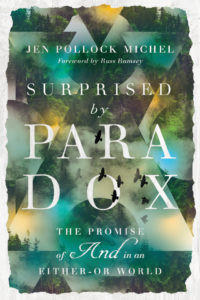 Surprised by Paradox: The Promise of AND in an Either-Or World Jen Pollock Michel (IVP) $16.00 I’m fascinated that there have been four or five (really good) books on paradox in the last year or so, the best coming from evangelical publishing houses like this one. There is afoot a lovely and healthy longing for mystery and a naming of wonder and even for those who want rigorous thinking and generous orthodoxy, they admit that there is a role for ambiguity. Our human categories simply can’t contain all these either/ors. We need the world “and.”
Surprised by Paradox: The Promise of AND in an Either-Or World Jen Pollock Michel (IVP) $16.00 I’m fascinated that there have been four or five (really good) books on paradox in the last year or so, the best coming from evangelical publishing houses like this one. There is afoot a lovely and healthy longing for mystery and a naming of wonder and even for those who want rigorous thinking and generous orthodoxy, they admit that there is a role for ambiguity. Our human categories simply can’t contain all these either/ors. We need the world “and.”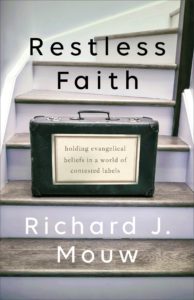 Restless Faith: Holding Evangelical Beliefs in a World of Contested Labels Richard Mouw (Brazos press) $19.99 Okay, I’ll just say it: Mouw is my favorite writer in the genre of theology — he makes complex stuff really clear and explains why it matters — and is one of the very best (balanced, careful, thoughtful, wise, generous) when it comes to applying classic Reformed theology to the world and its cultures and issues. If he calls himself a Kuyperian, I call myself a Mouw-ist.
Restless Faith: Holding Evangelical Beliefs in a World of Contested Labels Richard Mouw (Brazos press) $19.99 Okay, I’ll just say it: Mouw is my favorite writer in the genre of theology — he makes complex stuff really clear and explains why it matters — and is one of the very best (balanced, careful, thoughtful, wise, generous) when it comes to applying classic Reformed theology to the world and its cultures and issues. If he calls himself a Kuyperian, I call myself a Mouw-ist.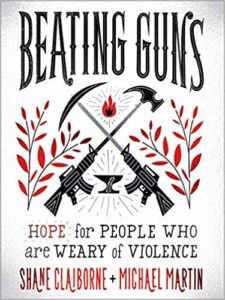 Beating Guns: Hope for People Who Are Weary of Violence Shane Claiborne & Michael Martin (Brazos Press) $19.99 This book has been called “timely, relevant, and necessary.” It is a study of gun violence from the point of view of a simple-living, urban activist. Shane — whose Irresistible Revolution is a must-read and whose Jesus for President grows more timely every day — lives in a brutally rough part of Camden NJ and has experience drive bys and gang violence and police shootings (that is, police shooting his black neighbors) more than probably anybody you know. He grew up a Southern Baptist boy and still retains a vibrant and happy style of speaking about Jesus. I suppose he grows restless as Mouw does, but because he shares life with the wounded and hurting and sees the glories and dignities of the poor, his restlessness is more with apathy and carelessness and those who have denied the basic teachings of Jesus.
Beating Guns: Hope for People Who Are Weary of Violence Shane Claiborne & Michael Martin (Brazos Press) $19.99 This book has been called “timely, relevant, and necessary.” It is a study of gun violence from the point of view of a simple-living, urban activist. Shane — whose Irresistible Revolution is a must-read and whose Jesus for President grows more timely every day — lives in a brutally rough part of Camden NJ and has experience drive bys and gang violence and police shootings (that is, police shooting his black neighbors) more than probably anybody you know. He grew up a Southern Baptist boy and still retains a vibrant and happy style of speaking about Jesus. I suppose he grows restless as Mouw does, but because he shares life with the wounded and hurting and sees the glories and dignities of the poor, his restlessness is more with apathy and carelessness and those who have denied the basic teachings of Jesus.
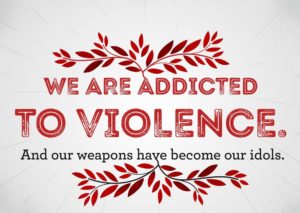 As Shane and Michael say on the back cover, “The world doesn’t have to be this way. Beating Guns shows how we can all be part of the solution.”
As Shane and Michael say on the back cover, “The world doesn’t have to be this way. Beating Guns shows how we can all be part of the solution.”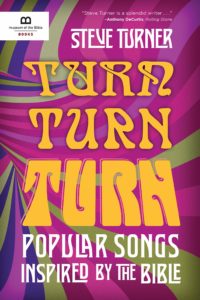 Turn, Turn, Turn: Popular Songs Inspired by the Bible Steve Turner (Worthy Books) $24.99 I have been wanting to tell you about this book for weeks now. Turner is an amazing rock critic and Christian thinker about pop culture. His books should be widely known and shared, especially among younger creative types for whom his work could be a life-line.) Oh how I wish we could sell more of his must-read books Imagine: A
Turn, Turn, Turn: Popular Songs Inspired by the Bible Steve Turner (Worthy Books) $24.99 I have been wanting to tell you about this book for weeks now. Turner is an amazing rock critic and Christian thinker about pop culture. His books should be widely known and shared, especially among younger creative types for whom his work could be a life-line.) Oh how I wish we could sell more of his must-read books Imagine: A 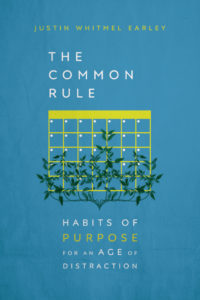 The Common Rule: Habits of Purpose for an Age of Distraction Justin Whitmel Earley (IVP) $18.00 We have lots of books here at the shop about self help sorts of things, from time management resources to books helping you get your house in order. Many are useful, some are more profound than others. None of us want cheap promises or easy answers.
The Common Rule: Habits of Purpose for an Age of Distraction Justin Whitmel Earley (IVP) $18.00 We have lots of books here at the shop about self help sorts of things, from time management resources to books helping you get your house in order. Many are useful, some are more profound than others. None of us want cheap promises or easy answers.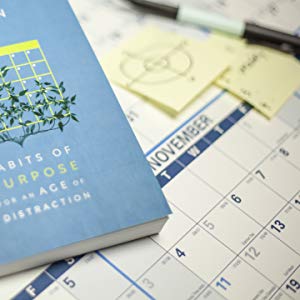 In a way, it is fair to say that this is a practical application follow-up to James K.A. Smith’s award-winning, very widely read You Are What You Love: The Spiritual Power of Habits. Listen to Andy Crouch, author most recently of Tech Wise Family and Strong and Weak:
In a way, it is fair to say that this is a practical application follow-up to James K.A. Smith’s award-winning, very widely read You Are What You Love: The Spiritual Power of Habits. Listen to Andy Crouch, author most recently of Tech Wise Family and Strong and Weak: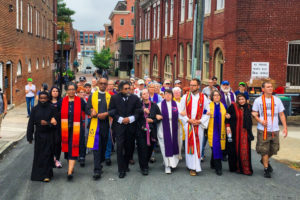 2018 saw a good number of very important, interesting, and useful books on the themes of racial injustice, racism, Biblical justice, Christian reconciliation, urban ministry issues and the like. From moving memoirs to incisive critiques to books offering missional vision and programmatic application, we have seen so many new titles on this topic that we wanted to thank the publishers (and authors) for their commitments to doing this kind of risky publishing. (Risky, because, of course, often these books languish on the shelves. In fact, I’m told many of our fellow-Christian booksellers simply don’t carry many of these sorts.) Many faith-based publishers have done good stuff and just when one is tempted to think that we hardly need more books on this vexing topic, these great reads prove otherwise. We hope you vote with your dollars and purchase some, sending the message to the publishers that we indeed need these kinds of resources.
2018 saw a good number of very important, interesting, and useful books on the themes of racial injustice, racism, Biblical justice, Christian reconciliation, urban ministry issues and the like. From moving memoirs to incisive critiques to books offering missional vision and programmatic application, we have seen so many new titles on this topic that we wanted to thank the publishers (and authors) for their commitments to doing this kind of risky publishing. (Risky, because, of course, often these books languish on the shelves. In fact, I’m told many of our fellow-Christian booksellers simply don’t carry many of these sorts.) Many faith-based publishers have done good stuff and just when one is tempted to think that we hardly need more books on this vexing topic, these great reads prove otherwise. We hope you vote with your dollars and purchase some, sending the message to the publishers that we indeed need these kinds of resources.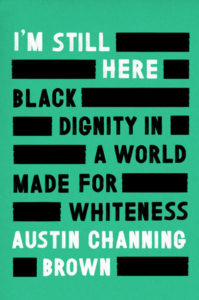 I’m Still Here: Black Dignity in a World Made for Whiteness Austin Channing Brown (Convergent) $25.00 This has been our big selling book on the topic since it came out in the Spring of 2018. We promoted it early on and a number of book clubs, readers, churches, ministries and organizations of used it. Simply put, I’m Still Here is one of the very Best Books of 2018 and we highly recommend this moving memoir of a young Christian woman who has particularly been involved in white middle-class evangelicalism. She tells us what it has been like for her and I am sure many will enjoy, be moved by, be horrified by, and be changed by her brave telling of her own story. Very highly recommended.
I’m Still Here: Black Dignity in a World Made for Whiteness Austin Channing Brown (Convergent) $25.00 This has been our big selling book on the topic since it came out in the Spring of 2018. We promoted it early on and a number of book clubs, readers, churches, ministries and organizations of used it. Simply put, I’m Still Here is one of the very Best Books of 2018 and we highly recommend this moving memoir of a young Christian woman who has particularly been involved in white middle-class evangelicalism. She tells us what it has been like for her and I am sure many will enjoy, be moved by, be horrified by, and be changed by her brave telling of her own story. Very highly recommended.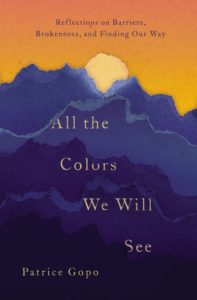 All the Colors We Will See Patrice Gopo (W Publishing Groups) $16.99 We’ve highlighted this several times at BookNotes, and we want to celebrate it again as one of the more interesting books you will find from this past year. What a memoir — a black woman raised in Alaska who then moves to the deep South. There’s all kinds of cross-cultural fiascos, here — some a bit light-hearted, some beautifully and tenderly told, and some horrific. This moves around the issues of race and culture and the questions of how being different effects us. Gopo is a smart, smart woman, a good writer, and she here tells of her marriage and her church and how we think of beauty and brokenness and all kinds of good, good stuff. A lovely blurb on the back from writer Bret Lott reminds us of the high quality of this enjoyable, fine book.
All the Colors We Will See Patrice Gopo (W Publishing Groups) $16.99 We’ve highlighted this several times at BookNotes, and we want to celebrate it again as one of the more interesting books you will find from this past year. What a memoir — a black woman raised in Alaska who then moves to the deep South. There’s all kinds of cross-cultural fiascos, here — some a bit light-hearted, some beautifully and tenderly told, and some horrific. This moves around the issues of race and culture and the questions of how being different effects us. Gopo is a smart, smart woman, a good writer, and she here tells of her marriage and her church and how we think of beauty and brokenness and all kinds of good, good stuff. A lovely blurb on the back from writer Bret Lott reminds us of the high quality of this enjoyable, fine book.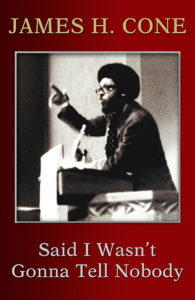 Said I Wasn’t Gonna Tell Nobody James H. Cone (Orbis Books) $28.00 The year of our Lord 2018 saw the passing of brother James Cone, perhaps one of the most important theologians of the late 20th century. His previous, recent book, The Cross and the Lynching Tree continues to sell and transform readers by is powerful prose and insightful, prophetic critique. One need not agree with Cone’s black liberation theology — and there are important books which respond critically to his corpus — to realize how important he was. This book (with a wonderfully poetic foreword by Cornel West — who else?) is the story of his life, his own poetic autobiography that he said he didn’t want to write. But many, many intimate friends and distant readers are glad he did.
Said I Wasn’t Gonna Tell Nobody James H. Cone (Orbis Books) $28.00 The year of our Lord 2018 saw the passing of brother James Cone, perhaps one of the most important theologians of the late 20th century. His previous, recent book, The Cross and the Lynching Tree continues to sell and transform readers by is powerful prose and insightful, prophetic critique. One need not agree with Cone’s black liberation theology — and there are important books which respond critically to his corpus — to realize how important he was. This book (with a wonderfully poetic foreword by Cornel West — who else?) is the story of his life, his own poetic autobiography that he said he didn’t want to write. But many, many intimate friends and distant readers are glad he did.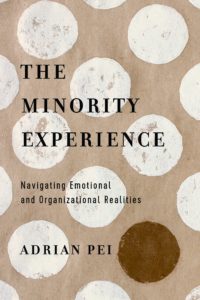 The Minority Experience: Navigating Emotional and Organizational Realities Adrian Pei (IVP) $17.00 I so, so appreciate the above three books that are memoirs of those sharing their own story, using narrative to help folks understand better the life of a person of color in our time and place. Regardless of one’s own ethnicity and race, these books are captivating and often enjoyable to read, joining the writer on her or his journey, hearing them narrate their own life and times. This important book from 2018 tells some of the author’s story, but it is also research based and loaded with good, helpful, valuable information. As Kathy Khang writes, “The Minority Experience is a helpful addition for organizational leaders to grow and deepen their cultural intelligence to include race and ethnicity.”
The Minority Experience: Navigating Emotional and Organizational Realities Adrian Pei (IVP) $17.00 I so, so appreciate the above three books that are memoirs of those sharing their own story, using narrative to help folks understand better the life of a person of color in our time and place. Regardless of one’s own ethnicity and race, these books are captivating and often enjoyable to read, joining the writer on her or his journey, hearing them narrate their own life and times. This important book from 2018 tells some of the author’s story, but it is also research based and loaded with good, helpful, valuable information. As Kathy Khang writes, “The Minority Experience is a helpful addition for organizational leaders to grow and deepen their cultural intelligence to include race and ethnicity.”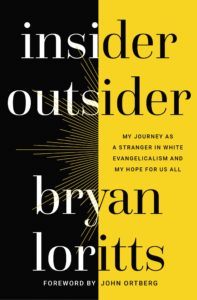 Inside Outsider: My Journey As A Stranger in White Evangelicalism and My Hope for All of Us Bryan Loritts (Zondervan) $17.99 I hope you know Bryan Lorritts — he’s a good, good guy, a fabulous preacher, and a perfect leader to bridge the divide between whites and black, especially between those inside or outside of the evangelical subculture. As a graduate of what is now called Cairne University — previously Philadelphia Bible College — he knows white evangelicalism well. One of my own great heroes, Tom Skinner, from New Jersey, was influential in the Loritts family; Skinner, too, was a great example of a black preacher and evangelist who travelled often in white circles. I met Skinner often in college as he spoke and taught in CCO circles or with his friend Tony Campolo. With a great foreword by John Ortberg, Inside Outsider will be appealing to many of our Hearts & Minds customers since we know many trust and respect Ortberg.
Inside Outsider: My Journey As A Stranger in White Evangelicalism and My Hope for All of Us Bryan Loritts (Zondervan) $17.99 I hope you know Bryan Lorritts — he’s a good, good guy, a fabulous preacher, and a perfect leader to bridge the divide between whites and black, especially between those inside or outside of the evangelical subculture. As a graduate of what is now called Cairne University — previously Philadelphia Bible College — he knows white evangelicalism well. One of my own great heroes, Tom Skinner, from New Jersey, was influential in the Loritts family; Skinner, too, was a great example of a black preacher and evangelist who travelled often in white circles. I met Skinner often in college as he spoke and taught in CCO circles or with his friend Tony Campolo. With a great foreword by John Ortberg, Inside Outsider will be appealing to many of our Hearts & Minds customers since we know many trust and respect Ortberg.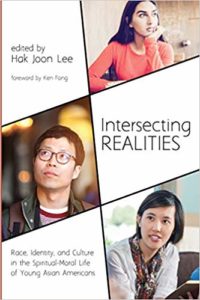 Intersecting Realities: Race, Identity, and Culture in the Spiritual-Moral Life of Young Asian Americans edited by Hak Joon Lee (Wipf & Stock) $23.00 What a fascinating glimpse into Asian American young adults and how complexities of race and ethnicity (and nationality) influences this important rising cohort. There is more pain within Asian American communities than many realize and much hard stuff to deal with as youth transition into the young adult world. This book is a must, therefore, for anyone working campus ministry or who is keeping current with the recent batch of books about contemporary generations and young adult outreach.
Intersecting Realities: Race, Identity, and Culture in the Spiritual-Moral Life of Young Asian Americans edited by Hak Joon Lee (Wipf & Stock) $23.00 What a fascinating glimpse into Asian American young adults and how complexities of race and ethnicity (and nationality) influences this important rising cohort. There is more pain within Asian American communities than many realize and much hard stuff to deal with as youth transition into the young adult world. This book is a must, therefore, for anyone working campus ministry or who is keeping current with the recent batch of books about contemporary generations and young adult outreach.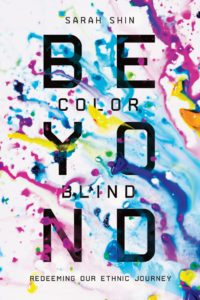 Beyond Colorblind: Redeeming Our Ethnic Journey Sarah Shin (IVP) $16.00 Of course, racism is a sin and our divisions and prejudices are hurtful, but — let’s face it — pretending we are all the same, or saying we “don’t see color” is just dumb. Of course we see color and gender and other things that make us, and our neighbors, who we are. To try not to is, frankly, disrespectful and not a helpful thing to say to a person of color. Some of what we see could be considered wounds, even, but (again, we should say this over and over) race and ethnicity and skin tone and the possibility of unique cultural practices are not part of what theologians call “the fall” (and sin) but are part of the good, created order. Again, our colors are what God intended. What God calls “very good” in Genesis 1 reverberates down to the realities of our current world, so we can say that color and race and ethnicities are good gifts from a creative God. Racism may be wrong in countless ways, but race, as such, is good.
Beyond Colorblind: Redeeming Our Ethnic Journey Sarah Shin (IVP) $16.00 Of course, racism is a sin and our divisions and prejudices are hurtful, but — let’s face it — pretending we are all the same, or saying we “don’t see color” is just dumb. Of course we see color and gender and other things that make us, and our neighbors, who we are. To try not to is, frankly, disrespectful and not a helpful thing to say to a person of color. Some of what we see could be considered wounds, even, but (again, we should say this over and over) race and ethnicity and skin tone and the possibility of unique cultural practices are not part of what theologians call “the fall” (and sin) but are part of the good, created order. Again, our colors are what God intended. What God calls “very good” in Genesis 1 reverberates down to the realities of our current world, so we can say that color and race and ethnicities are good gifts from a creative God. Racism may be wrong in countless ways, but race, as such, is good.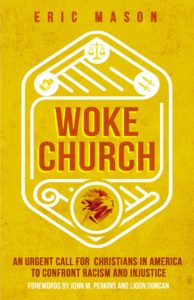 Woke Church: An Urgent Call for Christians in America to Confront Racism and Injustice Eric Mason (Moody Press) $14.99 Oh my, Reverend Mason is a passionate, compelling, voice from urban Philly — we’ve met him at Jubilee at time or two — and while he is non-compromising in his call for the church to become woke, he is regularly engaged with theologically conventional white evangelicals. One could hardly ask for a more dramatic and fun speaker, rooted in contemporary culture and experience and yet fully reliable in conventional theological, Biblical truth. In fact, the very white, seriously Reformed, Dr. Ligon Duncan — who says he’s about “the least ‘woke’ person you could meet” — wrote one of the two forewords (the other is by John Perkins.) This is an urgent call to learn, to care, to rise up. It’s nicely designed, an engaging read. Good stuff. Highly recommended.
Woke Church: An Urgent Call for Christians in America to Confront Racism and Injustice Eric Mason (Moody Press) $14.99 Oh my, Reverend Mason is a passionate, compelling, voice from urban Philly — we’ve met him at Jubilee at time or two — and while he is non-compromising in his call for the church to become woke, he is regularly engaged with theologically conventional white evangelicals. One could hardly ask for a more dramatic and fun speaker, rooted in contemporary culture and experience and yet fully reliable in conventional theological, Biblical truth. In fact, the very white, seriously Reformed, Dr. Ligon Duncan — who says he’s about “the least ‘woke’ person you could meet” — wrote one of the two forewords (the other is by John Perkins.) This is an urgent call to learn, to care, to rise up. It’s nicely designed, an engaging read. Good stuff. Highly recommended.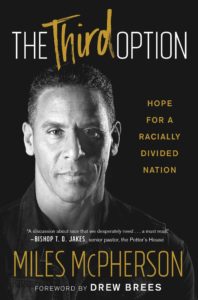 The Third Option: Hope for a Racially Divided Nation Miles McPherson (Howard Books) $26.00 I’m not going to lie — I like Miles McPherson, an upbeat former pro football player turned pastor but I may not have chosen to read this if I wasn’t on a committee considering a book award and was asked to consider it since it has was on a short list. Rev. McPherson is a dynamic communicator, a clear writer, a conventionally inspirational evangelical conference speaker, and as a black man, he surely has sensitivities to racial injustice and social issues. But I didn’t realize he’d have that much to say, or that much beyond “God loves us so in Christ’s Kingdom we should all get along.” We need more profound analysis, better theological depth, and more anguished and passionate writing.
The Third Option: Hope for a Racially Divided Nation Miles McPherson (Howard Books) $26.00 I’m not going to lie — I like Miles McPherson, an upbeat former pro football player turned pastor but I may not have chosen to read this if I wasn’t on a committee considering a book award and was asked to consider it since it has was on a short list. Rev. McPherson is a dynamic communicator, a clear writer, a conventionally inspirational evangelical conference speaker, and as a black man, he surely has sensitivities to racial injustice and social issues. But I didn’t realize he’d have that much to say, or that much beyond “God loves us so in Christ’s Kingdom we should all get along.” We need more profound analysis, better theological depth, and more anguished and passionate writing.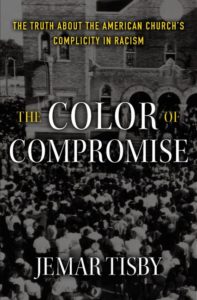 The Color of Compromise: The
The Color of Compromise: The 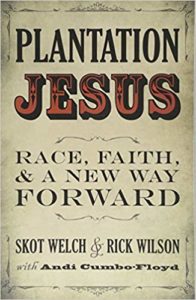 Plantation Jesus: Race, Faith, & A New Way Forward Skot Welch & Rick Wilson with Andi Cumbo-Floyd (Herald Press) $16.99 This, friends, is surely one of the fine and helpful titles of 2018 and is one more example of the many, many good books being done on race and racism. And, further, it’s a great example of the wise and deeply Christian insights offered by Herald Press, a Mennonite-related publishing house. We carry all their new releases and recommend that you pay attention when they do new books.
Plantation Jesus: Race, Faith, & A New Way Forward Skot Welch & Rick Wilson with Andi Cumbo-Floyd (Herald Press) $16.99 This, friends, is surely one of the fine and helpful titles of 2018 and is one more example of the many, many good books being done on race and racism. And, further, it’s a great example of the wise and deeply Christian insights offered by Herald Press, a Mennonite-related publishing house. We carry all their new releases and recommend that you pay attention when they do new books.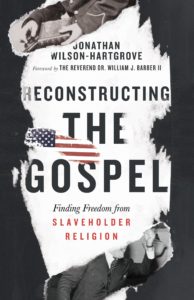 Reconstructing the Gospel: Finding Freedom from Slaveholder Religion Jonathan Wilson-Hartgrove (IVP) $20.00 This good book which released just a year ago, in March of 2018, was one of the volumes that captured many reviewers and had quite a buzz for a bit last Spring. It did want other books this year have done — named the legacy of “American’s Original Sin” and how “slaveholder religion” has not been adequately excised and exorcized from our faith communities. This is a mighty book, important and chilling and powerful. Jonathan, you may recall, came out of Eastern University where he shared a journey somewhat similar to his pal Shane Claiborne. Exposure to healthy evangelical piety and prophetic social critique and a wholistic vision of the Kingdom of God shook his world as he had to re-think his Southern fundamentalist assumptions about church, state, poverty, war, community, mission — and race. Drawn to the ‘new monasticism” he took vows to serve the poor and live simply among those on the margins of the Empire (as they put in their early years.) After years of praying and living and serving among mostly poorer small town folks in the South he has written what may be his most enduring book, inviting us all to find freedom from toxic faith based on white supremacy. It is a remarkable read.
Reconstructing the Gospel: Finding Freedom from Slaveholder Religion Jonathan Wilson-Hartgrove (IVP) $20.00 This good book which released just a year ago, in March of 2018, was one of the volumes that captured many reviewers and had quite a buzz for a bit last Spring. It did want other books this year have done — named the legacy of “American’s Original Sin” and how “slaveholder religion” has not been adequately excised and exorcized from our faith communities. This is a mighty book, important and chilling and powerful. Jonathan, you may recall, came out of Eastern University where he shared a journey somewhat similar to his pal Shane Claiborne. Exposure to healthy evangelical piety and prophetic social critique and a wholistic vision of the Kingdom of God shook his world as he had to re-think his Southern fundamentalist assumptions about church, state, poverty, war, community, mission — and race. Drawn to the ‘new monasticism” he took vows to serve the poor and live simply among those on the margins of the Empire (as they put in their early years.) After years of praying and living and serving among mostly poorer small town folks in the South he has written what may be his most enduring book, inviting us all to find freedom from toxic faith based on white supremacy. It is a remarkable read.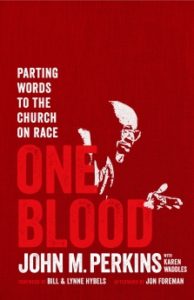 One Blood: Parting Words to the Church on Race and Love John M. Perkins (Moody Press) $15.99 Doubtlessly there are few people who have so influenced American evangelicalism as much as John Perkins. From his 1970s book about being tortured by white cops in Mississippi and his subsequent conversion to Christ (Let Justice Roll Down) to his founding of the Voice of Calvary community and the influential Christian Community Development Association, from his tireless touring and speaking and publishing, Perkins (with a third grade education and several honorary doctorates) has left his mark for the better. To the extent that many evangelicals (despite what the media says) cares about racial justice, poverty, even the redistribution of wealth (one of Perkin’s famous 3 Rs), we have this old saint to thank.
One Blood: Parting Words to the Church on Race and Love John M. Perkins (Moody Press) $15.99 Doubtlessly there are few people who have so influenced American evangelicalism as much as John Perkins. From his 1970s book about being tortured by white cops in Mississippi and his subsequent conversion to Christ (Let Justice Roll Down) to his founding of the Voice of Calvary community and the influential Christian Community Development Association, from his tireless touring and speaking and publishing, Perkins (with a third grade education and several honorary doctorates) has left his mark for the better. To the extent that many evangelicals (despite what the media says) cares about racial justice, poverty, even the redistribution of wealth (one of Perkin’s famous 3 Rs), we have this old saint to thank.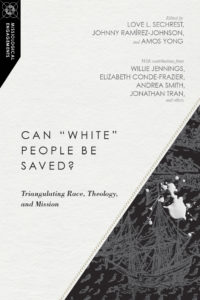 Can “White” People Be Saved? Triangulating Race, Theology, and Mission edited by Love L. Secrest, Johnny Ramirez-Johnson, and Amos Yong with contributions by Willie Jennings, Elizabeth-Conde-Frazer, Andrea Smith, Jonathan Tran, and others (IVP Academic) $30.00 Wow, just the title alone is pretty intense, eh? Of course, there are layers of meaning to the question (not to mention those quotation marks) and even though it is a solidly evangelical publishing house that published this collection of academic pieces, it is serious, prophetic, hard-hitting, and admittedly provocative. For anyone who is keeping current on the more academic studies of faith and race theory and missional justice work, this simple is essential. Let me say that again: essential.
Can “White” People Be Saved? Triangulating Race, Theology, and Mission edited by Love L. Secrest, Johnny Ramirez-Johnson, and Amos Yong with contributions by Willie Jennings, Elizabeth-Conde-Frazer, Andrea Smith, Jonathan Tran, and others (IVP Academic) $30.00 Wow, just the title alone is pretty intense, eh? Of course, there are layers of meaning to the question (not to mention those quotation marks) and even though it is a solidly evangelical publishing house that published this collection of academic pieces, it is serious, prophetic, hard-hitting, and admittedly provocative. For anyone who is keeping current on the more academic studies of faith and race theory and missional justice work, this simple is essential. Let me say that again: essential.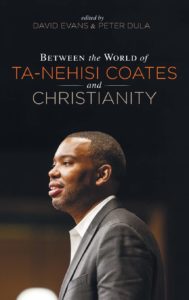 Between the World of Ta-Nehisi Coates and Christianity edited by David Evans & Peter Dula (Cascade Books) $17.00 As many readers of BookNotes know, Coates has been perhaps the most important public intellectual writing profoundly about racism in our culture in many years. We’ve long carried his moving memoir about growing up in Baltimore, The Beautiful Struggle. He became famous as a journalist (and many of his previously published pieces from places such as The Atlantic were published in the must-have collection from 2017 We Were Eight Years in
Between the World of Ta-Nehisi Coates and Christianity edited by David Evans & Peter Dula (Cascade Books) $17.00 As many readers of BookNotes know, Coates has been perhaps the most important public intellectual writing profoundly about racism in our culture in many years. We’ve long carried his moving memoir about growing up in Baltimore, The Beautiful Struggle. He became famous as a journalist (and many of his previously published pieces from places such as The Atlantic were published in the must-have collection from 2017 We Were Eight Years in 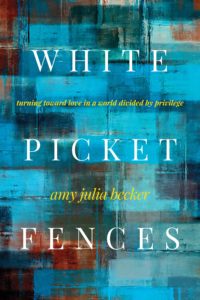 White Picket Fences: Turning Toward
White Picket Fences: Turning Toward 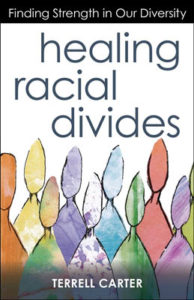 Healing Racial Divides: Finding Strength in our Diversity Terrell Carter (Chalice Press) $19.99 This thin book is concise and potent and very useful. In a no-nonsense style, Rev. Dr. Carter — a St. Louis pastor, seminary professor, former police officer, and now Director of Contextualized Learning at Central Baptist Seminary in Shawnee, Kansas — shows us how to bring awareness and strategies for helping congregations discern what they can do. There’s some personal narrative, some global thinking, some Bible teaching and a whole lot of good sense, learned the hard way. Carter draws on legendary, important black thinkers such as James Cone and Gayraud Wilmore and respected contemporary practitioners like Jospeh Brandt and Kristen Du Mez and Michael Emerson. Perfect for those who want to hear a somewhat progressive voice of a historic black Baptist. There is a free study guide available for download at the publishers’s website.
Healing Racial Divides: Finding Strength in our Diversity Terrell Carter (Chalice Press) $19.99 This thin book is concise and potent and very useful. In a no-nonsense style, Rev. Dr. Carter — a St. Louis pastor, seminary professor, former police officer, and now Director of Contextualized Learning at Central Baptist Seminary in Shawnee, Kansas — shows us how to bring awareness and strategies for helping congregations discern what they can do. There’s some personal narrative, some global thinking, some Bible teaching and a whole lot of good sense, learned the hard way. Carter draws on legendary, important black thinkers such as James Cone and Gayraud Wilmore and respected contemporary practitioners like Jospeh Brandt and Kristen Du Mez and Michael Emerson. Perfect for those who want to hear a somewhat progressive voice of a historic black Baptist. There is a free study guide available for download at the publishers’s website.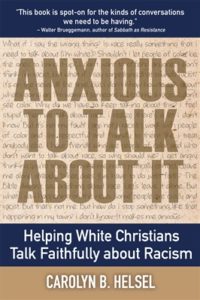 Anxious To Talk About It: Helping White Christians Talk Faithfully about Racism Carolyn Helsel (Chalice Press) $19.99 We are glad for this Presbyterian seminary prof and race training facilitator who has written a very useful tool — award winning, actually. (It was named as a 2018 Book of the Year from the Academy of Parish Clergy, a very prominent award.) Anxious to Talk About It (what a great title!) is a book has been used by mainline denominational groups I know and they have found it very useful, open and fair and inviting. Let’s face it — many white people are overwhelmed when this topic comes up, anxious, indeed. Helsel offers tools to engage racial justice concerns with less fear, more compassion, and more knowledge. We’re impressed and anxious — as in
Anxious To Talk About It: Helping White Christians Talk Faithfully about Racism Carolyn Helsel (Chalice Press) $19.99 We are glad for this Presbyterian seminary prof and race training facilitator who has written a very useful tool — award winning, actually. (It was named as a 2018 Book of the Year from the Academy of Parish Clergy, a very prominent award.) Anxious to Talk About It (what a great title!) is a book has been used by mainline denominational groups I know and they have found it very useful, open and fair and inviting. Let’s face it — many white people are overwhelmed when this topic comes up, anxious, indeed. Helsel offers tools to engage racial justice concerns with less fear, more compassion, and more knowledge. We’re impressed and anxious — as in 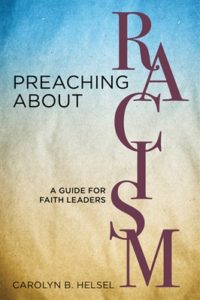 eager — to celebrate it here and invite you to use it. It’s got a lot of really great ideas and guidance for leading discussion groups and workshops and such. (Chalice Press offers a free group leader’s guide, too, at their website.)
eager — to celebrate it here and invite you to use it. It’s got a lot of really great ideas and guidance for leading discussion groups and workshops and such. (Chalice Press offers a free group leader’s guide, too, at their website.)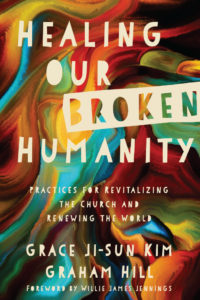 Healing our Broken Humanity: Practices for Revitalizing The Church and Renewing the World Grace Ji-Sun Kim & Graham Hill (IVP) $17.00 Ms Kim is an important scholar and activist and has written other good work but here she shines as she offers an extraordinary, broad and visionary picture of how a renewed (reconciled) church can help bring about restoration and justice for the common good. As we noted when we first announced this in the summer of 2018, this is surely one of the most important books of its kind this year, inviting us to all kinds of fresh ideas and new practices and faithful experiments with how to be peacemaking people, renewed and renewing, for the sake of the world.
Healing our Broken Humanity: Practices for Revitalizing The Church and Renewing the World Grace Ji-Sun Kim & Graham Hill (IVP) $17.00 Ms Kim is an important scholar and activist and has written other good work but here she shines as she offers an extraordinary, broad and visionary picture of how a renewed (reconciled) church can help bring about restoration and justice for the common good. As we noted when we first announced this in the summer of 2018, this is surely one of the most important books of its kind this year, inviting us to all kinds of fresh ideas and new practices and faithful experiments with how to be peacemaking people, renewed and renewing, for the sake of the world.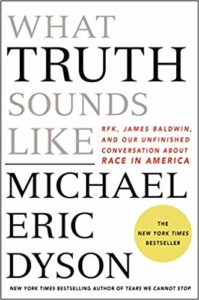 What Truth Sounds Like: RFK, James Baldwin, and our Unfinished Conversation About Race in America Michael Eric Dyson (St. Martin’s Press) $24.99 This compact, chunky-sized, hardback looks and feels like a companion volume to Dyson’s 2017, powerful Tears We Cannot Stop and may be even more important as that one. Of course, we carry almost anything this Philly-based, nationally-revered sociologist and black pastor writes, but What Truth Sounds Like was particularly interesting to me. It ruminates on the “epochal” meeting in the spring of 1963 between Robert Kennedy and James Baldwin. You may have heard of that famous gathering held in Bobby Kennedy’s New York penthouse. Other guests for the conversation included beloved entertainers (and serious civil rights leaders) Harry Belafonte and Lena Horne, playwright Lorraine Hansberry, and a young social activist named Jerome Smith.
What Truth Sounds Like: RFK, James Baldwin, and our Unfinished Conversation About Race in America Michael Eric Dyson (St. Martin’s Press) $24.99 This compact, chunky-sized, hardback looks and feels like a companion volume to Dyson’s 2017, powerful Tears We Cannot Stop and may be even more important as that one. Of course, we carry almost anything this Philly-based, nationally-revered sociologist and black pastor writes, but What Truth Sounds Like was particularly interesting to me. It ruminates on the “epochal” meeting in the spring of 1963 between Robert Kennedy and James Baldwin. You may have heard of that famous gathering held in Bobby Kennedy’s New York penthouse. Other guests for the conversation included beloved entertainers (and serious civil rights leaders) Harry Belafonte and Lena Horne, playwright Lorraine Hansberry, and a young social activist named Jerome Smith.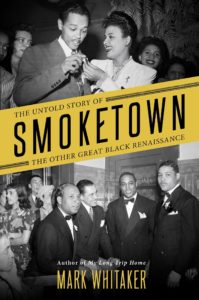 Smoketown: The Other Great Black Renaissance Mark Whitaker (Simon & Schuster) $17.00 This book came out a year ago, but we celebrate it now, here, since the paperback edition came out late in 2018. What a fine, fine work of history — a page-turner, actually — and an extraordinary account of the black culture of mid-20th century Pittsburgh. Here’s the thing: they aren’t kidding when they talk about the Pittsburgh Renaissance in the revered phrase similar to the Harlem Renaissance. I used to live in Pittsburgh — and read the historic black paper, the Pittsburgh Courier sometimes, and had friends deeply involved in life in the famed The Hill district and such, but I had no idea of the stunning breadth of this beautiful, consequential era. From the 1920s to the 1950s so much was happening in the black community in Pittsburgh. Besides the nationally-known aforementioned paper, there were playwrights like August Wilson, two Negro Leagues ball teams, jazz giants, artists, intellectuals, entrepreneurs, a “citadel of black aspiration in music, sports, business, and culture.” What an enticing and wonderfully-written bit of American history this is.
Smoketown: The Other Great Black Renaissance Mark Whitaker (Simon & Schuster) $17.00 This book came out a year ago, but we celebrate it now, here, since the paperback edition came out late in 2018. What a fine, fine work of history — a page-turner, actually — and an extraordinary account of the black culture of mid-20th century Pittsburgh. Here’s the thing: they aren’t kidding when they talk about the Pittsburgh Renaissance in the revered phrase similar to the Harlem Renaissance. I used to live in Pittsburgh — and read the historic black paper, the Pittsburgh Courier sometimes, and had friends deeply involved in life in the famed The Hill district and such, but I had no idea of the stunning breadth of this beautiful, consequential era. From the 1920s to the 1950s so much was happening in the black community in Pittsburgh. Besides the nationally-known aforementioned paper, there were playwrights like August Wilson, two Negro Leagues ball teams, jazz giants, artists, intellectuals, entrepreneurs, a “citadel of black aspiration in music, sports, business, and culture.” What an enticing and wonderfully-written bit of American history this is.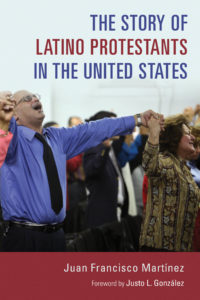 The Story of Latino Protestants in the United States Juan Francisco Martinez (Eerdmans) $28.00 Kudos to Eerdmans for seeing the need for a book like this and to Dr. Martinez, a professor of Hispanic studies and pastoral leadership at Fuller Theological Seminary. He is a fifth-generation American Latino Protestant himself, we learn, and is considered one of the leading experts on the movement and its colorful history.
The Story of Latino Protestants in the United States Juan Francisco Martinez (Eerdmans) $28.00 Kudos to Eerdmans for seeing the need for a book like this and to Dr. Martinez, a professor of Hispanic studies and pastoral leadership at Fuller Theological Seminary. He is a fifth-generation American Latino Protestant himself, we learn, and is considered one of the leading experts on the movement and its colorful history.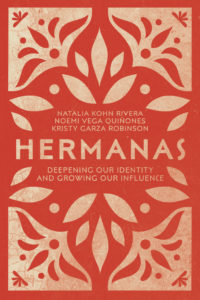 Hermanas: Deepening Our Identity and Growing Our Influence Natalie Kohn, Noemi Vega Quinones & Kristy Harza Robinson (IVP) $16.00 Okay, this is another I am going to stretch the rules just a bit in order to list this here. We received this right at the very end of 2018 — like maybe the second to last day of the year and while it has a formal 2019 copyright, it might have been the last new book we put out in 2018. And so, we’ll formally award it, I’m sure, as one of the Best Books fo 2019, but we’re jumping in early and celebrating it now, too. As we explained early on, this is a book of Biblical study, exploring woman of the Bible through the lenses of thoughtful Latina women today.
Hermanas: Deepening Our Identity and Growing Our Influence Natalie Kohn, Noemi Vega Quinones & Kristy Harza Robinson (IVP) $16.00 Okay, this is another I am going to stretch the rules just a bit in order to list this here. We received this right at the very end of 2018 — like maybe the second to last day of the year and while it has a formal 2019 copyright, it might have been the last new book we put out in 2018. And so, we’ll formally award it, I’m sure, as one of the Best Books fo 2019, but we’re jumping in early and celebrating it now, too. As we explained early on, this is a book of Biblical study, exploring woman of the Bible through the lenses of thoughtful Latina women today.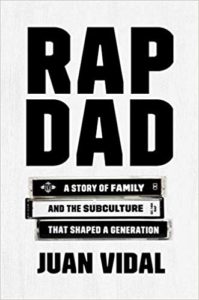 Rap Dad: A Story of
Rap Dad: A Story of 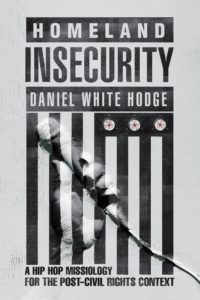 Homeland Insecurity: A Hip-Hop Missiology for the Post-Civil Rights
Homeland Insecurity: A Hip-Hop Missiology for the Post-Civil Rights 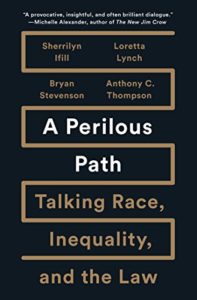 A Perilous Truth: Thinking About Race, Inequality, and the Law (The New Press) $14.99 I am sure almost anyone who reads BookNotes knows how we value the remarkable work of legal aid work of literal life-saver Bryan Stevenson, one of the great legal activists and social reformers of our generation. His Just Mercy (and the 2018 release of a version adapted for youth called
A Perilous Truth: Thinking About Race, Inequality, and the Law (The New Press) $14.99 I am sure almost anyone who reads BookNotes knows how we value the remarkable work of legal aid work of literal life-saver Bryan Stevenson, one of the great legal activists and social reformers of our generation. His Just Mercy (and the 2018 release of a version adapted for youth called 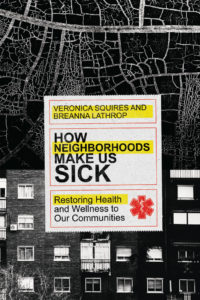 How Neighborhoods Make Us Sick: Restoring Health and Wellness to Our Communities Veronica Squires & Breanna Lathrop (IVP) $17.00 Of course toxic buildings and environmental dangers are not exclusively the plight of those living in parts of cities populated by people of color, but there is a thing called environmental racism, and it is undeniable that those in poorer neighborhoods often people of color, are plagued with bad water and industrial pollution and lead paint and asbestos and the like in levels much worse than wealthier and mostly whiter parts of town. Further, as Squires and Lathrop bravely discuss, even the psychological conditions of living with racial trauma has significant documented health repercussions. (I’m writing this just days after a police officer in Pittsburgh was exonerated for shooting a boy in the back as he was running away; a good friend of mine, a black pastor in ‘the burgh, wrote that he hardly feels safe in his own town.) These troubles — physical, sociological, psychological — impact the health of those living in disadvantaged neighborhoods.
How Neighborhoods Make Us Sick: Restoring Health and Wellness to Our Communities Veronica Squires & Breanna Lathrop (IVP) $17.00 Of course toxic buildings and environmental dangers are not exclusively the plight of those living in parts of cities populated by people of color, but there is a thing called environmental racism, and it is undeniable that those in poorer neighborhoods often people of color, are plagued with bad water and industrial pollution and lead paint and asbestos and the like in levels much worse than wealthier and mostly whiter parts of town. Further, as Squires and Lathrop bravely discuss, even the psychological conditions of living with racial trauma has significant documented health repercussions. (I’m writing this just days after a police officer in Pittsburgh was exonerated for shooting a boy in the back as he was running away; a good friend of mine, a black pastor in ‘the burgh, wrote that he hardly feels safe in his own town.) These troubles — physical, sociological, psychological — impact the health of those living in disadvantaged neighborhoods.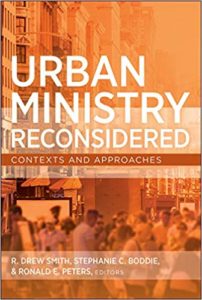 Urban Ministry Reconsidered: Contexts and Approaches (Westminster/John Knox) $40.00 I simply don’t have time and space to do a major review of this and do it justice as it is extraordinary and covers so much ground. Here is what I wrote before at BookNotes when it first came out: Let me just note that if you know anybody who is seriously studying this topic, this is a major anthology, edited by leaders of the Metro-Urban Institute at the Pittsburgh Theological Seminary. These folks have decades of scholarship and practice as theologians and activists. There are chapters on poverty, housing, health, racism, missional church stuff, global insights, and lots more. It is fairly diverse theologically, mostly progressive in terms of social agenda, and pretty scholarly. It advances a number of fresh insights, offers current research and we have a few trusted friends (such as Lisa Slayton & Herb Kolbe of the Pittsburgh Leadership Foundation) who have chapters in it. There is nothing on the topic with so wide a scope on the market — again, further proof that 2018 has been an important year with publishers doing commendable work.
Urban Ministry Reconsidered: Contexts and Approaches (Westminster/John Knox) $40.00 I simply don’t have time and space to do a major review of this and do it justice as it is extraordinary and covers so much ground. Here is what I wrote before at BookNotes when it first came out: Let me just note that if you know anybody who is seriously studying this topic, this is a major anthology, edited by leaders of the Metro-Urban Institute at the Pittsburgh Theological Seminary. These folks have decades of scholarship and practice as theologians and activists. There are chapters on poverty, housing, health, racism, missional church stuff, global insights, and lots more. It is fairly diverse theologically, mostly progressive in terms of social agenda, and pretty scholarly. It advances a number of fresh insights, offers current research and we have a few trusted friends (such as Lisa Slayton & Herb Kolbe of the Pittsburgh Leadership Foundation) who have chapters in it. There is nothing on the topic with so wide a scope on the market — again, further proof that 2018 has been an important year with publishers doing commendable work.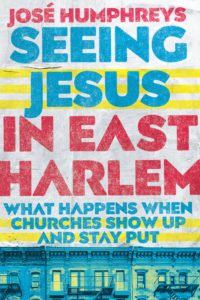 Seeing Jesus in East Harlem: What Happens When Churches Show Up and Stay Put Jose Humphreys (IVP) $16.00 I wrote about this earlier, too, and want to honor it again as a vital and important work from 2018. Here is some of what I said in one of my BookNotes announcements:
Seeing Jesus in East Harlem: What Happens When Churches Show Up and Stay Put Jose Humphreys (IVP) $16.00 I wrote about this earlier, too, and want to honor it again as a vital and important work from 2018. Here is some of what I said in one of my BookNotes announcements: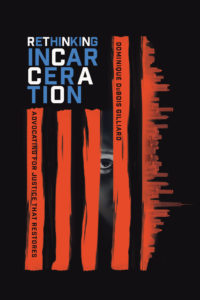 Rethinking Incarceration Advocating for Justice That Restores Dominique Dubois Gilliard (IVP) $18.00 Most aware readers know about what is not called “mass incarceration” and the injustices told in such powerful narratives as Bryan Stevenson’s Just Mercy or The Sun Does Shine: How I Found Freedom on Death Row by Anthony Ray Hinton (surely one of the most moving memoirs and favorite books I read last year.) The classic in this field is The New Jim Crow by Michelle Alexander, that shows in detailed data and much number-crunching, that over and over and over, in state by state by state, people of color arrested for the exact same crime are given much harsher sentences than their white counterparts. This book is so important there have been several books about it and the phrase — the new Jim Crow — is now shorthand for this outrageous and indisputable example of systemic racism.
Rethinking Incarceration Advocating for Justice That Restores Dominique Dubois Gilliard (IVP) $18.00 Most aware readers know about what is not called “mass incarceration” and the injustices told in such powerful narratives as Bryan Stevenson’s Just Mercy or The Sun Does Shine: How I Found Freedom on Death Row by Anthony Ray Hinton (surely one of the most moving memoirs and favorite books I read last year.) The classic in this field is The New Jim Crow by Michelle Alexander, that shows in detailed data and much number-crunching, that over and over and over, in state by state by state, people of color arrested for the exact same crime are given much harsher sentences than their white counterparts. This book is so important there have been several books about it and the phrase — the new Jim Crow — is now shorthand for this outrageous and indisputable example of systemic racism.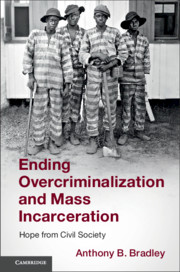 Ending Overcriminalization and Mass Incarceration:
Ending Overcriminalization and Mass Incarceration: 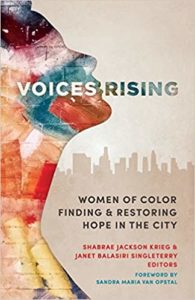 Voices Rising: Women of Color Finding & Restoring Hope in the City edited by Shabrae Jackson Krieg & Janet Balasiri Singleterry (Servant Partners) $15.95 How glad we were when a mail-order customer invited us to check out this classy small press that does books on urban ministry and related mission topics. We ordered most of their books right away and we are thrilled to show them off. This one is just spectacular, a must-read, just-have resource for anyone interested in urban renewal or world missions or the experience of women in Christian ministry.
Voices Rising: Women of Color Finding & Restoring Hope in the City edited by Shabrae Jackson Krieg & Janet Balasiri Singleterry (Servant Partners) $15.95 How glad we were when a mail-order customer invited us to check out this classy small press that does books on urban ministry and related mission topics. We ordered most of their books right away and we are thrilled to show them off. This one is just spectacular, a must-read, just-have resource for anyone interested in urban renewal or world missions or the experience of women in Christian ministry.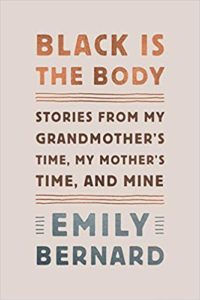 Black Is the Body: Stories From My Grandmother’s Time, My Mother’s Time, and Mine Emily Bernard (Knopf) $25.95 You are just going to have to look the other way at the time stamp or something because this book came out early (very early) in 2019, so it isn’t a Best Book of 2018. But it is so, so good I just can’t not list it here, now. As I look back at all the books I’ve read and those I’ve browsed and those I’ve skimmed and those I’ve studied, there are a lot, old and new. Black is the Body garnered excellent advanced reviews and she is known for being an elegant, important writer. (Her rich and dramatic first book on the Harlem Renaissance (and a cat named Carl Van Vechten) was called “a landmark study” and her Remember Me To Harlem was called by the eminent Henry Louis Gates “a major contribution to our understanding.” Bernard’s writing has been called scrupulous and magnificent.
Black Is the Body: Stories From My Grandmother’s Time, My Mother’s Time, and Mine Emily Bernard (Knopf) $25.95 You are just going to have to look the other way at the time stamp or something because this book came out early (very early) in 2019, so it isn’t a Best Book of 2018. But it is so, so good I just can’t not list it here, now. As I look back at all the books I’ve read and those I’ve browsed and those I’ve skimmed and those I’ve studied, there are a lot, old and new. Black is the Body garnered excellent advanced reviews and she is known for being an elegant, important writer. (Her rich and dramatic first book on the Harlem Renaissance (and a cat named Carl Van Vechten) was called “a landmark study” and her Remember Me To Harlem was called by the eminent Henry Louis Gates “a major contribution to our understanding.” Bernard’s writing has been called scrupulous and magnificent.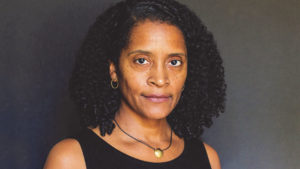

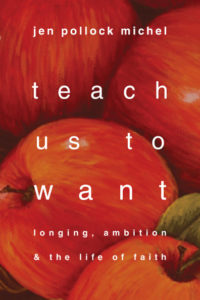 Teach Us to Want: Longing,
Teach Us to Want: Longing, 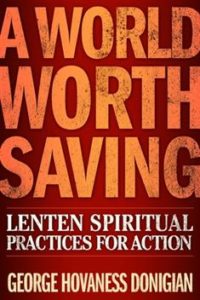 A World Worth
A World Worth  A Way Other Than Our Own: Devotions for Lent Walter Brueggemann (WJK) $13.00 I mentioned Brueggemann and his remarkable Prophetic Imagination. Here is one he wrote a few seasons ago, a short Lenten collection. As the publisher reminds us, “We begin our Lenten journey addressed by the remarkable assurance that the God who summons us is the God who goes along with us.” If I am attending well to this, I can get choked up just reading that line. Of course, this feisty, poetic, scholarly, passionate Old Testament scholar is good on stuff pertaining to times of wilderness and wandering “from newly freed Hebrew slaves in exile to Jesus’s temptation in the desert.” God has always called people out of their safe, walled cities into uncomfortable places, revealing paths they would never have chosen.
A Way Other Than Our Own: Devotions for Lent Walter Brueggemann (WJK) $13.00 I mentioned Brueggemann and his remarkable Prophetic Imagination. Here is one he wrote a few seasons ago, a short Lenten collection. As the publisher reminds us, “We begin our Lenten journey addressed by the remarkable assurance that the God who summons us is the God who goes along with us.” If I am attending well to this, I can get choked up just reading that line. Of course, this feisty, poetic, scholarly, passionate Old Testament scholar is good on stuff pertaining to times of wilderness and wandering “from newly freed Hebrew slaves in exile to Jesus’s temptation in the desert.” God has always called people out of their safe, walled cities into uncomfortable places, revealing paths they would never have chosen.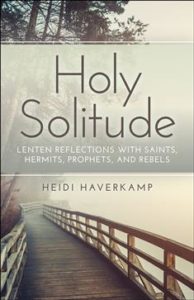 Holy Solitude: Lenten Reflections with Saints, Hermits, Prophets, and Rebels Heidi Haverkamp (Abingdon) $14.00 This is another one we sold well last year and I want to tell about it again. Here is what I wrote a year ago at BookNotes:
Holy Solitude: Lenten Reflections with Saints, Hermits, Prophets, and Rebels Heidi Haverkamp (Abingdon) $14.00 This is another one we sold well last year and I want to tell about it again. Here is what I wrote a year ago at BookNotes: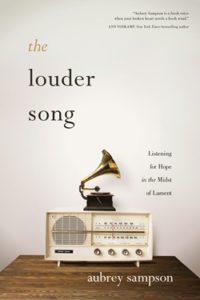 The Louder Song: Listening for Hope in the Midst of Lament Aubrey Sampson (NavPress) $15.99 We were happy to honor this with one of our “Best Books of 2018” awards and we were even happier that it sold at out Jubilee 2019 last week. Well over 3000 college students were hearing about the Lordship of Christ over all of life as they indwell the unfolding story of the Bible of Christ’s Kingdom coming — by telling the story of the goodness of creation, the distortions and pain of the fall, the redemption Christ brings, and the hope for restoration and hope we have as the story moves towards final consummation. I announced this book from the main-stage and exclaimed how moving it is, how it tells of several woman’s serious suffering, and how the Bible teaches about lament… lamenting doesn’t do anything magical, it says, but it can lead us to hope as “God sings a louder song” than suffering does, “a song of renewal and restoration.” This book tells of stress and suffering and outlines in a narrative way a Biblical theology of lament, making it useful for this Lenten season, I’d say.
The Louder Song: Listening for Hope in the Midst of Lament Aubrey Sampson (NavPress) $15.99 We were happy to honor this with one of our “Best Books of 2018” awards and we were even happier that it sold at out Jubilee 2019 last week. Well over 3000 college students were hearing about the Lordship of Christ over all of life as they indwell the unfolding story of the Bible of Christ’s Kingdom coming — by telling the story of the goodness of creation, the distortions and pain of the fall, the redemption Christ brings, and the hope for restoration and hope we have as the story moves towards final consummation. I announced this book from the main-stage and exclaimed how moving it is, how it tells of several woman’s serious suffering, and how the Bible teaches about lament… lamenting doesn’t do anything magical, it says, but it can lead us to hope as “God sings a louder song” than suffering does, “a song of renewal and restoration.” This book tells of stress and suffering and outlines in a narrative way a Biblical theology of lament, making it useful for this Lenten season, I’d say.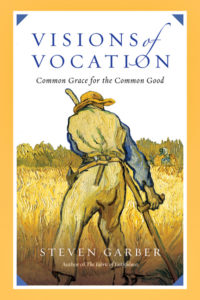 Visions of Vocation: Common Grace for the Common Good Steven Garber (IVP) $17.00 This is not designed for Lent and it is not particularly sad or painful, but it is ideal for those who struggle with the weight of the world, but who want to embrace the goodness of creation (and all the various jobs and callings and careers and tasks that emerge from the possibilities and potentials God ordered into creation, knowing that embracing it all can be both hurtful and rewarding.) We know that there is much broken in this hurting world and most of us live within some tension of how things are and how they are meant to be; we live the “now” of God’s victory and the “not yet” of that future hope when it is fully realized. This is the longing Fleming Rutledge writes so wonderfully about in her Advent sermons and it is the constant theme for Garber. He invites us to this messy, complicated world without growing cynical or jaded.
Visions of Vocation: Common Grace for the Common Good Steven Garber (IVP) $17.00 This is not designed for Lent and it is not particularly sad or painful, but it is ideal for those who struggle with the weight of the world, but who want to embrace the goodness of creation (and all the various jobs and callings and careers and tasks that emerge from the possibilities and potentials God ordered into creation, knowing that embracing it all can be both hurtful and rewarding.) We know that there is much broken in this hurting world and most of us live within some tension of how things are and how they are meant to be; we live the “now” of God’s victory and the “not yet” of that future hope when it is fully realized. This is the longing Fleming Rutledge writes so wonderfully about in her Advent sermons and it is the constant theme for Garber. He invites us to this messy, complicated world without growing cynical or jaded.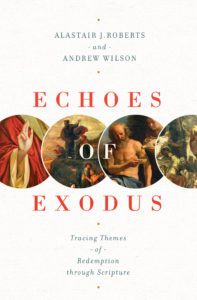 Echoes of Exodus: Tracing Themes of Redemption Through Scripture Alister Roberts & Andrew Wilson (Crossway) $17.99 I reviewed this more extensively in our end of the year “best books of 2018” list in January (or was in February?) I noted that I really appreciated the way it picks up the “echoes of Exodus” and liberation and freedom that keep appearing throughout Scripture. The authors are conservative, Reformed folks but this should appeal to anyone who likes astute Bible study and the big picture of the healing of the cosmos that is the unfolding drama of the whole Bible. Some of their examples of “exodus” themes are pretty obvious and others are creative and generative. I applaud these authors and commend these 20-some chapters, short and potent. It isn’t arranged as a daily devotional, let alone a Lenten one, but if you are like many, you may not need a handy 40 day devo anyway. Pick this up and spend time pondering this pivotal aspect of Scriptural truth.
Echoes of Exodus: Tracing Themes of Redemption Through Scripture Alister Roberts & Andrew Wilson (Crossway) $17.99 I reviewed this more extensively in our end of the year “best books of 2018” list in January (or was in February?) I noted that I really appreciated the way it picks up the “echoes of Exodus” and liberation and freedom that keep appearing throughout Scripture. The authors are conservative, Reformed folks but this should appeal to anyone who likes astute Bible study and the big picture of the healing of the cosmos that is the unfolding drama of the whole Bible. Some of their examples of “exodus” themes are pretty obvious and others are creative and generative. I applaud these authors and commend these 20-some chapters, short and potent. It isn’t arranged as a daily devotional, let alone a Lenten one, but if you are like many, you may not need a handy 40 day devo anyway. Pick this up and spend time pondering this pivotal aspect of Scriptural truth.
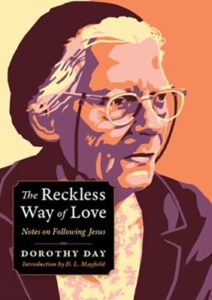
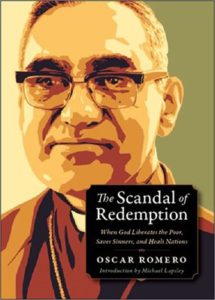
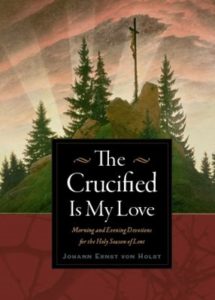 The Crucified Is My Love: Morning and Evening Devotions for the Holy Season of Lent Johann Ernst von Holst (Plough Publishing) $18.00 This came out last year from Plough and should have been more widely celebrated, although the Bruderhof folks are a quiet bunch. Still, the recent publication of this is remarkable; von Holst was a Lutheran pastor in Riga, Latvia (1828 – 1898) and these stirring readings for Lent have been handed down for generations. They are based on the gospel accounts and are exceptional.
The Crucified Is My Love: Morning and Evening Devotions for the Holy Season of Lent Johann Ernst von Holst (Plough Publishing) $18.00 This came out last year from Plough and should have been more widely celebrated, although the Bruderhof folks are a quiet bunch. Still, the recent publication of this is remarkable; von Holst was a Lutheran pastor in Riga, Latvia (1828 – 1898) and these stirring readings for Lent have been handed down for generations. They are based on the gospel accounts and are exceptional. Bread and Wine: Readings for Lent and Easter (Plough Publishing) $24.00 This is a perennial title from Plough and matches nice their popular Advent collection, Watch for the Light
Bread and Wine: Readings for Lent and Easter (Plough Publishing) $24.00 This is a perennial title from Plough and matches nice their popular Advent collection, Watch for the Light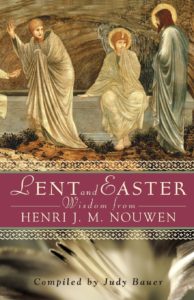 Lent and
Lent and 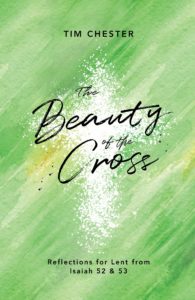 The Beauty of the Cross: Reflections for
The Beauty of the Cross: Reflections for 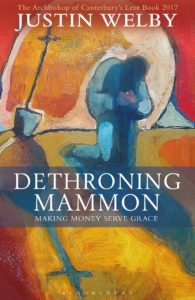 Dethroning Mammon: Making Money Serve Grace: The Archbishop of Canterbury’s Lent Book 2017 Justin Welby (Bloomsbury) $13.95 This was the big Lent book for the Church of England last year and while you may have heard about it, I bet you haven’t seen it around much or reviewed stateside. The Archbishop of Canterbury (formerly Rowan Williams, now Justin Welby) always picks a book for the Church to read during the season of Lent. The following year, then, it is usually released in the States. This is the first time (I think) that the Archbishop actually wrote the annual Lent book.
Dethroning Mammon: Making Money Serve Grace: The Archbishop of Canterbury’s Lent Book 2017 Justin Welby (Bloomsbury) $13.95 This was the big Lent book for the Church of England last year and while you may have heard about it, I bet you haven’t seen it around much or reviewed stateside. The Archbishop of Canterbury (formerly Rowan Williams, now Justin Welby) always picks a book for the Church to read during the season of Lent. The following year, then, it is usually released in the States. This is the first time (I think) that the Archbishop actually wrote the annual Lent book.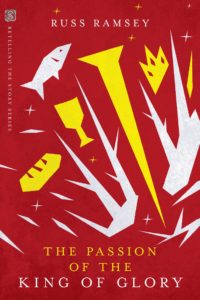 The Passion of the King of Glory Russ Ramsey (InterVarsity Press) $16.00 This book is the second in a trilogy and all three deserve much, much more than I can say here, now. Let me entice you by saying that Ramsey is a creative, colorful, passionate writer. I raved about his near-death memoir — one of the best! — called Struck: Oner Christians Reflections on Encountering Death and I’d read anything else he writes. He is a Reformed pastor, visionary, missional, caring about the gospel and caring about the world. In this set of 40 reflections Ramsey offers retellings of the gospel narratives. It captures the lively and passionate feel of the Bible stories so much so that writer Trillia Newbell says “you’ll wonder if he sat down and spoke with all the people involved in the story.”
The Passion of the King of Glory Russ Ramsey (InterVarsity Press) $16.00 This book is the second in a trilogy and all three deserve much, much more than I can say here, now. Let me entice you by saying that Ramsey is a creative, colorful, passionate writer. I raved about his near-death memoir — one of the best! — called Struck: Oner Christians Reflections on Encountering Death and I’d read anything else he writes. He is a Reformed pastor, visionary, missional, caring about the gospel and caring about the world. In this set of 40 reflections Ramsey offers retellings of the gospel narratives. It captures the lively and passionate feel of the Bible stories so much so that writer Trillia Newbell says “you’ll wonder if he sat down and spoke with all the people involved in the story.”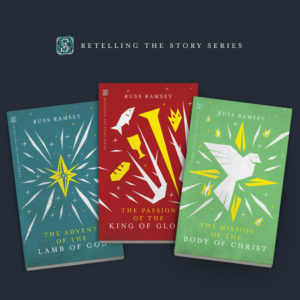 irsthand.
irsthand.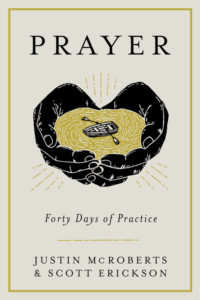 Prayer: Forty Days of Practice Justin McRoberts & Scott Erickson (Waterbrook) $16.99 This is not a Lenten book as such but this would make a great companion for anyone wanting to focus on their inner life for a season. We’ve promoted the previous self published edition and this is one of those rare instances when a big time publisher picks up a volume that was self published. Justin is a great writer, an artist and coach of creatives, and public speaker while Scott is himself deeply read and yet primarily a visual artist. Together they’ve created a book that is full of prompts and ideas and short reflections to help you ponder and pray, all arranged around a set of very contemporary graphic-like art pieces done by Scott the Painter. This invitation to deeper intimacy with God has gotten nothing short of rave reviews by all kinds of folks, from hip hop artists Propaganda (who highlights how the marriage of words and image work) to seminary president Mark Labberton to writer and missional adventure Sarah Thebarge (who calls it “a gift of a book) to Shane Claiborne and many others.
Prayer: Forty Days of Practice Justin McRoberts & Scott Erickson (Waterbrook) $16.99 This is not a Lenten book as such but this would make a great companion for anyone wanting to focus on their inner life for a season. We’ve promoted the previous self published edition and this is one of those rare instances when a big time publisher picks up a volume that was self published. Justin is a great writer, an artist and coach of creatives, and public speaker while Scott is himself deeply read and yet primarily a visual artist. Together they’ve created a book that is full of prompts and ideas and short reflections to help you ponder and pray, all arranged around a set of very contemporary graphic-like art pieces done by Scott the Painter. This invitation to deeper intimacy with God has gotten nothing short of rave reviews by all kinds of folks, from hip hop artists Propaganda (who highlights how the marriage of words and image work) to seminary president Mark Labberton to writer and missional adventure Sarah Thebarge (who calls it “a gift of a book) to Shane Claiborne and many others.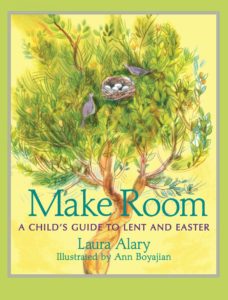 Make Room: A Child’s Guide to Lent and Easter Laura Alary, Illustrated by Ann Boyajian (Paraclete Press) $15.99 Wow, what a wonderful children’s picture book, delightfully illustrated and nicely told. It is an invitation for children to wonder about the Lenten story, helping children to experience Lent with all their senses. They are taught to see it as a special time for creating a “welcoming space for God.” As it says on the back, “Simple activities like cleaning a room, making bread and soup, and inviting a neighbor for supper become acts of justice and kindness, part of a life following Christ.”
Make Room: A Child’s Guide to Lent and Easter Laura Alary, Illustrated by Ann Boyajian (Paraclete Press) $15.99 Wow, what a wonderful children’s picture book, delightfully illustrated and nicely told. It is an invitation for children to wonder about the Lenten story, helping children to experience Lent with all their senses. They are taught to see it as a special time for creating a “welcoming space for God.” As it says on the back, “Simple activities like cleaning a room, making bread and soup, and inviting a neighbor for supper become acts of justice and kindness, part of a life following Christ.”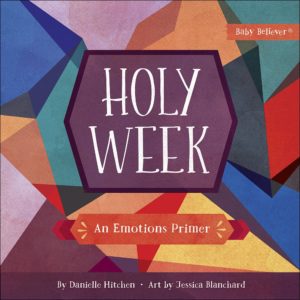 Holy Week: An Emotions Primer board book Danielle Hitchen, illustrated by Jessica Blanchard (Harvest House) $12.99 This has already become one of our best sellers this season and a favorite among our staff. This simple board book does some things that no other book does (as far as we know.) It shows various episodes or characters of holy week and links each to a particular emotion. How interesting! This is part of an excellent series (called “Baby Believers”) which are done in colorful styles, offering a helpful way into many Biblical themes. (One is called From Eden to Bethlehem: An Animals Primer and one is called Psalms of Praise: A Movement Primer and another is Let There Be Light: An Opposites Primer.) These aren’t goofy and they aren’t shallow, even though they are designed for little ones and little hands. Again, this holy week one uses Scripture to teach about emotions. Highly recommended.
Holy Week: An Emotions Primer board book Danielle Hitchen, illustrated by Jessica Blanchard (Harvest House) $12.99 This has already become one of our best sellers this season and a favorite among our staff. This simple board book does some things that no other book does (as far as we know.) It shows various episodes or characters of holy week and links each to a particular emotion. How interesting! This is part of an excellent series (called “Baby Believers”) which are done in colorful styles, offering a helpful way into many Biblical themes. (One is called From Eden to Bethlehem: An Animals Primer and one is called Psalms of Praise: A Movement Primer and another is Let There Be Light: An Opposites Primer.) These aren’t goofy and they aren’t shallow, even though they are designed for little ones and little hands. Again, this holy week one uses Scripture to teach about emotions. Highly recommended.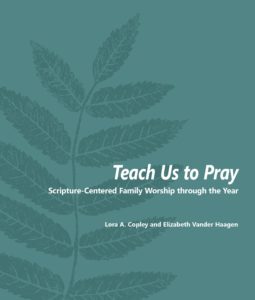 Teach Us To Pray: Scripture Centered Family Worship Through the Year Lora A. Copley & Elizabeth Vander Haagen (Calvin College Press) $29.99 We know this is both pricey and hefty. At almost two inches thick and a big square size (almost 9 x 9 inches) with 864 pages, it is impressive. More impressive is the remarkable two-page spread for each day, clearly offering a pattern of daily devotion under the categories (highlighted by symbolic icons) of Preparing-Inviting-Stilling-Singing-Bible Reading-Dwelling-Praying-Blessing. Teach Us To Pray has some experimental feel, a bit of a liturgical feel, and is wisely construed for families with children wanting to dwell within the ancient church calendar. (There is a very nice, useful several page introduction to all this and a lovely little chart for those needing some quick guidance.) The authors are both ordained CRC pastors and were supported in this project by the Calvin Institute on Christian Worship.
Teach Us To Pray: Scripture Centered Family Worship Through the Year Lora A. Copley & Elizabeth Vander Haagen (Calvin College Press) $29.99 We know this is both pricey and hefty. At almost two inches thick and a big square size (almost 9 x 9 inches) with 864 pages, it is impressive. More impressive is the remarkable two-page spread for each day, clearly offering a pattern of daily devotion under the categories (highlighted by symbolic icons) of Preparing-Inviting-Stilling-Singing-Bible Reading-Dwelling-Praying-Blessing. Teach Us To Pray has some experimental feel, a bit of a liturgical feel, and is wisely construed for families with children wanting to dwell within the ancient church calendar. (There is a very nice, useful several page introduction to all this and a lovely little chart for those needing some quick guidance.) The authors are both ordained CRC pastors and were supported in this project by the Calvin Institute on Christian Worship.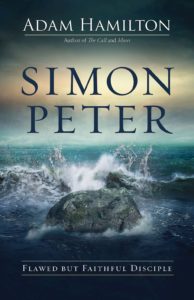
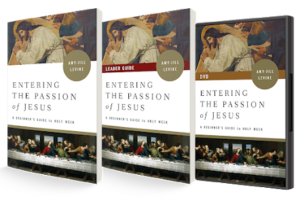 DVD or book Entering the Passion of Jesus: A Beginner’s Guide to Holy Week Amy-Jill Levine (Abingdon Press) paperback book= $16.99; DVD= $39.99; Leader’s Guide for DVD = $12.99
DVD or book Entering the Passion of Jesus: A Beginner’s Guide to Holy Week Amy-Jill Levine (Abingdon Press) paperback book= $16.99; DVD= $39.99; Leader’s Guide for DVD = $12.99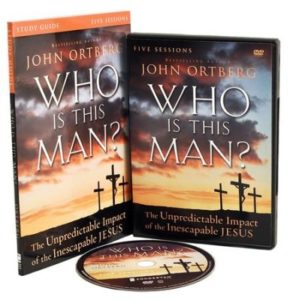 DVD or book Who Is This Man? The Unpredictable Impact of the Inescapable Jesus John Ortberg (Zondervan) paperback book = $16.99 DVD and Leader’s Guide package = $36.99 This isn’t exactly Lenten, but this is a season to consider the impact of Jesus, so wanted to list it. Like the ones above, there’s a few options for this
DVD or book Who Is This Man? The Unpredictable Impact of the Inescapable Jesus John Ortberg (Zondervan) paperback book = $16.99 DVD and Leader’s Guide package = $36.99 This isn’t exactly Lenten, but this is a season to consider the impact of Jesus, so wanted to list it. Like the ones above, there’s a few options for this 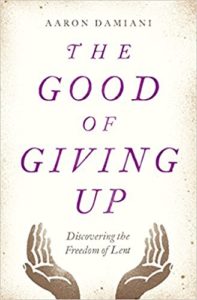 The Good of Giving Up: Discovering the Freedom of Lent Aaron Damiani (Moody) $12.99 I started with a passing reference to “giving something up for Lent.” Here is a book that we’re suggested before for those who are not familiar with (or have some suspicious about) that practice. Written by a conservative evangelical Protestant, it is handsome and nicely done, inviting folks to this classic spiritual practice.
The Good of Giving Up: Discovering the Freedom of Lent Aaron Damiani (Moody) $12.99 I started with a passing reference to “giving something up for Lent.” Here is a book that we’re suggested before for those who are not familiar with (or have some suspicious about) that practice. Written by a conservative evangelical Protestant, it is handsome and nicely done, inviting folks to this classic spiritual practice.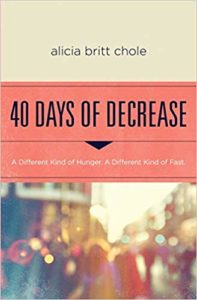 40 Days of Decrease: A Different Kind of Hunger. a Different Kind of Fast. Dr. Alicia Britt Chole (Thomas Nelson) $16.99 This has been a popular one for us, a very interesting and easy read, but yet challenging. It is useful for any time, but maybe is designed for Lent — especially for those that aren’t terribly connected to a liturgical tradition and just want to enter a 40-day experiment. It calls us away from trivial sorts of symbolic gestures and invites us to give up dangerous stuff. And, significantly, it invites us to do so in community, as small groups or families or maybe whole congregations. Wow — this is worth considering!
40 Days of Decrease: A Different Kind of Hunger. a Different Kind of Fast. Dr. Alicia Britt Chole (Thomas Nelson) $16.99 This has been a popular one for us, a very interesting and easy read, but yet challenging. It is useful for any time, but maybe is designed for Lent — especially for those that aren’t terribly connected to a liturgical tradition and just want to enter a 40-day experiment. It calls us away from trivial sorts of symbolic gestures and invites us to give up dangerous stuff. And, significantly, it invites us to do so in community, as small groups or families or maybe whole congregations. Wow — this is worth considering!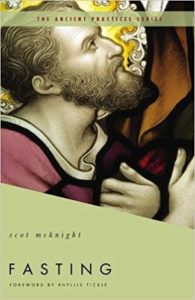 Ancient Practice Series: Fasting Scot McKnight (Thomas Nelson) $12.99 Do you know, or do you maybe recall hearing about, the “Ancient Practice” series that the late Phyllis Tickle put together almost 10 years ago, now. She found authors who could write in ways that were deeply ecumenical, informed by ancient ways, and yet accesible and even upbeat. I loved these books — Dan Allender on sabbath, Robert Benson on fixed hour prayer, one on pilgrimage and one on eucharist and one on the church year and one on tithing. (Interestingly, these are practices shared by Christians, Muslims and Jews.) Anyway, McKnight here has given us one of the most insightful and helpful books about fasting. It’s a good time to read it, no? Very nicely done.
Ancient Practice Series: Fasting Scot McKnight (Thomas Nelson) $12.99 Do you know, or do you maybe recall hearing about, the “Ancient Practice” series that the late Phyllis Tickle put together almost 10 years ago, now. She found authors who could write in ways that were deeply ecumenical, informed by ancient ways, and yet accesible and even upbeat. I loved these books — Dan Allender on sabbath, Robert Benson on fixed hour prayer, one on pilgrimage and one on eucharist and one on the church year and one on tithing. (Interestingly, these are practices shared by Christians, Muslims and Jews.) Anyway, McKnight here has given us one of the most insightful and helpful books about fasting. It’s a good time to read it, no? Very nicely done.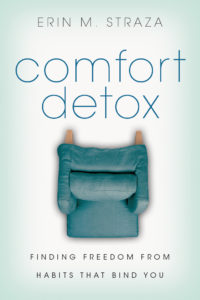 Comfort
Comfort 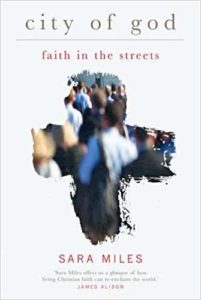 City of God: Faith in the Streets Sara Miles (Jericho Books) $16.00 We love the extraordinary writing and remarkable storytelling of colorful Episcopalian convert and author and activist Sara Miles. We recommend her stunning story of her own unlikely conversion in Take This Bread and the exceptionally moving, feisty, raw book about urban ministry called Jesus Freak: Feeding, Healing, and Raising the Dead. City of God (now out in paperback) is her third since her coming to faith. What a writer! We commend City of God for this time of year, though, because it is a further rumination on her life among the under-resourced in the Bay area of San Francisco, working out of the famously eccentric St. Gregory’s, framed by her experiences on Ash Wednesday, make this a memoir well suited as a Lenten reflection. In fact, most of it is about her ministry of offering ashes out on the streets. Wow.
City of God: Faith in the Streets Sara Miles (Jericho Books) $16.00 We love the extraordinary writing and remarkable storytelling of colorful Episcopalian convert and author and activist Sara Miles. We recommend her stunning story of her own unlikely conversion in Take This Bread and the exceptionally moving, feisty, raw book about urban ministry called Jesus Freak: Feeding, Healing, and Raising the Dead. City of God (now out in paperback) is her third since her coming to faith. What a writer! We commend City of God for this time of year, though, because it is a further rumination on her life among the under-resourced in the Bay area of San Francisco, working out of the famously eccentric St. Gregory’s, framed by her experiences on Ash Wednesday, make this a memoir well suited as a Lenten reflection. In fact, most of it is about her ministry of offering ashes out on the streets. Wow.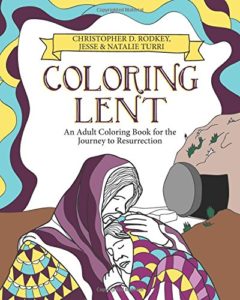 Coloring Lent: An Adult Coloring Book for the Journey to Resurrection Christopher D. Rodkey & Jesse & Natalie Turri (Chalice Press) $12.99 Lastly, I hope you have seen the BookNotes posts we have done about our friend and neighbor, UCC pastor and postmodern theologian, Chris Rodkey, and his three exceptional adult coloring books. Along with some Pennsylvania artist friends, he did an unusually interesting Lenten coloring book for adults that follows the lectionary, called Coloring Lent. Trust me — there is nothing like it. See our earlier review, which is pretty interesting, actually,
Coloring Lent: An Adult Coloring Book for the Journey to Resurrection Christopher D. Rodkey & Jesse & Natalie Turri (Chalice Press) $12.99 Lastly, I hope you have seen the BookNotes posts we have done about our friend and neighbor, UCC pastor and postmodern theologian, Chris Rodkey, and his three exceptional adult coloring books. Along with some Pennsylvania artist friends, he did an unusually interesting Lenten coloring book for adults that follows the lectionary, called Coloring Lent. Trust me — there is nothing like it. See our earlier review, which is pretty interesting, actually,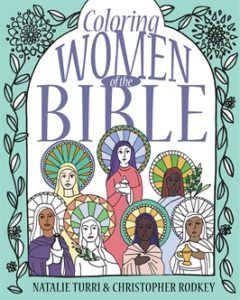 For what it’s worth, Chris and his artist friends did another one called Coloring Advent and also a new one — which you really should check out — called Coloring Women of the Bible (Chalice Press; $14.99.) As I’ve suggested in our reviews of the other two, there is more meat here than meets the eye and the captions and art (kudos to Natalie Turri ) and the footnotes all make for a deeply provocative, learning experience as one takes time to attend to this approach to the Biblical texts.
For what it’s worth, Chris and his artist friends did another one called Coloring Advent and also a new one — which you really should check out — called Coloring Women of the Bible (Chalice Press; $14.99.) As I’ve suggested in our reviews of the other two, there is more meat here than meets the eye and the captions and art (kudos to Natalie Turri ) and the footnotes all make for a deeply provocative, learning experience as one takes time to attend to this approach to the Biblical texts.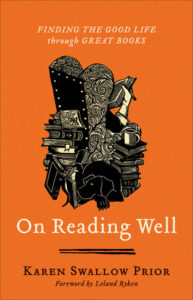 On Reading Well: Finding the Good Life Through Great Books Karen Swallow Prior (Brazos Press) $19.99 I certainly hope you didn’t miss the hullabaloo about this wonderful work this fall. We celebrated it because (a) we love Karen and her other work, such as Booked: Literature in the Soul of Me and her biography called Fierce Convictions: The Extraordinary Life of Hannah More — Poet, Reformer, Abolitionist and (b) because this book is about the value and virtues of reading classic and higher quality literature, and (b) because our good friend from Square Halo Books and World’s End Images, Ned Bustard, did artwork for each chapter. That this book got so much publicity on-line, in newspapers and podcasts and (yes!) here at the shop where we had a wonderful evening hosting her speaking about her passion for books and reading from On Reading Well, is just further indication that this is an important work that resonated with many. Blurbs on the back are from diverse authors such as Jonathan Merritt (who says “her book on books is her best yet… a love letter to literature.), Tish Harrison Warren (who says it is “an exploration of the formative power of stories and an excavation of the life well lived.”), and Russell Moore who says On Reading Well is for those who may at first think reading about reading is for them. He continues, “A significant and powerful work that will refocus discussion on the meaning of reading for spiritual formation.”
On Reading Well: Finding the Good Life Through Great Books Karen Swallow Prior (Brazos Press) $19.99 I certainly hope you didn’t miss the hullabaloo about this wonderful work this fall. We celebrated it because (a) we love Karen and her other work, such as Booked: Literature in the Soul of Me and her biography called Fierce Convictions: The Extraordinary Life of Hannah More — Poet, Reformer, Abolitionist and (b) because this book is about the value and virtues of reading classic and higher quality literature, and (b) because our good friend from Square Halo Books and World’s End Images, Ned Bustard, did artwork for each chapter. That this book got so much publicity on-line, in newspapers and podcasts and (yes!) here at the shop where we had a wonderful evening hosting her speaking about her passion for books and reading from On Reading Well, is just further indication that this is an important work that resonated with many. Blurbs on the back are from diverse authors such as Jonathan Merritt (who says “her book on books is her best yet… a love letter to literature.), Tish Harrison Warren (who says it is “an exploration of the formative power of stories and an excavation of the life well lived.”), and Russell Moore who says On Reading Well is for those who may at first think reading about reading is for them. He continues, “A significant and powerful work that will refocus discussion on the meaning of reading for spiritual formation.”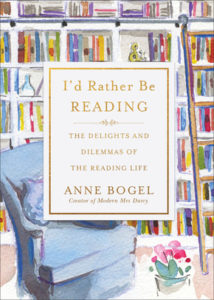 I’d Rather Be Reading: The Delights and Dilemmas of the Reading Life Anne Bogel (Baker Books) $14.99 Oh my, we wish we could just give these out to anyone and everyone — it is a book lover’s joy to see a handsome little book offering all kinds of insights about the lifestyle of being a serious reader. Yet, even though it (not unlike Prior, but perhaps with a bit more whimsy) understands and helps explains the significance and implications of the reading life, it also holds up the joy and quirky (charming and sometimes odd) habits that those of us who love books exhibit.
I’d Rather Be Reading: The Delights and Dilemmas of the Reading Life Anne Bogel (Baker Books) $14.99 Oh my, we wish we could just give these out to anyone and everyone — it is a book lover’s joy to see a handsome little book offering all kinds of insights about the lifestyle of being a serious reader. Yet, even though it (not unlike Prior, but perhaps with a bit more whimsy) understands and helps explains the significance and implications of the reading life, it also holds up the joy and quirky (charming and sometimes odd) habits that those of us who love books exhibit.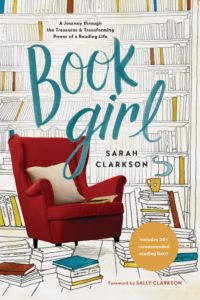 Book Girl: A Journey Through the Treasures and Transforming Power of a Reading Life Sarah Clarkson (Tyndale Momentum) $15.99 There is no doubt this is one of my favorite books of 2018 and one we will continue to tell others about for a long time to come. In my too-brief review last fall I considered, but did not, use a Goldilocks analogue, but I shall now. If Swallow Prior’s On Reading Well is tooo tough and long and Anne Bogel’s I’d Rather Be Reading is tooo short and sweet, well, Book Girl is “just right!” Indeed, Clarkson is as smart and charming and fun and practical and wise (and well-read!) as both of the above mentioned authors and their books combined. I adored this very, very thoughtful reminder of what books can do for us, the profound ways they shape our worldview, the way they can create empathy and help us navigate our world. It is a wonder no one has written a book quite like this (although, I must say, it is stuff I’ve said often in workshops and lectures.)
Book Girl: A Journey Through the Treasures and Transforming Power of a Reading Life Sarah Clarkson (Tyndale Momentum) $15.99 There is no doubt this is one of my favorite books of 2018 and one we will continue to tell others about for a long time to come. In my too-brief review last fall I considered, but did not, use a Goldilocks analogue, but I shall now. If Swallow Prior’s On Reading Well is tooo tough and long and Anne Bogel’s I’d Rather Be Reading is tooo short and sweet, well, Book Girl is “just right!” Indeed, Clarkson is as smart and charming and fun and practical and wise (and well-read!) as both of the above mentioned authors and their books combined. I adored this very, very thoughtful reminder of what books can do for us, the profound ways they shape our worldview, the way they can create empathy and help us navigate our world. It is a wonder no one has written a book quite like this (although, I must say, it is stuff I’ve said often in workshops and lectures.)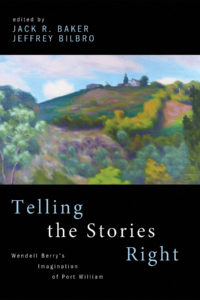 Telling the Stories Right: Wendell Berry’s Imagination of Port William edited by Jack R. Baker & Jeffrey Bilbro (Front Porch Republic Books) $27.00 There are so many books that fall into the “literary criticism” and “books about books” category and we appreciate many. For instance, who wouldn’t find intriguing a 2018 book called Haunted by Christ: Modern Writers and the Struggle for Faith (by Richard Harris; SPCK; $27.00) or the fabulous new book from Plough Publishing called The Gospel in Dorothy Sayers (compiled by Carole Vanderhoof; $18.00.) One of the good ones that we actually sold a handful of was by the great Sarah Arthur called A Light So Lovely:The Spiritual Legacy of Madeleine L’Engle; Zondervan; $19.99.) There are so many books like this and we are glad.
Telling the Stories Right: Wendell Berry’s Imagination of Port William edited by Jack R. Baker & Jeffrey Bilbro (Front Porch Republic Books) $27.00 There are so many books that fall into the “literary criticism” and “books about books” category and we appreciate many. For instance, who wouldn’t find intriguing a 2018 book called Haunted by Christ: Modern Writers and the Struggle for Faith (by Richard Harris; SPCK; $27.00) or the fabulous new book from Plough Publishing called The Gospel in Dorothy Sayers (compiled by Carole Vanderhoof; $18.00.) One of the good ones that we actually sold a handful of was by the great Sarah Arthur called A Light So Lovely:The Spiritual Legacy of Madeleine L’Engle; Zondervan; $19.99.) There are so many books like this and we are glad.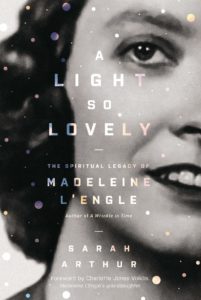 A Light So Lovely: The Spiritual Legacy of Madeleine L’Engle Sarah Arthur (Zondervan) $19.99 I do not know if you will adore this book or not. If you like L’Engle you will be glad to learn of her impact and influence on others. You may know about some of her struggles, personal and otherwise (including the loud criticisms she got from some quarters. It seems she was to open-minded and literary for some conservative religious adherents and yet too Christian for some mainstream critics. Yep.) From Phil Yancey to Luci Shaw, she inspired and befriended many thoughtful Christian writers, and her soul friends are here. Fiction writers like Jeffrey Overstreet are interviewed as are other of L’Engle’s writing colleagues.
A Light So Lovely: The Spiritual Legacy of Madeleine L’Engle Sarah Arthur (Zondervan) $19.99 I do not know if you will adore this book or not. If you like L’Engle you will be glad to learn of her impact and influence on others. You may know about some of her struggles, personal and otherwise (including the loud criticisms she got from some quarters. It seems she was to open-minded and literary for some conservative religious adherents and yet too Christian for some mainstream critics. Yep.) From Phil Yancey to Luci Shaw, she inspired and befriended many thoughtful Christian writers, and her soul friends are here. Fiction writers like Jeffrey Overstreet are interviewed as are other of L’Engle’s writing colleagues.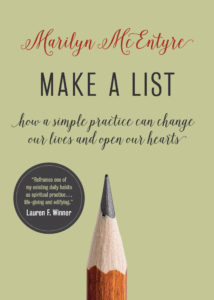 Make a List: How a Simple Practice Can Change Our Lives and Open Our Hearts Marilyn McEntyre (Eerdmans) $21.99 Even if I hadn’t cracked the cover of this compact, hand-sized hardback I’d have nominated for a “best cover” award, I think. I love Marilyn McEntyre, having read several of her volumes of poetry, devotion, Advent, books about grief, about dying, even one about St. Patrick. I’ve chatted with here and served on a panel once and she remains a literary hero. One of my favorite books in the last decade has become a chestnut for me, one I take everywhere and often press into people’s hands — it is called Caring for Words in a Culture of Lies. These were lectures (The Stone Lectures at Princeton, actually) riffing on the theme of words as natural resources and offering “stewardship strategies” to steward them well lest they turn toxic and pollute our common life. More recently she did a lovely and thoughtful devotional playing with words, called Word by Word: A Daily Spiritual Practice. And later this year, Eerdmans will release When Poets Pray.
Make a List: How a Simple Practice Can Change Our Lives and Open Our Hearts Marilyn McEntyre (Eerdmans) $21.99 Even if I hadn’t cracked the cover of this compact, hand-sized hardback I’d have nominated for a “best cover” award, I think. I love Marilyn McEntyre, having read several of her volumes of poetry, devotion, Advent, books about grief, about dying, even one about St. Patrick. I’ve chatted with here and served on a panel once and she remains a literary hero. One of my favorite books in the last decade has become a chestnut for me, one I take everywhere and often press into people’s hands — it is called Caring for Words in a Culture of Lies. These were lectures (The Stone Lectures at Princeton, actually) riffing on the theme of words as natural resources and offering “stewardship strategies” to steward them well lest they turn toxic and pollute our common life. More recently she did a lovely and thoughtful devotional playing with words, called Word by Word: A Daily Spiritual Practice. And later this year, Eerdmans will release When Poets Pray.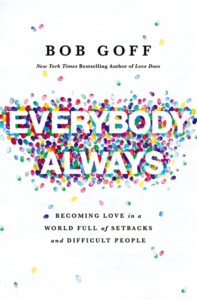 Everybody Always: Becoming
Everybody Always: Becoming 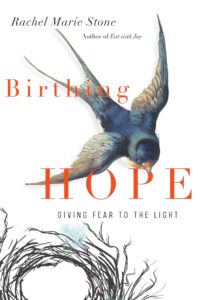 Birthing Hope: Giving Fear to the Light Rachel Marie Stone (IVP) $16.00 This is a book that just took my breath away at times, very well written and very well thought out and very touching, tender, even. Rachel tells illuminating stories that hold her life up to the light — and allows us to join her and do the same — and see where fear and loss and pain has shaped her and how hope has broken through. Amy Julia Becker (herself a very talented writer) says “Birthing Hope drew me in from the first page to the last…”
Birthing Hope: Giving Fear to the Light Rachel Marie Stone (IVP) $16.00 This is a book that just took my breath away at times, very well written and very well thought out and very touching, tender, even. Rachel tells illuminating stories that hold her life up to the light — and allows us to join her and do the same — and see where fear and loss and pain has shaped her and how hope has broken through. Amy Julia Becker (herself a very talented writer) says “Birthing Hope drew me in from the first page to the last…”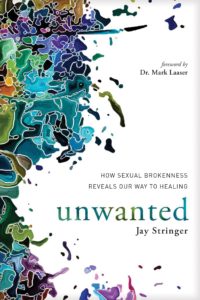 Unwanted: How Sexual Brokenness Reveals Our Way to Healing Jay Stringer (NavPress) $16.99 I thought of listing this in our last list of Best Books of 2018 but I felt like that list was getting long and a bit heavy. The topic of this is heavy, but I wanted to name it in this second list of perhaps more fun and fresh writing. This is not your typical study of lust and purity or closing the window on porn use. It is about finding God’s grace to be transformed, in slow and deep ways, that allow us to find healing from unwanted sins and hard temptations, and it is brutal to read in some ways. But yet, unlike any other book of this kind, it offers a remarkable approach. As String puts in in a slogan perfect for this age of hashtags: listen to your lust.
Unwanted: How Sexual Brokenness Reveals Our Way to Healing Jay Stringer (NavPress) $16.99 I thought of listing this in our last list of Best Books of 2018 but I felt like that list was getting long and a bit heavy. The topic of this is heavy, but I wanted to name it in this second list of perhaps more fun and fresh writing. This is not your typical study of lust and purity or closing the window on porn use. It is about finding God’s grace to be transformed, in slow and deep ways, that allow us to find healing from unwanted sins and hard temptations, and it is brutal to read in some ways. But yet, unlike any other book of this kind, it offers a remarkable approach. As String puts in in a slogan perfect for this age of hashtags: listen to your lust.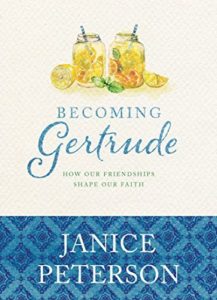 Becoming Gertrude: How Our Friendships Shape Our Faith Janice Peterson (NavPress) $14.99 Decades ago, Eugene Peterson and I stood in the hallway of a local church, and then slowly strolled out to the parking lot where we chatted a bit and dreamed about him doing a poetry reading at our store. (We had heard he sent out original poems as Christmas gifts to his mailing list of fiends and family, and I knew he might want to read for us some Gerard Manley Hopkins, say. His own poetry volume came out many years later entitled Holy Luck.) Even then, before The Message, Peterson was famous and I was reluctant to invite such a serious thinker to our small bookshop. We couldn’t pay him and we didn’t know how to proceed — we were young and idealistic but didn’t want to be rude. He was hospitable with us, friendly and willing. It never worked out, but I stopped in, later, unannounced (making a delivery, if I recall) to the apartment he and his wife, Jan, shared in Pittsburgh for a year, having left Maryland and before the call to Regent in British Columbia. Gene wasn’t there but oh did I enjoy chatting with Jan. It was a short visit and (I’m not just saying this) she was as gracious and kind and warm as can be. Years later we crossed paths a few other times and conferences or events, and what she writes about in this book (as you’d expect from anyone in this family) is born from a life lived well. She knows how to be friendly and show God’s hospitality and has done so, long before it became somewhat of a trendy theological trope. Becoming Gertrude is about friendship and kindness, showing grace and attending to others being a servant, “pouring into” others, as a younger generation puts it nowadays. In Janice’s younger days, it was as simple as being asked up on the porch for a glass of lemonade by a woman named Gertrude.
Becoming Gertrude: How Our Friendships Shape Our Faith Janice Peterson (NavPress) $14.99 Decades ago, Eugene Peterson and I stood in the hallway of a local church, and then slowly strolled out to the parking lot where we chatted a bit and dreamed about him doing a poetry reading at our store. (We had heard he sent out original poems as Christmas gifts to his mailing list of fiends and family, and I knew he might want to read for us some Gerard Manley Hopkins, say. His own poetry volume came out many years later entitled Holy Luck.) Even then, before The Message, Peterson was famous and I was reluctant to invite such a serious thinker to our small bookshop. We couldn’t pay him and we didn’t know how to proceed — we were young and idealistic but didn’t want to be rude. He was hospitable with us, friendly and willing. It never worked out, but I stopped in, later, unannounced (making a delivery, if I recall) to the apartment he and his wife, Jan, shared in Pittsburgh for a year, having left Maryland and before the call to Regent in British Columbia. Gene wasn’t there but oh did I enjoy chatting with Jan. It was a short visit and (I’m not just saying this) she was as gracious and kind and warm as can be. Years later we crossed paths a few other times and conferences or events, and what she writes about in this book (as you’d expect from anyone in this family) is born from a life lived well. She knows how to be friendly and show God’s hospitality and has done so, long before it became somewhat of a trendy theological trope. Becoming Gertrude is about friendship and kindness, showing grace and attending to others being a servant, “pouring into” others, as a younger generation puts it nowadays. In Janice’s younger days, it was as simple as being asked up on the porch for a glass of lemonade by a woman named Gertrude.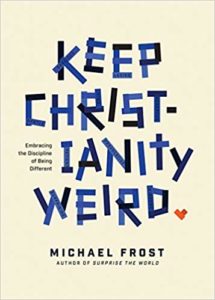 Keep Christianity Weird: Embracing the Discipline of Being Different Michael Frost (NavPress) $7.99 I should have named this in our last post, but was sort of afraid it might seem weird to celebrate an inexpensive, pocket-sized paperback as a major, enduring book of the year. But, hey-o, let’s keep it a little weird and list this goofball of a book as an award winning, super-important, major release.
Keep Christianity Weird: Embracing the Discipline of Being Different Michael Frost (NavPress) $7.99 I should have named this in our last post, but was sort of afraid it might seem weird to celebrate an inexpensive, pocket-sized paperback as a major, enduring book of the year. But, hey-o, let’s keep it a little weird and list this goofball of a book as an award winning, super-important, major release.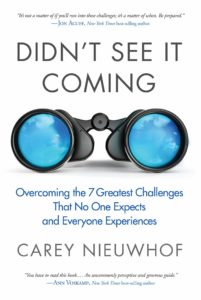 Didn’t See It Coming: Overcoming the 7 Greatest Challenges That No One Expects and Everyone Experiences Cary Nieuwhof (Waterbrook) $19.99 Although last week’s BookNotes honored some very serious books about theology and culture and spirituality and our public lives that I think are important and good, I wanted to add this to a Best of list, but wasn’t sure where to put it. It is partially an auto-biographical telling of this pastor’s own journey into burnout, somewhat of a pop-self-help book which, while valuable, aren’t always enduring or profound. Nieuwhof is one of these high achievers, known in the mega-church world (he founded a church with one of those edgy-cool names, Connexus) a creative designer of educational programs, leadership podcasts, children’s ministry conferences, and more. Often when authors travel in those high-octane worlds I tend to tune out — they may be considered thought-leaders but I would rather slow it down and invite them to think a bit more about what they are doing. I’m distrustful of the glitz and success, although can admire the organizational energy and communication skills of guys like this.
Didn’t See It Coming: Overcoming the 7 Greatest Challenges That No One Expects and Everyone Experiences Cary Nieuwhof (Waterbrook) $19.99 Although last week’s BookNotes honored some very serious books about theology and culture and spirituality and our public lives that I think are important and good, I wanted to add this to a Best of list, but wasn’t sure where to put it. It is partially an auto-biographical telling of this pastor’s own journey into burnout, somewhat of a pop-self-help book which, while valuable, aren’t always enduring or profound. Nieuwhof is one of these high achievers, known in the mega-church world (he founded a church with one of those edgy-cool names, Connexus) a creative designer of educational programs, leadership podcasts, children’s ministry conferences, and more. Often when authors travel in those high-octane worlds I tend to tune out — they may be considered thought-leaders but I would rather slow it down and invite them to think a bit more about what they are doing. I’m distrustful of the glitz and success, although can admire the organizational energy and communication skills of guys like this.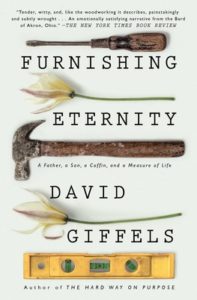 Furnishing Eternity: A Father, a Son, A Coffin, and a Measure of Life David Giffels (Scribnerr) $16.00 I had not read a single review of this, but the title itself — gosh, even those first two words should be award winning for a great title! — and the beautiful, beautiful cover made me pick it up. I told groups about it when it first came out, people who like well-written memoir, good stories, fine writing about the meaning of life that isn’t pushy or propaganda. For readers who like those who press into the mysteries by telling a good story with eloquence and good humor.
Furnishing Eternity: A Father, a Son, A Coffin, and a Measure of Life David Giffels (Scribnerr) $16.00 I had not read a single review of this, but the title itself — gosh, even those first two words should be award winning for a great title! — and the beautiful, beautiful cover made me pick it up. I told groups about it when it first came out, people who like well-written memoir, good stories, fine writing about the meaning of life that isn’t pushy or propaganda. For readers who like those who press into the mysteries by telling a good story with eloquence and good humor.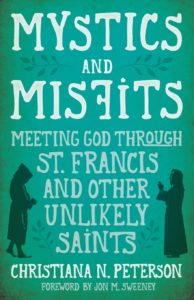 Mystics and Misfits: Meeting God Through St. Francis and Other Unlikely Saints Christiana Peterson (Herald Press) $16.99 We announced this at BookNotes with great delight and I noted that throughout this memoir the author has sidebars about various saints — Francis, Clare, Julian of Norwich, Margery Kempe, who she has an uneasy relationship with, and more — including some letters written to them. This is wonderful stuff, great for those exploring these old saints for the first time.There is a very nice foreword by spiritual writer Jon Sweeney, a former fundamentalist who learned of the mystics, especially Francis, from Mennonites (which is appropriate since Peterson and her husband joined a Mennonite rural community.) The titles refers to these mystics, but what I loved most about it was less about the contemplative journey but as a well-told memoir about a young married couple trying to find a more simple lifestyle, leaving the bustle and high-power work of Washington DC to a farming community in the rural mid-West.
Mystics and Misfits: Meeting God Through St. Francis and Other Unlikely Saints Christiana Peterson (Herald Press) $16.99 We announced this at BookNotes with great delight and I noted that throughout this memoir the author has sidebars about various saints — Francis, Clare, Julian of Norwich, Margery Kempe, who she has an uneasy relationship with, and more — including some letters written to them. This is wonderful stuff, great for those exploring these old saints for the first time.There is a very nice foreword by spiritual writer Jon Sweeney, a former fundamentalist who learned of the mystics, especially Francis, from Mennonites (which is appropriate since Peterson and her husband joined a Mennonite rural community.) The titles refers to these mystics, but what I loved most about it was less about the contemplative journey but as a well-told memoir about a young married couple trying to find a more simple lifestyle, leaving the bustle and high-power work of Washington DC to a farming community in the rural mid-West.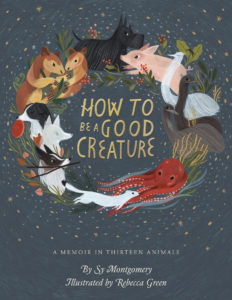 How To Be A Good Creature: A Memoir in Thirteen Animals Sy Montgomery, illustrated by Rebecca Green (HMH) $20.00 Without a doubt, this is was one of the enjoyable and moving books I read this year. I was surprised, actually, by how much I liked it. The story is simple — Sy Montgomery is a serious animal lover and a scientist of sorts, and each chapter is a part of her life as told through the lens of her relationship with an animal. From her own dog (and pig!) to extraordinary journeys to a Southern Pacific cloud forest to study rare tree kangaroos to the opening piece on making eye contact with emus in the Australian Outback.
How To Be A Good Creature: A Memoir in Thirteen Animals Sy Montgomery, illustrated by Rebecca Green (HMH) $20.00 Without a doubt, this is was one of the enjoyable and moving books I read this year. I was surprised, actually, by how much I liked it. The story is simple — Sy Montgomery is a serious animal lover and a scientist of sorts, and each chapter is a part of her life as told through the lens of her relationship with an animal. From her own dog (and pig!) to extraordinary journeys to a Southern Pacific cloud forest to study rare tree kangaroos to the opening piece on making eye contact with emus in the Australian Outback.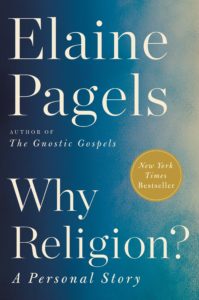 Why Religion: A Personal Story Elaine Pagels (Ecco) $27.99 Neither Beth nor I have read this fully, but we wanted to name it because people have told us it is extraordinary. The story is remarkable — one of the leading scholars of gnosticism who went forward at a Billy Graham rally as a teen, and hung out with Jerry Garcia. Her longing to be a dancer with Martha Graham, her being groped as a young academic in religious studies, her earning national awards for contributions to history and humanities. One customer of our insisted with great passion that it was perhaps the best book of this sort she has ever read! We heard Pagels on NPR and we were very moved, eager to sell the book, despite some misgivings about her own personal scholarship and views about topics such as the gnostic gospels or the nature of Satan or how one determines what is true about anything, actually.
Why Religion: A Personal Story Elaine Pagels (Ecco) $27.99 Neither Beth nor I have read this fully, but we wanted to name it because people have told us it is extraordinary. The story is remarkable — one of the leading scholars of gnosticism who went forward at a Billy Graham rally as a teen, and hung out with Jerry Garcia. Her longing to be a dancer with Martha Graham, her being groped as a young academic in religious studies, her earning national awards for contributions to history and humanities. One customer of our insisted with great passion that it was perhaps the best book of this sort she has ever read! We heard Pagels on NPR and we were very moved, eager to sell the book, despite some misgivings about her own personal scholarship and views about topics such as the gnostic gospels or the nature of Satan or how one determines what is true about anything, actually.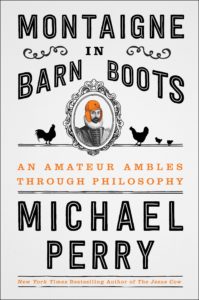 Montaigne in Barn Boots: An Amateur Ambles Through Philosophy Michael Perry (Harper) $25.99 Beth would say that the first coupla pages are so beautiful in their homespun way that it is worth buying to book for that joy alone. She and I both agree that this was one of the most fascinating, wonderful, interesting and funny books we read all year.
Montaigne in Barn Boots: An Amateur Ambles Through Philosophy Michael Perry (Harper) $25.99 Beth would say that the first coupla pages are so beautiful in their homespun way that it is worth buying to book for that joy alone. She and I both agree that this was one of the most fascinating, wonderful, interesting and funny books we read all year. All the Colors We Will See: Reflections on Barriers, Brokenness, and Finding Our Way Patrice Gopo (Thomas Nelson) $16.99 I so enjoyed this and thought it so very interesting and well written that we exclaimed about it at BookNotes late last summer when it first came out. Many of been reading more than ever on books by people of color, memoirs and reflections to help us understand our culture these days and learn to be more effective agents navigating various subcultures and to somehow be able to do the work of being agents of God’s reconciliation. All the Colors We Will See is simply a lovely volume, and the author is remarkable, as a gifted writer and as one with a curious, interesting story. A great blurb on the back by award-winning writer Bret Lott is pretty special, too — such an endorsement assures us we are on firm ground naming this as one of the Best Books of 2018. He notes that Gopo’s “calm voice and winsome demeanor” allows her to speak hard truths… including “what it takes to continue in Christ’s love despite the fallen and falling world around us.”
All the Colors We Will See: Reflections on Barriers, Brokenness, and Finding Our Way Patrice Gopo (Thomas Nelson) $16.99 I so enjoyed this and thought it so very interesting and well written that we exclaimed about it at BookNotes late last summer when it first came out. Many of been reading more than ever on books by people of color, memoirs and reflections to help us understand our culture these days and learn to be more effective agents navigating various subcultures and to somehow be able to do the work of being agents of God’s reconciliation. All the Colors We Will See is simply a lovely volume, and the author is remarkable, as a gifted writer and as one with a curious, interesting story. A great blurb on the back by award-winning writer Bret Lott is pretty special, too — such an endorsement assures us we are on firm ground naming this as one of the Best Books of 2018. He notes that Gopo’s “calm voice and winsome demeanor” allows her to speak hard truths… including “what it takes to continue in Christ’s love despite the fallen and falling world around us.”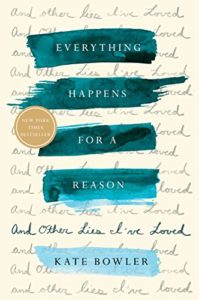 Everything Happens for a Reason And Other Lies I’ve Loved Kate Bowler (Random House) $26.00 I hesitated to list this as I’m sure most BookNotes readers would know that it has won many awards and was much discussed earlier this year. It is what I called in BookNotes earlier this year “achingly beautiful.” Ms Bowler has garnered so much buzz and has been reviewed so well, it is nearly a publishing phenomenon, riding the best-seller list for much of the year and ending on lots of year’s end Best Books lists. Perhaps in league with the stunning When Breath Becomes Air or Being Mortal it is a book about ultimate things that is exceptionally insightful, beautifully written, raw and wise (and irreverent and funny, too, believe it or not.) With advanced rave reviews from Publishers Weekly and Kirkus, Bowler’s reflection on dying has become a touchstone for many conversations these days.
Everything Happens for a Reason And Other Lies I’ve Loved Kate Bowler (Random House) $26.00 I hesitated to list this as I’m sure most BookNotes readers would know that it has won many awards and was much discussed earlier this year. It is what I called in BookNotes earlier this year “achingly beautiful.” Ms Bowler has garnered so much buzz and has been reviewed so well, it is nearly a publishing phenomenon, riding the best-seller list for much of the year and ending on lots of year’s end Best Books lists. Perhaps in league with the stunning When Breath Becomes Air or Being Mortal it is a book about ultimate things that is exceptionally insightful, beautifully written, raw and wise (and irreverent and funny, too, believe it or not.) With advanced rave reviews from Publishers Weekly and Kirkus, Bowler’s reflection on dying has become a touchstone for many conversations these days.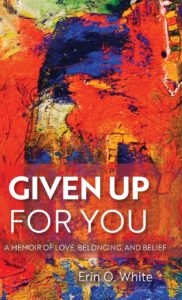 Given Up For You: A Memoir of Love, Belonging, and Belief Erin O. White (University of Wisconsin Press) $26.95 There are certain books that are so captivating to me, the reading of them such a full-bodied experience, that I recall where I sat, how the light fell on the page, how I felt, wiping away tears from my cheek with the back of my hand, and reading portions out lout to my own beloved spouse. Such memories are dear to me, and this was one of the most precious books for me this year. Yet, I know that some will not be as affection toward it as I would hope. It is a love story, a love story between a lesbian couple. And it was very, very well written, very moving, very enlightening for those of us who are not much experienced in such things.
Given Up For You: A Memoir of Love, Belonging, and Belief Erin O. White (University of Wisconsin Press) $26.95 There are certain books that are so captivating to me, the reading of them such a full-bodied experience, that I recall where I sat, how the light fell on the page, how I felt, wiping away tears from my cheek with the back of my hand, and reading portions out lout to my own beloved spouse. Such memories are dear to me, and this was one of the most precious books for me this year. Yet, I know that some will not be as affection toward it as I would hope. It is a love story, a love story between a lesbian couple. And it was very, very well written, very moving, very enlightening for those of us who are not much experienced in such things.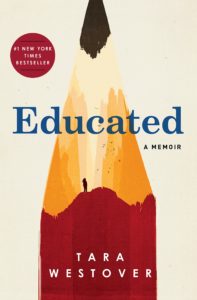
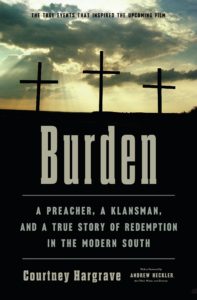 I cannot stop naming these books that so moved me this past year. As you can see, Beth and I both read a lot of memoirs, and so many were almost stunning, we were entralled and pulled into their stories. It is hard to award one without thinking of others that so moved us this year. From Tara Westhover’s much-discussed Educated: A
I cannot stop naming these books that so moved me this past year. As you can see, Beth and I both read a lot of memoirs, and so many were almost stunning, we were entralled and pulled into their stories. It is hard to award one without thinking of others that so moved us this year. From Tara Westhover’s much-discussed Educated: A 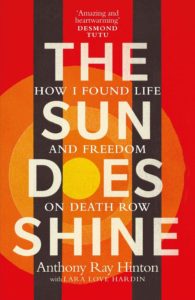 Memoir (Random House; $28.00) to Courtney Hargrave’s satisfying Burden: A Preacher, a Klansman, and a True Story of Redemption in the Modern South (Convergent; $26.00) to the incredible The Sun Does Shine: How I Found Life and Freedom on Death Row by former (wrongly imprisoned) client of Bryan Stevenson, Anthony Ray Hinton (St. Martin’s Press; $26.99) these all must be touted this year. Each of these books provided hours of entertainment, educating us and inspiring us. I reviewed all three in a bigger column last fall, and you may want to revisit my long explanations if you don’t recall. These are surely among the best books of 2018.
Memoir (Random House; $28.00) to Courtney Hargrave’s satisfying Burden: A Preacher, a Klansman, and a True Story of Redemption in the Modern South (Convergent; $26.00) to the incredible The Sun Does Shine: How I Found Life and Freedom on Death Row by former (wrongly imprisoned) client of Bryan Stevenson, Anthony Ray Hinton (St. Martin’s Press; $26.99) these all must be touted this year. Each of these books provided hours of entertainment, educating us and inspiring us. I reviewed all three in a bigger column last fall, and you may want to revisit my long explanations if you don’t recall. These are surely among the best books of 2018.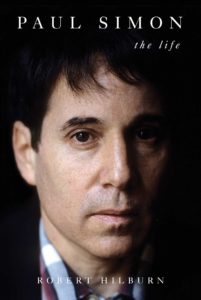 Paul Simon: The Life Robert Hillburn (Simon & Schuster) $30.00 There has yet to be a really good biography of the legendary singer-songwriter and this one finally is the one, the one some of us have been waiting for. (Simon cooperated with it, which explains only part of its brilliance.) It’s been called “a straight-shooting
Paul Simon: The Life Robert Hillburn (Simon & Schuster) $30.00 There has yet to be a really good biography of the legendary singer-songwriter and this one finally is the one, the one some of us have been waiting for. (Simon cooperated with it, which explains only part of its brilliance.) It’s been called “a straight-shooting 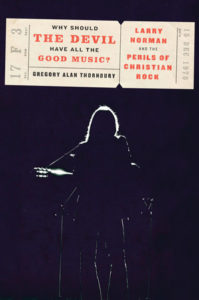 Why Should the Devil Have All the God Music? Larry Norman and the Perils of Christian Rock Gregory Alan Thornbury (Convergent) $26.00 Yes! Thank you Greg Thornbury for writing this book that cried out to be written, surely one of the best books of 2018.
Why Should the Devil Have All the God Music? Larry Norman and the Perils of Christian Rock Gregory Alan Thornbury (Convergent) $26.00 Yes! Thank you Greg Thornbury for writing this book that cried out to be written, surely one of the best books of 2018.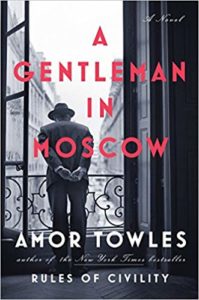 A Gentleman in Moscow Amor Towles (Viking) $27.00 Just a few days ago a customer new to our store was gabbing and in the middle of deep conversation let out a yelp, a delightful cry of discovery, as she picked up A Gentleman in Moscow from our fiction shelves and exclaimed how much she loved it. I think she was also expressing a little surprise that a so-called Christian bookstore would carry a secular best-seller. And, I am sure, a bit of a “you to?” question — that question we have when we so love a book and wonder if others share our joy. Beth would certainly say that this was her favorite book of 2018. I’ve heard plenty about it, from customers and from her, and intend to read it myself, soon.
A Gentleman in Moscow Amor Towles (Viking) $27.00 Just a few days ago a customer new to our store was gabbing and in the middle of deep conversation let out a yelp, a delightful cry of discovery, as she picked up A Gentleman in Moscow from our fiction shelves and exclaimed how much she loved it. I think she was also expressing a little surprise that a so-called Christian bookstore would carry a secular best-seller. And, I am sure, a bit of a “you to?” question — that question we have when we so love a book and wonder if others share our joy. Beth would certainly say that this was her favorite book of 2018. I’ve heard plenty about it, from customers and from her, and intend to read it myself, soon. 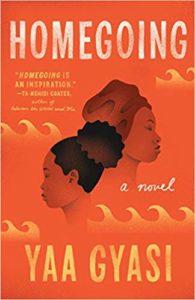
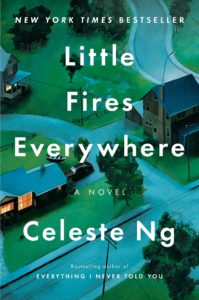
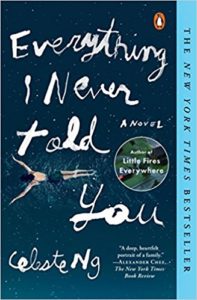
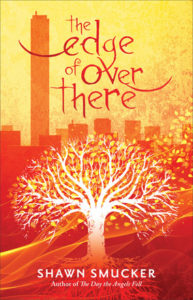 The Edge of Over There Shawn Smucker (Revell) $17.99 Okay, this is another fictional gem that I didn’t read but that Beth adored. It’s YA fantasy, and that’s not my genre, but, whew, even though Beth rarely reads fantastical stuff like this, she was hooked by the first one, The Day the Angels Fell.
The Edge of Over There Shawn Smucker (Revell) $17.99 Okay, this is another fictional gem that I didn’t read but that Beth adored. It’s YA fantasy, and that’s not my genre, but, whew, even though Beth rarely reads fantastical stuff like this, she was hooked by the first one, The Day the Angels Fell.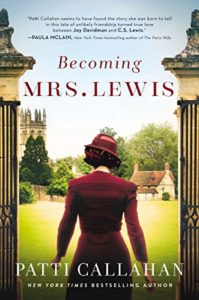 Becoming Mrs. Lewis Pattie Callahan (Thomas Nelson) $25.99 Not a few C.S. Lewis fans have hoped for a book like this for decades. It is a beautifully-told, well-realized, fictional telling of what Joy Davidman might have gone through as she married the famous Oxford don. It came out in the tail end of 2018 and became an immediate best seller.
Becoming Mrs. Lewis Pattie Callahan (Thomas Nelson) $25.99 Not a few C.S. Lewis fans have hoped for a book like this for decades. It is a beautifully-told, well-realized, fictional telling of what Joy Davidman might have gone through as she married the famous Oxford don. It came out in the tail end of 2018 and became an immediate best seller.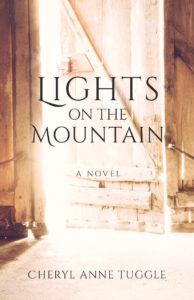 Lights on the Mountain: A Novel Cheryl Anne Tuggle (Paraclete Press) $17.99 This recent novel, set in Western Pennsylvania, North of Pittsburgh (with mentions of New Wilmington and the Beaver River and more), is beautifully rendered; it is offers gorgeous literary prose, and certain deserves accolades galore.
Lights on the Mountain: A Novel Cheryl Anne Tuggle (Paraclete Press) $17.99 This recent novel, set in Western Pennsylvania, North of Pittsburgh (with mentions of New Wilmington and the Beaver River and more), is beautifully rendered; it is offers gorgeous literary prose, and certain deserves accolades galore.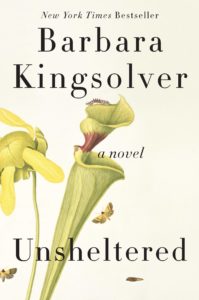 Unsheltered: A Novel Barbara Kingsolver (Harper) $29.99 This is a novel Beth and I (and one of our daughters) read late this fall and we are still pondering it. It may be my pick for favorite fiction this year. Beth, too (after The Gentleman in Moscow, maybe.) I hope you know Kingsolver’s early works (Bean Trees and Pigs in Heaven, and her essays which I love, like High Tide in Tucson and Small Wonder.) Too many only know her for Poisonwood Bible. So, read this one, one of the most discussed books of 2018!
Unsheltered: A Novel Barbara Kingsolver (Harper) $29.99 This is a novel Beth and I (and one of our daughters) read late this fall and we are still pondering it. It may be my pick for favorite fiction this year. Beth, too (after The Gentleman in Moscow, maybe.) I hope you know Kingsolver’s early works (Bean Trees and Pigs in Heaven, and her essays which I love, like High Tide in Tucson and Small Wonder.) Too many only know her for Poisonwood Bible. So, read this one, one of the most discussed books of 2018!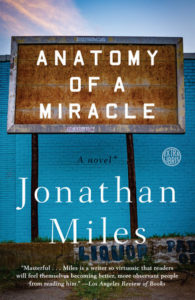 Anatomy of a Miracle: A Novel Jonathan Miles (Hogarth/Random House) $16.00 We all know about ties, close calls, draws. I suppose I want to honor the above-named Kingsolver Unshelterd as my favorite novel of 2018, but, to be honest, this one was one I tore through, turning the pages and wondering what was going to happen next. It, too, is a bit vulgar, but is nonetheless a story that is about God and faith and the meaning of things. I adored Anatomy of a Miracle, now out in paperback. As I said in a previous BookNotes review this summer, the author, Jonathan Miles, is theologically aware (quoting C.S. Lewis and others about the theodicy question) and portrays different sorts of skeptics, seekers, believers, and charlatans, all really, really well. In this story, a handicapped Afghanistan war vet one day just gets up out of his wheelchair while heading to the local convenience store to buy some smokes. (You could see this alluded to on the hardback book cover.)
Anatomy of a Miracle: A Novel Jonathan Miles (Hogarth/Random House) $16.00 We all know about ties, close calls, draws. I suppose I want to honor the above-named Kingsolver Unshelterd as my favorite novel of 2018, but, to be honest, this one was one I tore through, turning the pages and wondering what was going to happen next. It, too, is a bit vulgar, but is nonetheless a story that is about God and faith and the meaning of things. I adored Anatomy of a Miracle, now out in paperback. As I said in a previous BookNotes review this summer, the author, Jonathan Miles, is theologically aware (quoting C.S. Lewis and others about the theodicy question) and portrays different sorts of skeptics, seekers, believers, and charlatans, all really, really well. In this story, a handicapped Afghanistan war vet one day just gets up out of his wheelchair while heading to the local convenience store to buy some smokes. (You could see this alluded to on the hardback book cover.)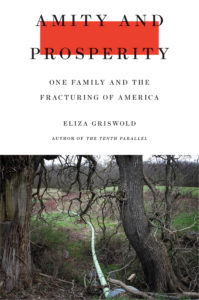 Amity and Prosperity: One Family and the Fracturing of America Eliza Griswold (MacMillan) $27.00 This was one of my personal favorites and one of the Best Books of 2018. What a story. I’ve taken the liberty of reprinting my review from BookNotes as we honor the amazing work this writer did in telling this story. Few readers outside of the greater Pittsburgh area will catch the reference of the title of the stunning new book, Amity and Prosperity, not realizing that they are names of two neighboring towns near Washington, PA. Locals know that these small towns are classic examples of the post-industrial geography of Western Pennsylvania. If Hillbilly Elegy famously portrayed the rustbelt ethos of Appalachian transplants into southern Ohio, Amity and Prosperity tells with vivid detail the contours of daily life in Washington and Green counties, the northern edge of Appalachia that is no longer sustained by coal fields or steel mills and that less than a decade ago faced an “energy gold rush” with an influx of workers and money and drugs, drilling for natural gas.
Amity and Prosperity: One Family and the Fracturing of America Eliza Griswold (MacMillan) $27.00 This was one of my personal favorites and one of the Best Books of 2018. What a story. I’ve taken the liberty of reprinting my review from BookNotes as we honor the amazing work this writer did in telling this story. Few readers outside of the greater Pittsburgh area will catch the reference of the title of the stunning new book, Amity and Prosperity, not realizing that they are names of two neighboring towns near Washington, PA. Locals know that these small towns are classic examples of the post-industrial geography of Western Pennsylvania. If Hillbilly Elegy famously portrayed the rustbelt ethos of Appalachian transplants into southern Ohio, Amity and Prosperity tells with vivid detail the contours of daily life in Washington and Green counties, the northern edge of Appalachia that is no longer sustained by coal fields or steel mills and that less than a decade ago faced an “energy gold rush” with an influx of workers and money and drugs, drilling for natural gas.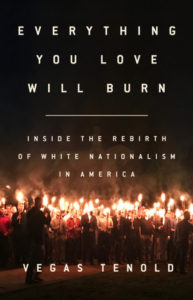 Everything You Love Will Burn: Inside the Rebirth of White Nationalism in America Vegas Tenold (Nation Books) $27.00 Again, this was one I stayed up late turning the pages, not wanting to miss a bit, and, months later, still recall the powerful feelings I had immersed in this remarkable reading experience. And, man, I can’t believe what some authors do to get a story told. Give this guy a medal. And a Hearts & Minds Best Book Award, at least.
Everything You Love Will Burn: Inside the Rebirth of White Nationalism in America Vegas Tenold (Nation Books) $27.00 Again, this was one I stayed up late turning the pages, not wanting to miss a bit, and, months later, still recall the powerful feelings I had immersed in this remarkable reading experience. And, man, I can’t believe what some authors do to get a story told. Give this guy a medal. And a Hearts & Minds Best Book Award, at least.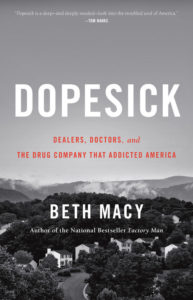 Dopesick: Dealers, Doctors, and the Drug Company That Addicted America Beth Macy (Little Brown) $28.00 This. This is one of the most amazing books of 2018 and many, many observers have insisted it is a masterpiece of groundbreaking reporting. I love this writer and trust her writing and you will be amazed at what you learn (outraged, too) by taking up even a few chapters of Dopesick.
Dopesick: Dealers, Doctors, and the Drug Company That Addicted America Beth Macy (Little Brown) $28.00 This. This is one of the most amazing books of 2018 and many, many observers have insisted it is a masterpiece of groundbreaking reporting. I love this writer and trust her writing and you will be amazed at what you learn (outraged, too) by taking up even a few chapters of Dopesick.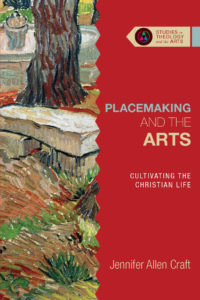 Placemaking and the Arts: Cultivating the
Placemaking and the Arts: Cultivating the 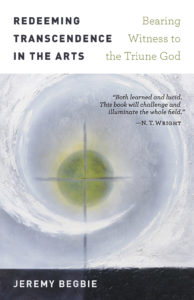
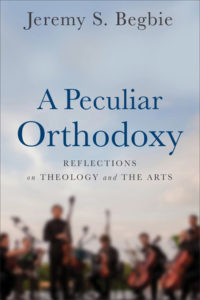
 The Art of Edward Knippers: Prints and Drawings edited by James Romaine (Square Halo Books) $19.99 This latest release in the small but vital “The Art of…” series by the Lancaster-based boutique arts publisher, Square Halo, is a sight to behold, and a valuable historical artifact by one of the most important Christian painters of the last 40 years.
The Art of Edward Knippers: Prints and Drawings edited by James Romaine (Square Halo Books) $19.99 This latest release in the small but vital “The Art of…” series by the Lancaster-based boutique arts publisher, Square Halo, is a sight to behold, and a valuable historical artifact by one of the most important Christian painters of the last 40 years.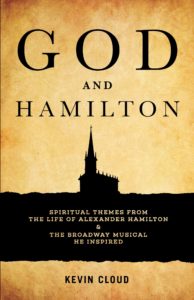 God and Hamilton: Spiritual Themes From the Life of Alexander Hamilton & The Broadway Musical He Inspired Kevin Cloud (Deep River Books) $15.99 Can we at least agree to give this book a “got there first award? It had to happen, and we couldn’t be happier to know that this book will take its place alongside many, many other studies of God in popular culture. My old housemate Bill Romanowski wrote one of the defining books on a methodology for discerning themes of faith — good or bad faith, that is — in popular entertainment and his Eyes Wide Open: Finding God in Popular Culture remains a standard in the field. (Look for his forthcoming book on film in late May 2019, by the way, to be entitled Cinematic Faith: A
God and Hamilton: Spiritual Themes From the Life of Alexander Hamilton & The Broadway Musical He Inspired Kevin Cloud (Deep River Books) $15.99 Can we at least agree to give this book a “got there first award? It had to happen, and we couldn’t be happier to know that this book will take its place alongside many, many other studies of God in popular culture. My old housemate Bill Romanowski wrote one of the defining books on a methodology for discerning themes of faith — good or bad faith, that is — in popular entertainment and his Eyes Wide Open: Finding God in Popular Culture remains a standard in the field. (Look for his forthcoming book on film in late May 2019, by the way, to be entitled Cinematic Faith: A 
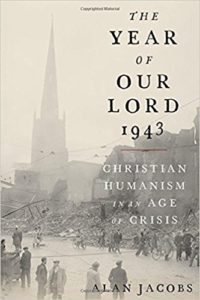 The Year of Our Lord 1943: Christian Humanism in an Age of Crisis Alan Jacobs (Oxford University Press) $25.95 I hope you recall how we announced this earlier, insisting that the idea of it — not to mention the research — was brilliant. Jacobs is a great writer, a remarkably adroit thinker, and here he tells of five major Christian thinkers who, after World War II, published major works questioning the idols of Western culture and wondering how a renewal of a Christian-like humanism might help us survive the coming technocracy. Jacobs explores Christian intellectuals Jacques Maritain, T. S. Eliot, C. S. Lewis, W. H. Auden, and Simone Weil, who “sought both to articulate a sober and reflective critique of their own culture and to outline a plan for the moral and spiritual regeneration of their countries in the post-war world.” This is one of the most learned and vital and valuable books of many a year.
The Year of Our Lord 1943: Christian Humanism in an Age of Crisis Alan Jacobs (Oxford University Press) $25.95 I hope you recall how we announced this earlier, insisting that the idea of it — not to mention the research — was brilliant. Jacobs is a great writer, a remarkably adroit thinker, and here he tells of five major Christian thinkers who, after World War II, published major works questioning the idols of Western culture and wondering how a renewal of a Christian-like humanism might help us survive the coming technocracy. Jacobs explores Christian intellectuals Jacques Maritain, T. S. Eliot, C. S. Lewis, W. H. Auden, and Simone Weil, who “sought both to articulate a sober and reflective critique of their own culture and to outline a plan for the moral and spiritual regeneration of their countries in the post-war world.” This is one of the most learned and vital and valuable books of many a year.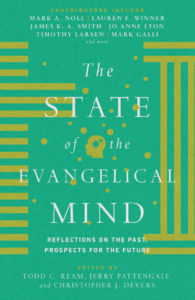 The State of the Evangelical Mind: Reflections on the Past, Prospects for the Future edited by Todd Ream, Jerry Pattengale, and Christopher Devers (IVP Academic) $28.00 This is one of those books that deserves a very thorough study, a review that explains each and every chapter and celebrates the good work of each and every contributor. The work is good and the contributors fascinating — Mark Noll, Lauren Winner, James K.A. Smith, Jo Anne Lyon, Timothy Larson, Mark Gallie, and more. If you are a serious fan of Hearts & Minds you will know why we honor this book as one of the most important of 2018 and you’ll want to have it on your own bookshelf. Heck, you might want to order it and then throw a party. It is not only a good, good book on its own merit, but it stands for something, signifies a renaissance of thoughtful Christian publishing and intentionally deepening of the evangelical mind, even a renewal of faith-based higher education, and a revival of the Christian presence in the arts, a project in which some observers have said we have played a small part. (Okay, only a very small part, but we all need stuff to celebrate, so keep that party going!)
The State of the Evangelical Mind: Reflections on the Past, Prospects for the Future edited by Todd Ream, Jerry Pattengale, and Christopher Devers (IVP Academic) $28.00 This is one of those books that deserves a very thorough study, a review that explains each and every chapter and celebrates the good work of each and every contributor. The work is good and the contributors fascinating — Mark Noll, Lauren Winner, James K.A. Smith, Jo Anne Lyon, Timothy Larson, Mark Gallie, and more. If you are a serious fan of Hearts & Minds you will know why we honor this book as one of the most important of 2018 and you’ll want to have it on your own bookshelf. Heck, you might want to order it and then throw a party. It is not only a good, good book on its own merit, but it stands for something, signifies a renaissance of thoughtful Christian publishing and intentionally deepening of the evangelical mind, even a renewal of faith-based higher education, and a revival of the Christian presence in the arts, a project in which some observers have said we have played a small part. (Okay, only a very small part, but we all need stuff to celebrate, so keep that party going!)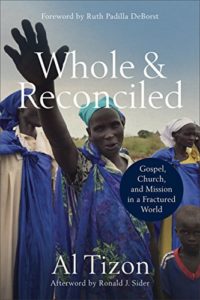 Whole & Reconciled: Gospel, Church, and Mission in a Fractured World Al Tizon (Baker Academic) $22.99 At a bit over 200 pages this book covers so much good stuff it deserves multiple awards — best book on the nature of the gospel, best book of missiology, best book as a foundation for peace and justice work, best book on the Biblical narrative. I suppose I’d celebrate it as one of the best books by a friend who has picked up books from us here at Hearts & Minds. (Runner up to Believe Me author Professor John Fea.) I think it has one of the stronger cover designs, too — what a photo, and what a title.
Whole & Reconciled: Gospel, Church, and Mission in a Fractured World Al Tizon (Baker Academic) $22.99 At a bit over 200 pages this book covers so much good stuff it deserves multiple awards — best book on the nature of the gospel, best book of missiology, best book as a foundation for peace and justice work, best book on the Biblical narrative. I suppose I’d celebrate it as one of the best books by a friend who has picked up books from us here at Hearts & Minds. (Runner up to Believe Me author Professor John Fea.) I think it has one of the stronger cover designs, too — what a photo, and what a title. Future Faith: Ten Challenges Reshaping Christianity in the 21st Century Wesley Granberg-Michaelson (Fortress Press ) $18.99 Well. Speaking of discussion about the nature of mission and hearing voices from the global church, of wanting to work for the unity of the Body of Christ — for the sake of the needy world and creation itself, this is an author who has been on the front lines for decades and is a voice you should know, whose books you should read. Wes Granberg-Michaelson has spent his adult life pondering and working on these very things. This is surely, surely, one of the most important books of 2018 — and I think really helpful for anyone involved in church life. The great and interesting foreword by Soong-Chan Rah says it wonderfully, assuring us that this is an excellent tool for local church folks.
Future Faith: Ten Challenges Reshaping Christianity in the 21st Century Wesley Granberg-Michaelson (Fortress Press ) $18.99 Well. Speaking of discussion about the nature of mission and hearing voices from the global church, of wanting to work for the unity of the Body of Christ — for the sake of the needy world and creation itself, this is an author who has been on the front lines for decades and is a voice you should know, whose books you should read. Wes Granberg-Michaelson has spent his adult life pondering and working on these very things. This is surely, surely, one of the most important books of 2018 — and I think really helpful for anyone involved in church life. The great and interesting foreword by Soong-Chan Rah says it wonderfully, assuring us that this is an excellent tool for local church folks.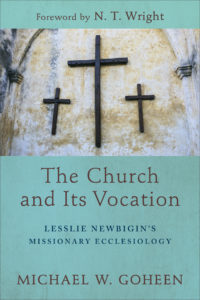 The Church and Its Vocation: Lesslie Newbigin’s Missionary Ecclesiology Michael Goheen (Baker Academic) $22.99 This came out late in the fall and although I can’t say I’ve read every page, I can say that it deserves to be named an an exceptionally notable work. There has been (especially just a couple of years ago) a huge discovery (or rediscovery) of the wonderful work of Lesslie Newbigin. From his many volumes written out of his time in India (where he lived and ministered for most of his adult life) and then his ground-breaking work about how to use contextualization principles (that cross cultural missionaries routinely use) in the post-Christian, secularizing West. In books like Foolishness to the Greeks and The Gospel in a Pluralist Society Newbigin set the stage for what has become the missional church movement. There are bunches of fantastic missional church resources, some quite lively, all indebted to Newbigin.
The Church and Its Vocation: Lesslie Newbigin’s Missionary Ecclesiology Michael Goheen (Baker Academic) $22.99 This came out late in the fall and although I can’t say I’ve read every page, I can say that it deserves to be named an an exceptionally notable work. There has been (especially just a couple of years ago) a huge discovery (or rediscovery) of the wonderful work of Lesslie Newbigin. From his many volumes written out of his time in India (where he lived and ministered for most of his adult life) and then his ground-breaking work about how to use contextualization principles (that cross cultural missionaries routinely use) in the post-Christian, secularizing West. In books like Foolishness to the Greeks and The Gospel in a Pluralist Society Newbigin set the stage for what has become the missional church movement. There are bunches of fantastic missional church resources, some quite lively, all indebted to Newbigin.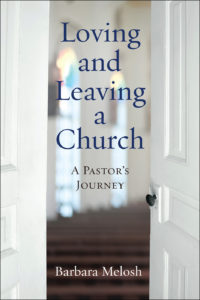 Loving and Leaving a Church: A Pastor’s Journey Barbara Melosh (Westminster John Knox Press) $18.00 We stock so many books for congregational leaders — everything from Abingdon and Alban and the like — but occasionally a book comes along that stands out for it’s literary quality and it’s charm and quiet insight. In the last few years I keep raving about the epistolary novel, Love Big Be Well: Letters to a Small Town Church by Winn Collier (which Eugene Peterson just raved about.) I’ve been on the look-out for something to recommend like that.
Loving and Leaving a Church: A Pastor’s Journey Barbara Melosh (Westminster John Knox Press) $18.00 We stock so many books for congregational leaders — everything from Abingdon and Alban and the like — but occasionally a book comes along that stands out for it’s literary quality and it’s charm and quiet insight. In the last few years I keep raving about the epistolary novel, Love Big Be Well: Letters to a Small Town Church by Winn Collier (which Eugene Peterson just raved about.) I’ve been on the look-out for something to recommend like that.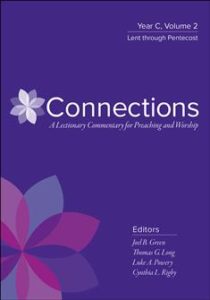
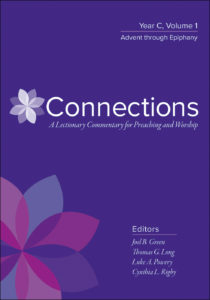
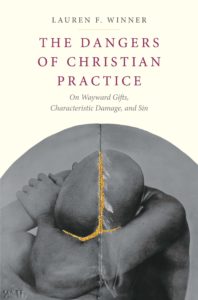 The Dangers of Christian Practice: On Wayward Gifts, Characteristic Damage, and Sin Lauren F. Winner (Yale University Press) $28.00 This is certainly one of the most thoughtful and grand books of 2018 and it is one I am reading so carefully that I am not yet finished! It deserves savoring and pondering. Lauren is a gracious, at times luminous writer and those that love her memoirs will recognize her voice in some of these lovely and poignant stories. Yet, this is a different sort of book (it is on Yale University Press, after all.) More scholarly, more philosophical, she goes to great lengths to be clear about her argument.
The Dangers of Christian Practice: On Wayward Gifts, Characteristic Damage, and Sin Lauren F. Winner (Yale University Press) $28.00 This is certainly one of the most thoughtful and grand books of 2018 and it is one I am reading so carefully that I am not yet finished! It deserves savoring and pondering. Lauren is a gracious, at times luminous writer and those that love her memoirs will recognize her voice in some of these lovely and poignant stories. Yet, this is a different sort of book (it is on Yale University Press, after all.) More scholarly, more philosophical, she goes to great lengths to be clear about her argument.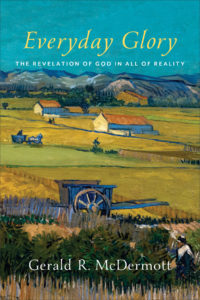 Everyday Glory: The Revelation of God in All of Reality Gerald McDermott (BakerAcademic) $22.99 We have written from time to time about what I call “the spirituality of the ordinary,” When we set up book displays we usually have a dozen titles tucked in among the spiritual disciplines and contemplative guides and mystics that extol finding God in the mundane. Well, this does that, I suppose, but it is more of a theology of the spirituality of the ordinary. It is warm and inviting but meaty. McDermott is a splendid writer, the Anglican Chair of Divinity at Beeson (at Samford University) and here he sees — not unlike Jonathan Edwards who he has studied deeply and draws upon here — in the ordinary stuff of daily life signs and signals of the Trinune God.
Everyday Glory: The Revelation of God in All of Reality Gerald McDermott (BakerAcademic) $22.99 We have written from time to time about what I call “the spirituality of the ordinary,” When we set up book displays we usually have a dozen titles tucked in among the spiritual disciplines and contemplative guides and mystics that extol finding God in the mundane. Well, this does that, I suppose, but it is more of a theology of the spirituality of the ordinary. It is warm and inviting but meaty. McDermott is a splendid writer, the Anglican Chair of Divinity at Beeson (at Samford University) and here he sees — not unlike Jonathan Edwards who he has studied deeply and draws upon here — in the ordinary stuff of daily life signs and signals of the Trinune God.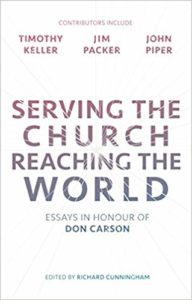 Serving the Church, Reaching the World: Essays in Honour of Don Carson edited by Richard Cunningham (IVP-UK) $15.00 I know his friends call him Don, but most evangelical book buyers who know his vast, important body of work call him D.A. We sold books with him once and didn’t know how to address him, so I called him “Dr. Carson.” As you can see from the funny spelling of “Honour” this is a British book. Technically, it came out in England in late 2017 but it was 2018 until we discovered it here in the States. It is a collection of essays offered in appreciation (a festschrift) for D.A. Carson and brings together a select group of theologians, Bible scholars, mission leaders, seminary thinkers, and those who do apologetics and preaching to offer good pieces. It isn’t a well-known book which is why I want to give a special shout out here as it is a great collection of articles and essays that you won’t find anywhere else.
Serving the Church, Reaching the World: Essays in Honour of Don Carson edited by Richard Cunningham (IVP-UK) $15.00 I know his friends call him Don, but most evangelical book buyers who know his vast, important body of work call him D.A. We sold books with him once and didn’t know how to address him, so I called him “Dr. Carson.” As you can see from the funny spelling of “Honour” this is a British book. Technically, it came out in England in late 2017 but it was 2018 until we discovered it here in the States. It is a collection of essays offered in appreciation (a festschrift) for D.A. Carson and brings together a select group of theologians, Bible scholars, mission leaders, seminary thinkers, and those who do apologetics and preaching to offer good pieces. It isn’t a well-known book which is why I want to give a special shout out here as it is a great collection of articles and essays that you won’t find anywhere else.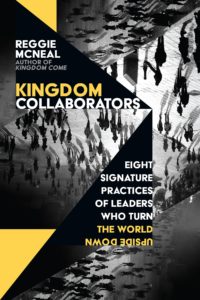 Kingdom Collaborators: Eight Signature Practices of Leaders Who Turn the World Upside Down Reggie McNeal (IVP) $16.00 This is another great book that comes from IVP’s Praxis imprint and we are thrilled to say we stock them all, including a big stack of this one. We have long appreciated Reggie’s upbeat, stimulating (but exceptionally well-informed and thoughtful) approach to missional church and Kingdom living. We want to honor this as one of the books we were excited about this year, in part because it is practical and useful for church and ministry leaders — not “running over the same old ground” as Pink Flloyd puts it in “Wish You Were Here” — but also because, well, did you see what I did there? This is a book for church and parish leaders but it is not mostly or exclusively about the local church but about the reign of God in the world God loves. That is, it is about the culture, about the Kingdom coming in all of life, about entrepreneurial visions and world-changing efforts to make a difference. Do you want to be that kind of a church leader, equipping your people to serve their city, to care for their neighborhoods, to represent God’s grace in various institutions of your locality?
Kingdom Collaborators: Eight Signature Practices of Leaders Who Turn the World Upside Down Reggie McNeal (IVP) $16.00 This is another great book that comes from IVP’s Praxis imprint and we are thrilled to say we stock them all, including a big stack of this one. We have long appreciated Reggie’s upbeat, stimulating (but exceptionally well-informed and thoughtful) approach to missional church and Kingdom living. We want to honor this as one of the books we were excited about this year, in part because it is practical and useful for church and ministry leaders — not “running over the same old ground” as Pink Flloyd puts it in “Wish You Were Here” — but also because, well, did you see what I did there? This is a book for church and parish leaders but it is not mostly or exclusively about the local church but about the reign of God in the world God loves. That is, it is about the culture, about the Kingdom coming in all of life, about entrepreneurial visions and world-changing efforts to make a difference. Do you want to be that kind of a church leader, equipping your people to serve their city, to care for their neighborhoods, to represent God’s grace in various institutions of your locality?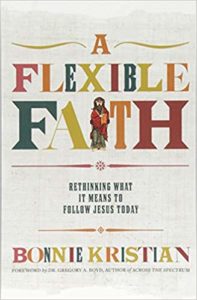 A Flexible Faith: Rethinking What It Means to Follow Jesus Today Bonnie Kristian (FaithWords) $14.99 This has been a book that I’ve talked about when we’ve been out at events but it is tricky to explain. It is charming, wonderfully written, upbeat and fun and yet I’d suggest it is deadly serious. It is about the stream of Christian orthodoxy which is “wide and deep but most Christians only swim in their own little pool.” There is more than one viable option to unbelief and to understand this is absolutely critical. It is important as we learn to get along with the body of Christ and it is important as we invite seekers and the disillusioned to sustainable faith when they’ve left the one sort of faith expression they thought was normative.
A Flexible Faith: Rethinking What It Means to Follow Jesus Today Bonnie Kristian (FaithWords) $14.99 This has been a book that I’ve talked about when we’ve been out at events but it is tricky to explain. It is charming, wonderfully written, upbeat and fun and yet I’d suggest it is deadly serious. It is about the stream of Christian orthodoxy which is “wide and deep but most Christians only swim in their own little pool.” There is more than one viable option to unbelief and to understand this is absolutely critical. It is important as we learn to get along with the body of Christ and it is important as we invite seekers and the disillusioned to sustainable faith when they’ve left the one sort of faith expression they thought was normative.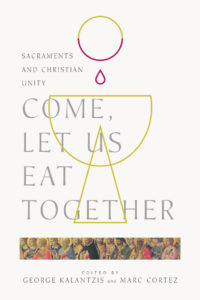 Come Let Us Eat Together: Sacraments and Christian Unity edited by George Kalantzis and Marc Cortez (IVP Academic) $26.00 This is one of the books I was most happy to see this year and sad that I haven’t found time to study it much. It is one of the annual books IVP Academic releases — thanks be to God for their publishing savvy and integrity! — that comes from an annual theology conference at Wheaton College. This book nicely offers the papers and panels and keynotes and sermons from the previous years event on unity within the Body of Christ, especially around our differing view of sacraments. (By the way: last year’s Wheaton conference was on Marilyn Robinson, so the forthcoming volume that IVP will release will be among the most eagerly anticipated books of 2019!)
Come Let Us Eat Together: Sacraments and Christian Unity edited by George Kalantzis and Marc Cortez (IVP Academic) $26.00 This is one of the books I was most happy to see this year and sad that I haven’t found time to study it much. It is one of the annual books IVP Academic releases — thanks be to God for their publishing savvy and integrity! — that comes from an annual theology conference at Wheaton College. This book nicely offers the papers and panels and keynotes and sermons from the previous years event on unity within the Body of Christ, especially around our differing view of sacraments. (By the way: last year’s Wheaton conference was on Marilyn Robinson, so the forthcoming volume that IVP will release will be among the most eagerly anticipated books of 2019!)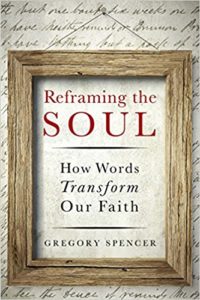 Reframing the Soul: How Words Transform Our Faith Gregory Spencer (Leafwood) $15.99 This is one of the great, notable books of 2018 and because it is on a smaller publishing house my fear is that it may not be widely known. I did a long review of it last summer at BookNotes and explained it my admiration for the author and detailed the nature of the book.
Reframing the Soul: How Words Transform Our Faith Gregory Spencer (Leafwood) $15.99 This is one of the great, notable books of 2018 and because it is on a smaller publishing house my fear is that it may not be widely known. I did a long review of it last summer at BookNotes and explained it my admiration for the author and detailed the nature of the book.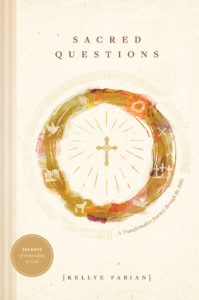 Sacred Questions: 365 Days of Responding to God Kellye Fabian (NavPress) $22.99 Every year there are very nice devotionals and some years there are extraordinary ones released. Certainly 2018 was a banner year, with a small one from the late Eugene Peterson on key Old Testament texts (Every Step an Arrival: A 90-Day Devotional for Exploring God’s Word; Waterbrook Press; $14.99) and, of course, God’s Wisdom for Navigating Life: A Year of Daily Devotions in the Book of Proverbs by Tim and Kathy Keller (Viking; $20.00) which many folks used all year long, just like they used their wonderful book devotional on Psalms the year before.
Sacred Questions: 365 Days of Responding to God Kellye Fabian (NavPress) $22.99 Every year there are very nice devotionals and some years there are extraordinary ones released. Certainly 2018 was a banner year, with a small one from the late Eugene Peterson on key Old Testament texts (Every Step an Arrival: A 90-Day Devotional for Exploring God’s Word; Waterbrook Press; $14.99) and, of course, God’s Wisdom for Navigating Life: A Year of Daily Devotions in the Book of Proverbs by Tim and Kathy Keller (Viking; $20.00) which many folks used all year long, just like they used their wonderful book devotional on Psalms the year before.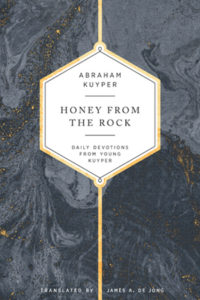 Honey From the Rock: Daily Devotions from Young Kuyper Abraham Kuyper (Lexham Press) $39.99 I very much want to honor this remarkable new release — sweet devotional meditations from the brilliant and legendary Dutch theologian cum social reformer cum statesman that, as far as I know, have never before been translated into English. Like the other big, hefty, well-crafted and helpfully annotated volumes coming out in the Kuyper Translation Project, it should be considered a publishing event to have this content released to the English-speaking world. And what a treasure this is, revealing again a side of himself that may not be as obvious in his theological work or his cultural analysis. (The Kuyper Translation Project, capably overseen by Melvin Flikkema & Jordan Ballor, has released oversized hardbacks of Kuyper’s work on public theology, common grace, politics, Islam, and has volumes coming out on topics such as education, economics, and justice.) Still, Kuyper religiously wrote weekly meditations, even in his most harried days as Prime Minister. He continued this practice up until his death in 1920. These newly released reflections, freshly translated by James De Jong, arose from the 1870s or so. (They were originally published and beloved a century ago in two volumes in Dutch.)
Honey From the Rock: Daily Devotions from Young Kuyper Abraham Kuyper (Lexham Press) $39.99 I very much want to honor this remarkable new release — sweet devotional meditations from the brilliant and legendary Dutch theologian cum social reformer cum statesman that, as far as I know, have never before been translated into English. Like the other big, hefty, well-crafted and helpfully annotated volumes coming out in the Kuyper Translation Project, it should be considered a publishing event to have this content released to the English-speaking world. And what a treasure this is, revealing again a side of himself that may not be as obvious in his theological work or his cultural analysis. (The Kuyper Translation Project, capably overseen by Melvin Flikkema & Jordan Ballor, has released oversized hardbacks of Kuyper’s work on public theology, common grace, politics, Islam, and has volumes coming out on topics such as education, economics, and justice.) Still, Kuyper religiously wrote weekly meditations, even in his most harried days as Prime Minister. He continued this practice up until his death in 1920. These newly released reflections, freshly translated by James De Jong, arose from the 1870s or so. (They were originally published and beloved a century ago in two volumes in Dutch.)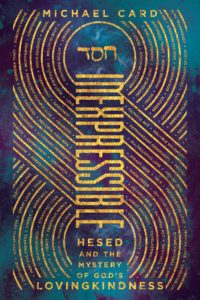 Inexpressible: Hesed and the Mystery of God’s Lovingkindness Michael Card (IVP) $16.00 . Mike is a good, good guy, a thoughtful poet, and good writer, a fabulous singer-songwriter, recording artist, and serious scholar of the Scriptures. This book came out the last weeks of December and we wondered if anyone would notice it amidst the best-sellers and holiday glitz. A number of our local friends picked it up and more than one person raved about it within days! It is nice study of God’s identity, beyond what we can imagine, let alone express in human words. But, as Card explains, “Scripture uses one particular word to describe the distinctiveness of God’s character: the Hebrew word hesed.”
Inexpressible: Hesed and the Mystery of God’s Lovingkindness Michael Card (IVP) $16.00 . Mike is a good, good guy, a thoughtful poet, and good writer, a fabulous singer-songwriter, recording artist, and serious scholar of the Scriptures. This book came out the last weeks of December and we wondered if anyone would notice it amidst the best-sellers and holiday glitz. A number of our local friends picked it up and more than one person raved about it within days! It is nice study of God’s identity, beyond what we can imagine, let alone express in human words. But, as Card explains, “Scripture uses one particular word to describe the distinctiveness of God’s character: the Hebrew word hesed.”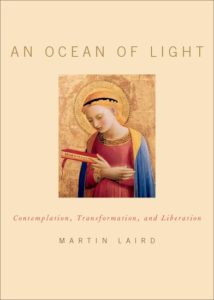 An Ocean of Light: Contemplation, Transformation, and Liberation Martin Laird (Oxford University Press) $18.95 I have not read this yet but many people I deeply trust have commended Laird’s first two, Into the Silent Land and A Sunlit Absence. These mixed metaphors and allusive titles should be a clue that these rich and deep. The handsome covers makes you want to hold these small hardbacks and take in their beauty. Blurbs on this much anticipated work are by Sarah Caokley, Carol Zaleski, and the former Archbishop of Canterbury, Rowan Williams (who commends it for resisting “verbiage, mystification and sentimentality”) and who says it is “both intensely challenging and enriching.”
An Ocean of Light: Contemplation, Transformation, and Liberation Martin Laird (Oxford University Press) $18.95 I have not read this yet but many people I deeply trust have commended Laird’s first two, Into the Silent Land and A Sunlit Absence. These mixed metaphors and allusive titles should be a clue that these rich and deep. The handsome covers makes you want to hold these small hardbacks and take in their beauty. Blurbs on this much anticipated work are by Sarah Caokley, Carol Zaleski, and the former Archbishop of Canterbury, Rowan Williams (who commends it for resisting “verbiage, mystification and sentimentality”) and who says it is “both intensely challenging and enriching.”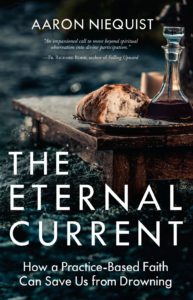 The Eternal Current: How a Practice-Based Faith Can Save Us From Drowning Aaron Niequist (Waterbrook) $19.99 Books on contemplative practices and monastic spiritual disciplines and a more centered sort of spirituality keep coming out and our shelves in that category are bulging. There’s a lot of good stuff on various kinds of spiritual practices and many are wonderful. Some are more Christ-centered and Biblically-oriented then others, but many, many help people focus on their interior lives and find God’s presence in the midst of their daily lives. However, every now and then one comes along that seems truly fresh, different, passionate, and which resonates with me. This is one of those.
The Eternal Current: How a Practice-Based Faith Can Save Us From Drowning Aaron Niequist (Waterbrook) $19.99 Books on contemplative practices and monastic spiritual disciplines and a more centered sort of spirituality keep coming out and our shelves in that category are bulging. There’s a lot of good stuff on various kinds of spiritual practices and many are wonderful. Some are more Christ-centered and Biblically-oriented then others, but many, many help people focus on their interior lives and find God’s presence in the midst of their daily lives. However, every now and then one comes along that seems truly fresh, different, passionate, and which resonates with me. This is one of those.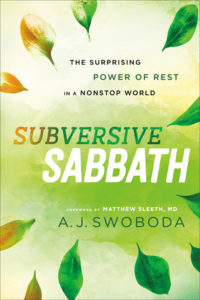 Subversive Sabbath: The Surprising Power of Rest in a Nonstop World A.J. Swoboda (Brazos Press) $19.99 This is another one that I hope you saw our long review at BookNotes. Even as I was describing it back then, I knew it was a contender for one of the very Best Books of 2018. It is comprehensive, interesting, theological, Biblical, and practical. It offers insight about keeping Sabbath, of course, but also offers broader guidance about the necessity of (our our reluctance to) rest. Importantly, it moves to how such nay-saying to busyness — “ceasing” is a word Marva Dawn used in her late ’80s, seminal Keeping the Sabbath Wholly — is, as the title says and he really means, subversive. There are idols and bad habits and dysfunctions in the world and our health and our very lives (not to mention our Kingdom loyalties) depends on resisting them. There is great power in saying no and keeping Sabbath and living within its rhythms can undo the grip of consumerism and workaholism and pride and violent.
Subversive Sabbath: The Surprising Power of Rest in a Nonstop World A.J. Swoboda (Brazos Press) $19.99 This is another one that I hope you saw our long review at BookNotes. Even as I was describing it back then, I knew it was a contender for one of the very Best Books of 2018. It is comprehensive, interesting, theological, Biblical, and practical. It offers insight about keeping Sabbath, of course, but also offers broader guidance about the necessity of (our our reluctance to) rest. Importantly, it moves to how such nay-saying to busyness — “ceasing” is a word Marva Dawn used in her late ’80s, seminal Keeping the Sabbath Wholly — is, as the title says and he really means, subversive. There are idols and bad habits and dysfunctions in the world and our health and our very lives (not to mention our Kingdom loyalties) depends on resisting them. There is great power in saying no and keeping Sabbath and living within its rhythms can undo the grip of consumerism and workaholism and pride and violent.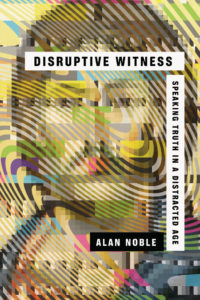 Disruptive Witness: Speaking Truth in a Distracted Age Alan Noble (IVP) $16.00 In just a few weeks we will finally get to meet Alan Noble, a professor of English and editor of the very cool Christ and Pop Culture online journal, who will be speaking at the CCO’s annual Jubilee conference in Pittsburgh. I will applaud him personally for writing one of the best books of 2018 and thank him for creating a book that became one of store’s best sellers. It’s the kind of thoughtful but readable book we are so glad to sell. He has written for the Atlantic, Vox, Buzzfeed, Christianity Today, First Things and The Gospel Coalition. We’ve been facebook friends for years, and he really gets around. I say this not only to assure you he’s a good good guy, but to suggest that even though this is a critique of our hot-wired, fast-paced, digital lives that yield distraction and worse, he is no “Benedict Option” advocate, not one who has escaped the world of media and popular culture. He is trying hard to that noble view of being in-but-not-of as Jesus said.
Disruptive Witness: Speaking Truth in a Distracted Age Alan Noble (IVP) $16.00 In just a few weeks we will finally get to meet Alan Noble, a professor of English and editor of the very cool Christ and Pop Culture online journal, who will be speaking at the CCO’s annual Jubilee conference in Pittsburgh. I will applaud him personally for writing one of the best books of 2018 and thank him for creating a book that became one of store’s best sellers. It’s the kind of thoughtful but readable book we are so glad to sell. He has written for the Atlantic, Vox, Buzzfeed, Christianity Today, First Things and The Gospel Coalition. We’ve been facebook friends for years, and he really gets around. I say this not only to assure you he’s a good good guy, but to suggest that even though this is a critique of our hot-wired, fast-paced, digital lives that yield distraction and worse, he is no “Benedict Option” advocate, not one who has escaped the world of media and popular culture. He is trying hard to that noble view of being in-but-not-of as Jesus said.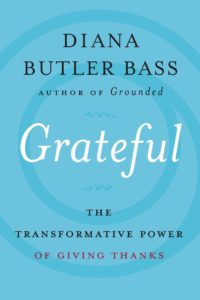 Grateful: The Transformative Power of Giving Thanks Diana Butler Bass (HarperOne) $26.99 I regularly promote books from denominational perspectives and faith traditions and experiences that are not my own. Obviously — what bookseller only promotes the books that fully reflects their own denomination and life? We here at Hearts & Minds, are, in fact, deeply grateful for the opportunity to read widely, taking in books and insights and strengths from others with whom we may disagree. I don’t know why I write this, now, leading in to our celebration of Diana’s good book because there is very little I disagree with here. It’s just that she is situated as a nationally-known critic of establishment religion, hard on conservative denominations, and always prophetic even in challenging her own progressive Episcopalian faith communities. She pushes churches to embrace new ways of thinking about faith that are sensible to the growing “spiritual but not religious” crowd and insists that an inclusive, generous faith is not only most reflective of the God who is revealed in Jesus of Nazareth but also most effective in resonating with the post-Christian milieu of our days. I don’t always see it like that, but I read anything she rights and am grateful for her work, her words, her friendship.
Grateful: The Transformative Power of Giving Thanks Diana Butler Bass (HarperOne) $26.99 I regularly promote books from denominational perspectives and faith traditions and experiences that are not my own. Obviously — what bookseller only promotes the books that fully reflects their own denomination and life? We here at Hearts & Minds, are, in fact, deeply grateful for the opportunity to read widely, taking in books and insights and strengths from others with whom we may disagree. I don’t know why I write this, now, leading in to our celebration of Diana’s good book because there is very little I disagree with here. It’s just that she is situated as a nationally-known critic of establishment religion, hard on conservative denominations, and always prophetic even in challenging her own progressive Episcopalian faith communities. She pushes churches to embrace new ways of thinking about faith that are sensible to the growing “spiritual but not religious” crowd and insists that an inclusive, generous faith is not only most reflective of the God who is revealed in Jesus of Nazareth but also most effective in resonating with the post-Christian milieu of our days. I don’t always see it like that, but I read anything she rights and am grateful for her work, her words, her friendship.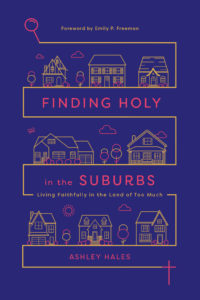 Finding Holy in the Suburbs: Living Faithfully in the Land of Too Much Ashley Hales IVP) $16.00 Anyone who has heard any of the conversations about James K.A. Smith’s You Are What You Love (a nice one-volume summary of his bigger “cultural liturgy” trilogy) or the wonderful book by Tish Warren (Liturgy of the Ordinary) you will immediately resonate with a book that says, in bold type on the back, “Places Form Our Loves.” That is, the ordinary, daily stuff of our material lives, our comings and goings, form in us habits and consequently values and dispositions, which reinforce a certain kind of living, a lifestyle. For better or worse, we are what we love and our loves, our desires, our imaginations of the good life, the stories we’ve been conscripted into, inform and shape our daily life. And our view of discipleship and service and church and God. All this stuff — our views of faith and life — are what the scholars call pre-theoretical. Our hearts, informed by stories and actual landscapes, shape our minds. We don’t “think” our way to holiness, as I’ve heard Smith say.
Finding Holy in the Suburbs: Living Faithfully in the Land of Too Much Ashley Hales IVP) $16.00 Anyone who has heard any of the conversations about James K.A. Smith’s You Are What You Love (a nice one-volume summary of his bigger “cultural liturgy” trilogy) or the wonderful book by Tish Warren (Liturgy of the Ordinary) you will immediately resonate with a book that says, in bold type on the back, “Places Form Our Loves.” That is, the ordinary, daily stuff of our material lives, our comings and goings, form in us habits and consequently values and dispositions, which reinforce a certain kind of living, a lifestyle. For better or worse, we are what we love and our loves, our desires, our imaginations of the good life, the stories we’ve been conscripted into, inform and shape our daily life. And our view of discipleship and service and church and God. All this stuff — our views of faith and life — are what the scholars call pre-theoretical. Our hearts, informed by stories and actual landscapes, shape our minds. We don’t “think” our way to holiness, as I’ve heard Smith say.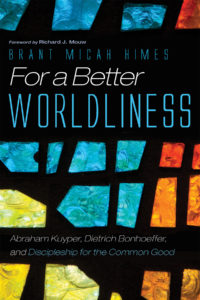 For a Better World: Abraham Kuyper, Dietrich Bonhoeffer, and Discipleship for the Common Good Brant Micah Himes (Pickwick Publications) $28.00 I just grinned when I saw this, got so excited, because many folks know Bonhoeffer but fewer know the Dutch theologian, journalist, politician, educator who lead a revival in late 1800s Holland under the banner of the Lordship of Christ over all of life and creating a pluralistic culture where all worldviews are treated fairly. His piety and justice and structural (“archetectonic” some say) drove this giant of a man, and yet few know him. We can be glad for Brant Himes (a Humanities prof at Azusa Pacific and a managing editor for the theological journal Resonance) for pulling of this judicious study. Ken Wytsma (of the Justice Conferences) says For a Better Worldliness “is one of the most intriguing books I’ve run across in a long time.”
For a Better World: Abraham Kuyper, Dietrich Bonhoeffer, and Discipleship for the Common Good Brant Micah Himes (Pickwick Publications) $28.00 I just grinned when I saw this, got so excited, because many folks know Bonhoeffer but fewer know the Dutch theologian, journalist, politician, educator who lead a revival in late 1800s Holland under the banner of the Lordship of Christ over all of life and creating a pluralistic culture where all worldviews are treated fairly. His piety and justice and structural (“archetectonic” some say) drove this giant of a man, and yet few know him. We can be glad for Brant Himes (a Humanities prof at Azusa Pacific and a managing editor for the theological journal Resonance) for pulling of this judicious study. Ken Wytsma (of the Justice Conferences) says For a Better Worldliness “is one of the most intriguing books I’ve run across in a long time.”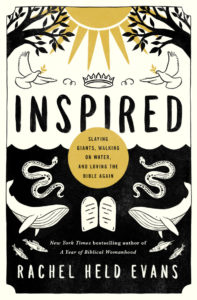 Inspired: Slaying Giants, Walking on Water, And Loving the Bible Again RachelHeld Evans (Thomas Nelson) $16.99 I loved this book for a bunch of reasons and knew that I’d want to recommend it to those who want a good read about a woman coping with the difficulties in the Bible, the violence and genocide and brutality and confusion. She was raised as a super-duper evangelical, was a leader in her youth ministry, a witness in her high school, and happily enjoyed the Bible that was such a big part of her families life. As she grew into different phases of how she used the Bible, things slowly eroded until in her twenties she became disillusioned and frustrated. She has told some of this story elsewhere and she tells it well. For anyone interested in faith development (or re-development) her stories about leaving fundamentalism, about coping with the Bibles teachings about women, about finding a church more suited to her longings, her several books will provide insight and solace. And they are interesting and funny.
Inspired: Slaying Giants, Walking on Water, And Loving the Bible Again RachelHeld Evans (Thomas Nelson) $16.99 I loved this book for a bunch of reasons and knew that I’d want to recommend it to those who want a good read about a woman coping with the difficulties in the Bible, the violence and genocide and brutality and confusion. She was raised as a super-duper evangelical, was a leader in her youth ministry, a witness in her high school, and happily enjoyed the Bible that was such a big part of her families life. As she grew into different phases of how she used the Bible, things slowly eroded until in her twenties she became disillusioned and frustrated. She has told some of this story elsewhere and she tells it well. For anyone interested in faith development (or re-development) her stories about leaving fundamentalism, about coping with the Bibles teachings about women, about finding a church more suited to her longings, her several books will provide insight and solace. And they are interesting and funny.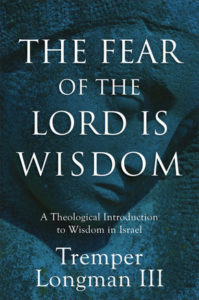 The Fear of the Lord Is Wisdom: A Theological Introduction to Wisdom in Israel Tremper Longman III (BakerAcademic) $32.99 Tremper Longman is one of those scholars who can write popular level guides like How to Read Proverbs and partner with his psychologist pal Dan Allender offering sturdy Biblical content for titles like God Loves Sex. And then he does these books that, for another scholar, might be an admirable life’s work. That Longman has other such major works is remarkable and this one, surely, deserves accolades for one of the best books in the field of Old Testament studies published this past year.
The Fear of the Lord Is Wisdom: A Theological Introduction to Wisdom in Israel Tremper Longman III (BakerAcademic) $32.99 Tremper Longman is one of those scholars who can write popular level guides like How to Read Proverbs and partner with his psychologist pal Dan Allender offering sturdy Biblical content for titles like God Loves Sex. And then he does these books that, for another scholar, might be an admirable life’s work. That Longman has other such major works is remarkable and this one, surely, deserves accolades for one of the best books in the field of Old Testament studies published this past year.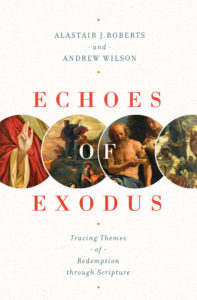 Echoes of Exodus: Tracing Themes of Redemption Through Scripture Alastair Roberts & Andrew Wilson (Crossway) $17.99 I am always on the look-out for books that are rooted in serious scholarship but are not aimed at the academic guild. I am always on the look-out for books that help Bible readers, Sunday school classes, Bible study groups, preachers and teachers see the inter-connection between Old and New Testaments, using what some call the “historical redemptive” method of capturing not just the echoes and allusions between texts but in themes and motifs as the Biblical drama unfolds in a series of promises and fulfillments. This little book, by authors with PhDs from prestigious places, who are hip podcasters and clever writers, offers a serious-minded, warm-hearted exploration of how the exodus story not only stands as a pivotal event in the Old Testament but as a rich source for talking about redemption throughout the whole Bible. As such, it is one of the best books of its kind this year.
Echoes of Exodus: Tracing Themes of Redemption Through Scripture Alastair Roberts & Andrew Wilson (Crossway) $17.99 I am always on the look-out for books that are rooted in serious scholarship but are not aimed at the academic guild. I am always on the look-out for books that help Bible readers, Sunday school classes, Bible study groups, preachers and teachers see the inter-connection between Old and New Testaments, using what some call the “historical redemptive” method of capturing not just the echoes and allusions between texts but in themes and motifs as the Biblical drama unfolds in a series of promises and fulfillments. This little book, by authors with PhDs from prestigious places, who are hip podcasters and clever writers, offers a serious-minded, warm-hearted exploration of how the exodus story not only stands as a pivotal event in the Old Testament but as a rich source for talking about redemption throughout the whole Bible. As such, it is one of the best books of its kind this year.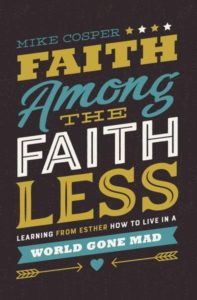 Faith Among the Faithless: Learning from Esther How to Live in a World Gone Mad Mike Cosper (Thomas Nelson) $16.99 Again, we wrote about this previously at BookNotes and raved about it for being so very interesting and applicable, a fascinating study of Christian cultural engagement based on this one provocative Bible story. I want to honor this because I like Cosper’s writing (his Rhythms of Grace is a great book on worship; Stories We Tell is a great study of movies and TV, and Recapturing the Wonder is a brilliant study of disenchantment, secularization, and the joy of curiosity as we wonder in awe at the God-drenched universe.) So when this guy directs us to a new model of faithful cultural engagement, I want to list. And wow, what a thesis: he gently pokes are often-used story of Daniel in Babylon as a model and, for reasons you will learn as you read Faith Among the Faithless, he suggests that Esther is perhaps a more fruitful model of faith in a secular age. Of course we all want to live without compromise in an increasingly hostile society. Some o f us have already given in to that society’s vision and values. Sound familiar? Of course, it’s all there in that book of the Bible that does not mention God’s name, that story of sex, ego, revenge. Agree or not with all of his views or his adaptation of the story for today, but this deserves to be known as an award-winning study for its creative and intentional application. Even in dark times God may be hidden but, Cosper assures, us, God is never absent.
Faith Among the Faithless: Learning from Esther How to Live in a World Gone Mad Mike Cosper (Thomas Nelson) $16.99 Again, we wrote about this previously at BookNotes and raved about it for being so very interesting and applicable, a fascinating study of Christian cultural engagement based on this one provocative Bible story. I want to honor this because I like Cosper’s writing (his Rhythms of Grace is a great book on worship; Stories We Tell is a great study of movies and TV, and Recapturing the Wonder is a brilliant study of disenchantment, secularization, and the joy of curiosity as we wonder in awe at the God-drenched universe.) So when this guy directs us to a new model of faithful cultural engagement, I want to list. And wow, what a thesis: he gently pokes are often-used story of Daniel in Babylon as a model and, for reasons you will learn as you read Faith Among the Faithless, he suggests that Esther is perhaps a more fruitful model of faith in a secular age. Of course we all want to live without compromise in an increasingly hostile society. Some o f us have already given in to that society’s vision and values. Sound familiar? Of course, it’s all there in that book of the Bible that does not mention God’s name, that story of sex, ego, revenge. Agree or not with all of his views or his adaptation of the story for today, but this deserves to be known as an award-winning study for its creative and intentional application. Even in dark times God may be hidden but, Cosper assures, us, God is never absent.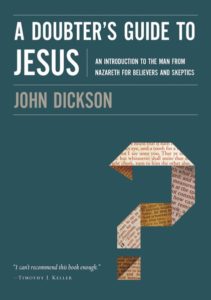 A Doubter’s Guide to Jesus: An Introduction to the Man from Nazareth for Believers and Skeptics John Dickson (Zondervan) $16.99 This compact sized paperback came out early last year and took it’s place beside The Doubter’s Guide to the Bible and the Doubter’s Guide to the Ten Commandments. Something a bit more than the famous Oxford University Press “Very Short Introductions” but still concise enough for one who doesn’t want to wade through hundreds of pages of footnotes, these Doubter’s Guides are exception introductions to the topics they approach. And this one stands out as simply stellar. The quote on the front by Tim Keller gives a clue who exclaims, “I can’t recommend this book enough.” Another good friend and customer of ours, one who buys a lot of books and reads a lot of books, similarly couldn’t stop talking about it and recommending it to those at his church. Which inspired me to not just recommend it but to consider placing it on our Best of 2018 list.
A Doubter’s Guide to Jesus: An Introduction to the Man from Nazareth for Believers and Skeptics John Dickson (Zondervan) $16.99 This compact sized paperback came out early last year and took it’s place beside The Doubter’s Guide to the Bible and the Doubter’s Guide to the Ten Commandments. Something a bit more than the famous Oxford University Press “Very Short Introductions” but still concise enough for one who doesn’t want to wade through hundreds of pages of footnotes, these Doubter’s Guides are exception introductions to the topics they approach. And this one stands out as simply stellar. The quote on the front by Tim Keller gives a clue who exclaims, “I can’t recommend this book enough.” Another good friend and customer of ours, one who buys a lot of books and reads a lot of books, similarly couldn’t stop talking about it and recommending it to those at his church. Which inspired me to not just recommend it but to consider placing it on our Best of 2018 list. Paul: A Biography N.T. Wright (HarperOne) $29.99 Oh my, I hope you recall our big announcement of this when it came out earlier this year. It is, yes, by one of the great New Testament scholars of our time, whose two volume work Paul and the Faithfulness of God weighs in at over 1700 pages! The guy who then wrote another hefty book about all the various scholars on Paul these days called Paul and His Recent Interpreters and then quickly did a clarifying book for those that wanted key questions answered about his views on a handful of key interpretive quandaries in Pauline research — named, naturally, The Paul Debate: Critical Questions for Understanding the Apostle. And this is just his recent work on Paul.
Paul: A Biography N.T. Wright (HarperOne) $29.99 Oh my, I hope you recall our big announcement of this when it came out earlier this year. It is, yes, by one of the great New Testament scholars of our time, whose two volume work Paul and the Faithfulness of God weighs in at over 1700 pages! The guy who then wrote another hefty book about all the various scholars on Paul these days called Paul and His Recent Interpreters and then quickly did a clarifying book for those that wanted key questions answered about his views on a handful of key interpretive quandaries in Pauline research — named, naturally, The Paul Debate: Critical Questions for Understanding the Apostle. And this is just his recent work on Paul. Tenacious Solidary: Biblical Provocations on Race, Religion, Climate, and the Economy Walter Brueggemann; edited and introduced by Davis Hankins (Fortress Press) $29.00 This is the most hefty and substantial book by Walt Brueggemann in quite a few years; his recent output has been rich and prolific, but has included a short Lenten devotional, an even shorter Advent devotional, an succinct (if powerful) adult resource on speaking up, a small book about the conflict in the Holy Land, that brief, potent book on sabbath, and a few shorter collections of academic pieces. Gospel of Hope is a splendid small hardback collection of short excerpts, sayings, quotations, gathering Brueggemann’s wisdom on topics ranging from anxiety and abundance to partisanship and the role of faith in public life, best used to dip into and ponder or when one needs a good quote or short reading.
Tenacious Solidary: Biblical Provocations on Race, Religion, Climate, and the Economy Walter Brueggemann; edited and introduced by Davis Hankins (Fortress Press) $29.00 This is the most hefty and substantial book by Walt Brueggemann in quite a few years; his recent output has been rich and prolific, but has included a short Lenten devotional, an even shorter Advent devotional, an succinct (if powerful) adult resource on speaking up, a small book about the conflict in the Holy Land, that brief, potent book on sabbath, and a few shorter collections of academic pieces. Gospel of Hope is a splendid small hardback collection of short excerpts, sayings, quotations, gathering Brueggemann’s wisdom on topics ranging from anxiety and abundance to partisanship and the role of faith in public life, best used to dip into and ponder or when one needs a good quote or short reading.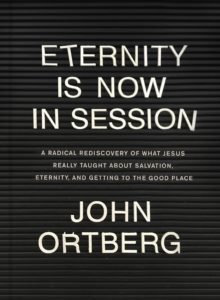 Eternity Is Now in Session: A Radical Rediscovery of What Jesus Really Taught About Salvation, Eternity, and Getting to the Good Place John Ortberg (Tyndale) $17.99 I like John Ortberg; he is well informed, thoughtful, but a masterful communicator. Whether he is sharing what he’s learned from Dallas Willard or summing up complicated arguments from N.T. Wright or, as in The Life You Always Wanted explaining what we mean by spiritual disciplines, he popularizes the best stuff in compelling, entertaining, and helpful ways. This is basic Christian growth material made clear and practical and inspiring. Many loved his last book, another on the interior life inspired by Willard called Soul Keeping: Caring for the Most Important Part of You and the one before that was a fabulous, fabulous introduction to why everybody should study Jesus (Who Is This Man?) He is a vital pastor, and great teacher, and this new one deserves special acclaim. Its a favorite of ours this year.
Eternity Is Now in Session: A Radical Rediscovery of What Jesus Really Taught About Salvation, Eternity, and Getting to the Good Place John Ortberg (Tyndale) $17.99 I like John Ortberg; he is well informed, thoughtful, but a masterful communicator. Whether he is sharing what he’s learned from Dallas Willard or summing up complicated arguments from N.T. Wright or, as in The Life You Always Wanted explaining what we mean by spiritual disciplines, he popularizes the best stuff in compelling, entertaining, and helpful ways. This is basic Christian growth material made clear and practical and inspiring. Many loved his last book, another on the interior life inspired by Willard called Soul Keeping: Caring for the Most Important Part of You and the one before that was a fabulous, fabulous introduction to why everybody should study Jesus (Who Is This Man?) He is a vital pastor, and great teacher, and this new one deserves special acclaim. Its a favorite of ours this year.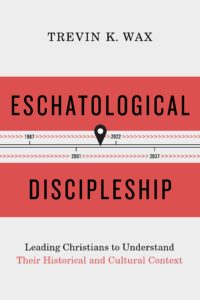 to Understand Their Historical and Cultural Context Trevin K. Wax (B&H Academic) $29.99 I used to play off of the Awards Show schtick and offer specific awards for some books. If I were doing this I’d put this as a contender for, at least, the trophy for the most intriguing theological book title. Oh, there’s some wacky ones out there and theological textbooks can enter the realm of the arcane pretty quickly. But this; it makes sense. There are, you may know, reputable scholars who find apocalyptic themes in most of the Kingdom language of Jesus and insist He is revealing a new order in the middle of real life, an upside down Kingdom that will soon be consummated. When will all things be made new? Well, that’s the eschatological question, isn’t it? And so, without any weird rapture charts or end-times scenarios, Wax here is saying that, at least, we are to live now as if we are in rehearsal for eternity. “People get ready,” the old Curtis Mayfield song sang. As Kevin Vanhoozer puts it, “Wax convincingly sets out the biblical basis for ‘eschatological discipleship’, which means the importance of waking up (and staying awake) to the reality that our citizenship in heaven begins now.
to Understand Their Historical and Cultural Context Trevin K. Wax (B&H Academic) $29.99 I used to play off of the Awards Show schtick and offer specific awards for some books. If I were doing this I’d put this as a contender for, at least, the trophy for the most intriguing theological book title. Oh, there’s some wacky ones out there and theological textbooks can enter the realm of the arcane pretty quickly. But this; it makes sense. There are, you may know, reputable scholars who find apocalyptic themes in most of the Kingdom language of Jesus and insist He is revealing a new order in the middle of real life, an upside down Kingdom that will soon be consummated. When will all things be made new? Well, that’s the eschatological question, isn’t it? And so, without any weird rapture charts or end-times scenarios, Wax here is saying that, at least, we are to live now as if we are in rehearsal for eternity. “People get ready,” the old Curtis Mayfield song sang. As Kevin Vanhoozer puts it, “Wax convincingly sets out the biblical basis for ‘eschatological discipleship’, which means the importance of waking up (and staying awake) to the reality that our citizenship in heaven begins now.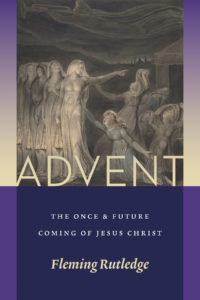 Advent: The Once and Future Coming of Jesus Christ Fleming Rutledge (Eerdmans) $30.00 This book is nothing short of extraordinary and was perhaps our favorite book to sell this past year. And it was one of our best sellers — thank you, Amazon, for running out, and thank you, dear Fleming, for saying such nice things about us on line. It certainly deserved to be a Hearts & Minds bestseller and deserves to be widely read; there is no other book like it. Who, these days, doesn’t at least try to attend to the spiritual disciplines and theological tone of the season of Advent, inviting us, as it does, to wait, to anticipate, to long for the final restoration of creation when Christ comes the second time?
Advent: The Once and Future Coming of Jesus Christ Fleming Rutledge (Eerdmans) $30.00 This book is nothing short of extraordinary and was perhaps our favorite book to sell this past year. And it was one of our best sellers — thank you, Amazon, for running out, and thank you, dear Fleming, for saying such nice things about us on line. It certainly deserved to be a Hearts & Minds bestseller and deserves to be widely read; there is no other book like it. Who, these days, doesn’t at least try to attend to the spiritual disciplines and theological tone of the season of Advent, inviting us, as it does, to wait, to anticipate, to long for the final restoration of creation when Christ comes the second time?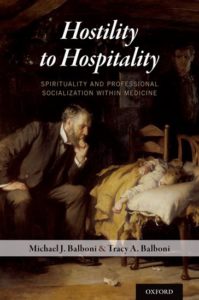 Hostility to Hospitality: Spirituality and Professional Socialization Within Medicine Michael J. Balboni & Tracy A. Balboni (Oxford University Press) $35.95 As you know, we here at Hearts & Minds are passionate about providing books about relating faith and deeply Christian principles and values to various work spheres. If any job done before God and for the sake of Christ’s Kingdom can be a holy calling, if we all need what Steve Garber calls “visions of vocation” then we also need to ask the tough question: what does it mean to think and act faithfully, appropriately, Christianly, consonant with how God made the world and how Christ is redeeming it, in my specific job. There are a lot of books these days about a Christian view of work, about how all followers of Christ have a missional calling to carry their faith into the marketplace, to be artists or scientists or home-makers or teachers for the common good, loving God and neighbor in the very way we practice those careers and calling. Got it? Sure you do.
Hostility to Hospitality: Spirituality and Professional Socialization Within Medicine Michael J. Balboni & Tracy A. Balboni (Oxford University Press) $35.95 As you know, we here at Hearts & Minds are passionate about providing books about relating faith and deeply Christian principles and values to various work spheres. If any job done before God and for the sake of Christ’s Kingdom can be a holy calling, if we all need what Steve Garber calls “visions of vocation” then we also need to ask the tough question: what does it mean to think and act faithfully, appropriately, Christianly, consonant with how God made the world and how Christ is redeeming it, in my specific job. There are a lot of books these days about a Christian view of work, about how all followers of Christ have a missional calling to carry their faith into the marketplace, to be artists or scientists or home-makers or teachers for the common good, loving God and neighbor in the very way we practice those careers and calling. Got it? Sure you do.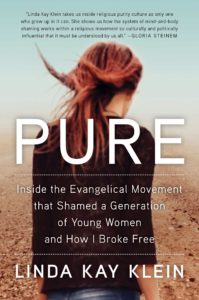 Pure: Inside the Evangelical Movement That Shamed a Generation of Young Women and How I Broke Free Linda Kay Klein (Touchstone) $26.00 A few years ago we had a category in our end of the year awards for books “I loved to hate” which were, obviously, really bad books. Then I’d sometimes give an award for a work I “hated to love.” This would be one of those, a book with which I have grave concerns, strong disagreements, and yet really, really loved. Although “loved” is not quite the right word. It was moving, fascinating, insightful, provocative, entertaining, horrific, important, sad, and, occasionally funny.
Pure: Inside the Evangelical Movement That Shamed a Generation of Young Women and How I Broke Free Linda Kay Klein (Touchstone) $26.00 A few years ago we had a category in our end of the year awards for books “I loved to hate” which were, obviously, really bad books. Then I’d sometimes give an award for a work I “hated to love.” This would be one of those, a book with which I have grave concerns, strong disagreements, and yet really, really loved. Although “loved” is not quite the right word. It was moving, fascinating, insightful, provocative, entertaining, horrific, important, sad, and, occasionally funny.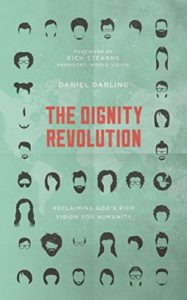 The Dignity Revolution: Reclaiming God’s Rich Vision for Humanity Daniel Darling (The Good Book Company) $16.99 Forty some years ago we were somewhat involved in an organization that tried to bear witness amongst the anti-war and anti-nuclear weapons movement that concern for pre-born humans should also be a part of their agenda. Peaceniks often marched under the banner of the famous verse from Deuteronomy “Choose Life.” Similarly, we’d attend Right to Life events and try to convince our anti-abortion friends that targeting millions of civilians, including children, as our nuclear weapons strategy does, is not very pro-life. I suppose it doesn’t need explained that we were physically removed from at least one anti-war gig and verbally assaulted plenty from the anti-abortion events. Nobody wanted to be very consistently pro-life; most didn’t even want to talk to each other.
The Dignity Revolution: Reclaiming God’s Rich Vision for Humanity Daniel Darling (The Good Book Company) $16.99 Forty some years ago we were somewhat involved in an organization that tried to bear witness amongst the anti-war and anti-nuclear weapons movement that concern for pre-born humans should also be a part of their agenda. Peaceniks often marched under the banner of the famous verse from Deuteronomy “Choose Life.” Similarly, we’d attend Right to Life events and try to convince our anti-abortion friends that targeting millions of civilians, including children, as our nuclear weapons strategy does, is not very pro-life. I suppose it doesn’t need explained that we were physically removed from at least one anti-war gig and verbally assaulted plenty from the anti-abortion events. Nobody wanted to be very consistently pro-life; most didn’t even want to talk to each other.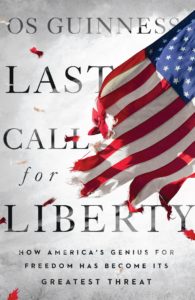 Last Call for Liberty: How America’s Genius for Freedom Has Become Its Greatest Threat Os Guinness (IVP) $27.00 Any time this excellent speaker and writer, social critic, and Christian leader writes, we would do well to pay attention. This is one of Dr. Guinness’s major works, and it isn’t simple or trite. It is — from his point of view as an Englishman living in the DC area — a love letter to America, and a caring chastisement, we might say, to those of us who take our liberties for granted. He is stern, here, about how most Americans (not to mention our civic and religious leaders) simply don’t know what we should about the profundity and genius of the American experiment (not to mention profound Judeo-Christian influences such as notions of covenant) and the gravity and urgency of the threats poised against these revolutionary ideas. He is not (although in some ears could be heard to be) an advocate of the “Christian America” thesis nor is he an advocate of a glib sort of civilc faith that extols civil religion dressed up with a MAGA hat. He is a serious, nonpartisan, deeply Christian observer, alarmed at the drift of our way of life and not optimistic about lessening the erosion of our civility, nor our mutual commitments to uniquely American ideals and principles.
Last Call for Liberty: How America’s Genius for Freedom Has Become Its Greatest Threat Os Guinness (IVP) $27.00 Any time this excellent speaker and writer, social critic, and Christian leader writes, we would do well to pay attention. This is one of Dr. Guinness’s major works, and it isn’t simple or trite. It is — from his point of view as an Englishman living in the DC area — a love letter to America, and a caring chastisement, we might say, to those of us who take our liberties for granted. He is stern, here, about how most Americans (not to mention our civic and religious leaders) simply don’t know what we should about the profundity and genius of the American experiment (not to mention profound Judeo-Christian influences such as notions of covenant) and the gravity and urgency of the threats poised against these revolutionary ideas. He is not (although in some ears could be heard to be) an advocate of the “Christian America” thesis nor is he an advocate of a glib sort of civilc faith that extols civil religion dressed up with a MAGA hat. He is a serious, nonpartisan, deeply Christian observer, alarmed at the drift of our way of life and not optimistic about lessening the erosion of our civility, nor our mutual commitments to uniquely American ideals and principles.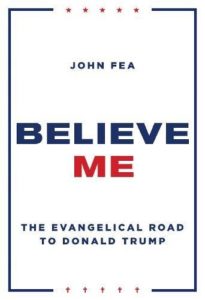 Believe Me: The Evangelical Road to Donald Trump John Fea (Eerdmans) $24.99 I have written at great length — in our local newspaper, in BookNotes, and on my social media space — that the unqualified conservative Christian support for President Trump is inexplicable. For a dozen reasons that are nearly incontrovertible, it is clear that the President is a bad man and a bad leader. By no reasonable metrics can we be glad for his temperament, his antics, or his odd-ball style of governance. Good people of good faith can disagree with the “lesser of two evils” sorts of complicated choices we have when voting and can line up on different sides of the isles as we watch the sausage getting made. But all serious Christians must, at least, have some sort of Biblically-informed, Christianly conceived, spiritual-driven, public theology. We must have “the mind of Christ” and allow the Scriptural worldview to illumine our views of contemporary issues and the nature of law and politics and citizenship. Evangelicals, who love Jesus, insist on conversion and holiness, and Christ’s Kingship over all of life and regard the Bible with a for-all-of-life authority. We dare not say, as Jerry Falwell Jr. recently did, “I don’t look to Jesus for my politics.” Evangelicals worthy of the name may disagree about many implications that flow from a Christian political vision, but we dare not say that.
Believe Me: The Evangelical Road to Donald Trump John Fea (Eerdmans) $24.99 I have written at great length — in our local newspaper, in BookNotes, and on my social media space — that the unqualified conservative Christian support for President Trump is inexplicable. For a dozen reasons that are nearly incontrovertible, it is clear that the President is a bad man and a bad leader. By no reasonable metrics can we be glad for his temperament, his antics, or his odd-ball style of governance. Good people of good faith can disagree with the “lesser of two evils” sorts of complicated choices we have when voting and can line up on different sides of the isles as we watch the sausage getting made. But all serious Christians must, at least, have some sort of Biblically-informed, Christianly conceived, spiritual-driven, public theology. We must have “the mind of Christ” and allow the Scriptural worldview to illumine our views of contemporary issues and the nature of law and politics and citizenship. Evangelicals, who love Jesus, insist on conversion and holiness, and Christ’s Kingship over all of life and regard the Bible with a for-all-of-life authority. We dare not say, as Jerry Falwell Jr. recently did, “I don’t look to Jesus for my politics.” Evangelicals worthy of the name may disagree about many implications that flow from a Christian political vision, but we dare not say that.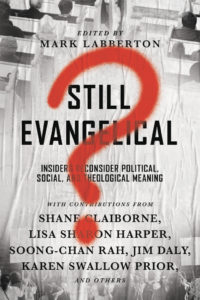 Still Evangelical?: Insiders Reconsider Political, Social, and Theological Meaning edited by Mark Labberton (IVP) $17.00 . I have written at length about this book when it first came out and I hope that our BookNotes review then garnered it some attention. It’s a wise and interesting and helpful book for any evangelical, and for anyone that has even a bit of interest in what that part of the church pew, many who sit on the right side of the church, are like these days. What this really does is ask the tough question if this phrase — evangelical — is worth saving, clarifying, using, or not. Again, we think this is a very important question and the authors of this book, themselves insiders to the movement, have different answers to the existential question.
Still Evangelical?: Insiders Reconsider Political, Social, and Theological Meaning edited by Mark Labberton (IVP) $17.00 . I have written at length about this book when it first came out and I hope that our BookNotes review then garnered it some attention. It’s a wise and interesting and helpful book for any evangelical, and for anyone that has even a bit of interest in what that part of the church pew, many who sit on the right side of the church, are like these days. What this really does is ask the tough question if this phrase — evangelical — is worth saving, clarifying, using, or not. Again, we think this is a very important question and the authors of this book, themselves insiders to the movement, have different answers to the existential question.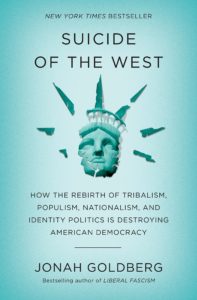 Suicide of the West: How the Rebirth of Tribalism, Populism, Nationalism, and Identity Politics Is Destroying American Democracy Jonah Goldberg (Crown Forum) $28.00 Well — it is getting so late I just don’t have the capacity to carefully review this now although, believe me, I’ve tried. In fact, even if I was bright and chipper and at my best I am not sure I can tell you why I want to commend this book. It is big and heavy and serious and at times tedious, with a lot of fascinating footnotes, too — except when it’s not; Goldberg is known for his nearly gonzo humor and although he restrains himself in this heady work, it does have it’s clever moments. He is witty and smart and maybe only somewhat right, but this is a great book that took years to write. It is certainly a notable book of the year and I wish others would consider it carefully.
Suicide of the West: How the Rebirth of Tribalism, Populism, Nationalism, and Identity Politics Is Destroying American Democracy Jonah Goldberg (Crown Forum) $28.00 Well — it is getting so late I just don’t have the capacity to carefully review this now although, believe me, I’ve tried. In fact, even if I was bright and chipper and at my best I am not sure I can tell you why I want to commend this book. It is big and heavy and serious and at times tedious, with a lot of fascinating footnotes, too — except when it’s not; Goldberg is known for his nearly gonzo humor and although he restrains himself in this heady work, it does have it’s clever moments. He is witty and smart and maybe only somewhat right, but this is a great book that took years to write. It is certainly a notable book of the year and I wish others would consider it carefully.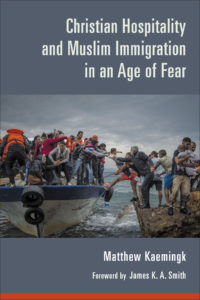 Christian Hospitality and Muslim Immigration in an Age of Fear Matthew Kaemingk (Eerdmans) $28.00 I did a major review of this before it got to be a much-talked about study, and I am proud to have been an early cheerleader. This is without a doubt one of the more important and substantive books of 2018 and it is offers a very nuanced, even surprising analysis of the modern West’s immigration and refugee crisis and Muslim-Christian relations.
Christian Hospitality and Muslim Immigration in an Age of Fear Matthew Kaemingk (Eerdmans) $28.00 I did a major review of this before it got to be a much-talked about study, and I am proud to have been an early cheerleader. This is without a doubt one of the more important and substantive books of 2018 and it is offers a very nuanced, even surprising analysis of the modern West’s immigration and refugee crisis and Muslim-Christian relations.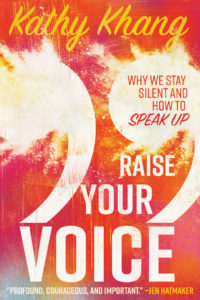 Raise Your Voice: Why We Stay Silent and How to Speak Up Kathy Khang (IVP) $16.00 I have mentioned this book a couple of times — at BookNotes and that special column I did in the Public Justice Report — and have been glad to get to recommend it. It is, as the titles says, a book about speaking up. It evaluates various motivations for civic involvement, tells how to be involved, and offers sage advise about civility and more. Nikki Toyama-Szeto, executive director of Evangelicals for Social Action, who knows a thing or two about all this, says “Raise Your Voice is honest, funny, and utterly practical.” Rachel Held Evans talks about its “integrity and holy force.“
Raise Your Voice: Why We Stay Silent and How to Speak Up Kathy Khang (IVP) $16.00 I have mentioned this book a couple of times — at BookNotes and that special column I did in the Public Justice Report — and have been glad to get to recommend it. It is, as the titles says, a book about speaking up. It evaluates various motivations for civic involvement, tells how to be involved, and offers sage advise about civility and more. Nikki Toyama-Szeto, executive director of Evangelicals for Social Action, who knows a thing or two about all this, says “Raise Your Voice is honest, funny, and utterly practical.” Rachel Held Evans talks about its “integrity and holy force.“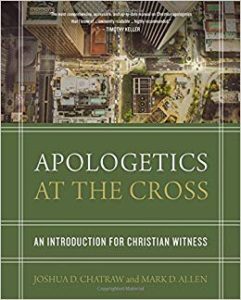 Apologetics at the Cross: An Introduction for Christian Witness Joshua D. Chatraw and Mark D. Allen (Zondervan) $34.99 We have bunches and bunches of books on evangelism, or storytelling the gospel, or apologetics both evidentialist and presuppositional and all manner of reasonable and postmodern styles. It is a fascinating field and I’m sad that more don’t deeply delve into resources to help them bear witness and help others along in the journey of coming to deeper and more confident faith. There is no doubt, though, that the art of apologetics, of being prepared to explain the hope we have in Christ, needs to be re-learned from generation to generation. In these times — influenced by social media and what Taylor called “The Secular Age” and the cynicism many have about religion — we simply have to be more savvy if we want to connect well with others, including the unchurched and the de-churched and the young who are making up their minds about faith in this hyper-modern, pluralizing social context. Apologetics at the Cross is a masterful, comprehensive guide that takes our cultural context seriously. It is presented like a lively textbook and is very highly recommended for personal use and for classes. (There is a remarkable set of video lectures on DVD by the author as well.)
Apologetics at the Cross: An Introduction for Christian Witness Joshua D. Chatraw and Mark D. Allen (Zondervan) $34.99 We have bunches and bunches of books on evangelism, or storytelling the gospel, or apologetics both evidentialist and presuppositional and all manner of reasonable and postmodern styles. It is a fascinating field and I’m sad that more don’t deeply delve into resources to help them bear witness and help others along in the journey of coming to deeper and more confident faith. There is no doubt, though, that the art of apologetics, of being prepared to explain the hope we have in Christ, needs to be re-learned from generation to generation. In these times — influenced by social media and what Taylor called “The Secular Age” and the cynicism many have about religion — we simply have to be more savvy if we want to connect well with others, including the unchurched and the de-churched and the young who are making up their minds about faith in this hyper-modern, pluralizing social context. Apologetics at the Cross is a masterful, comprehensive guide that takes our cultural context seriously. It is presented like a lively textbook and is very highly recommended for personal use and for classes. (There is a remarkable set of video lectures on DVD by the author as well.)